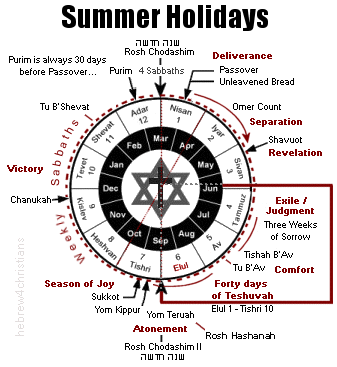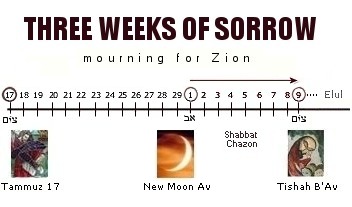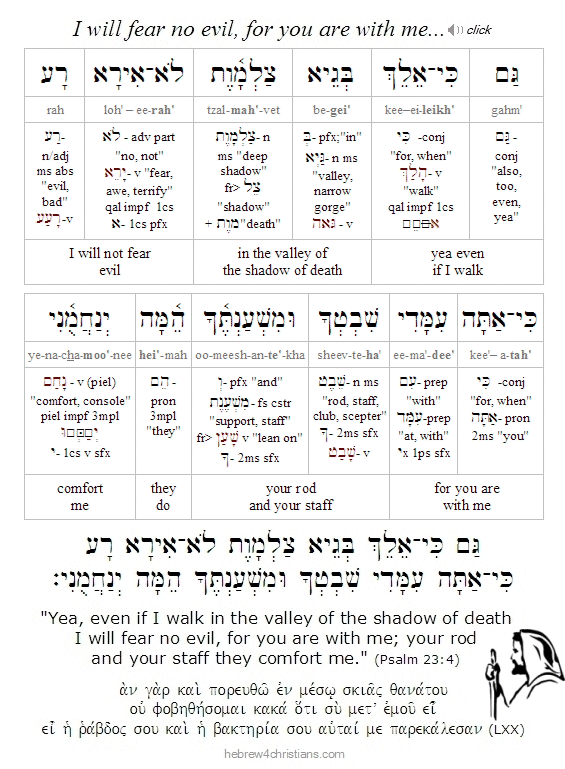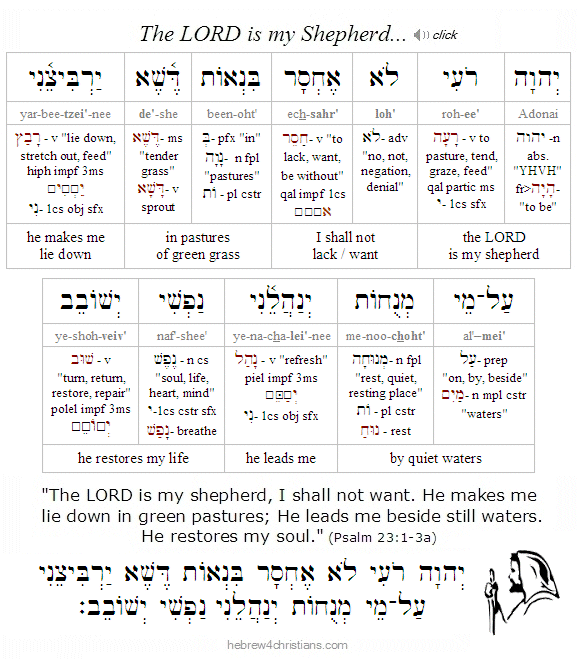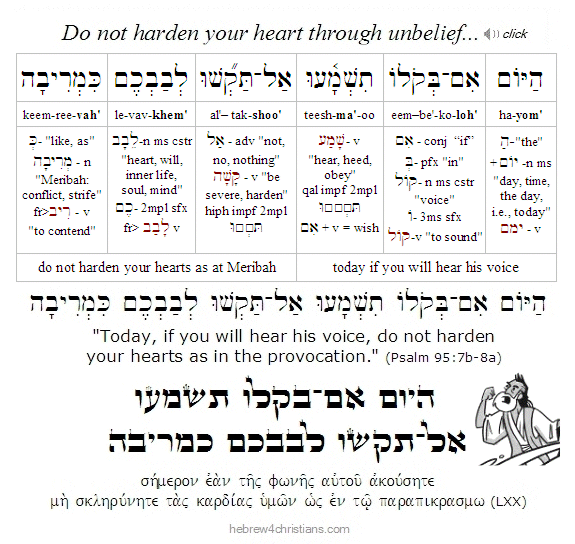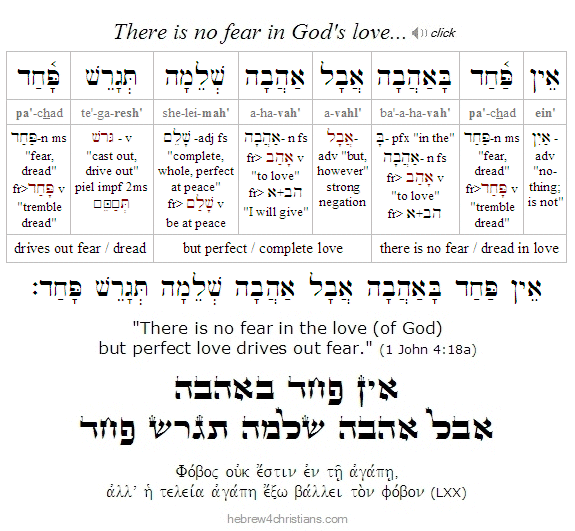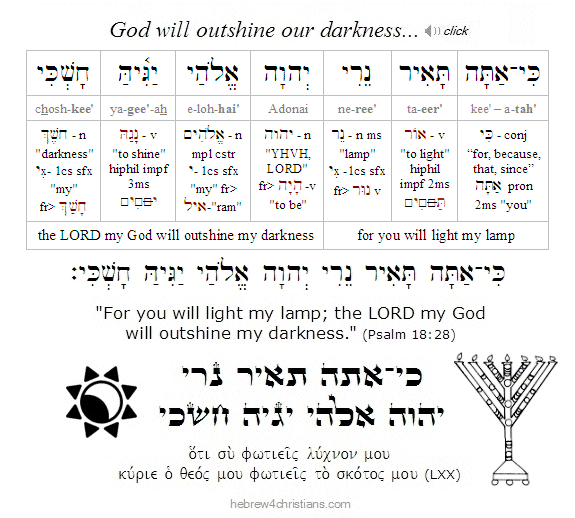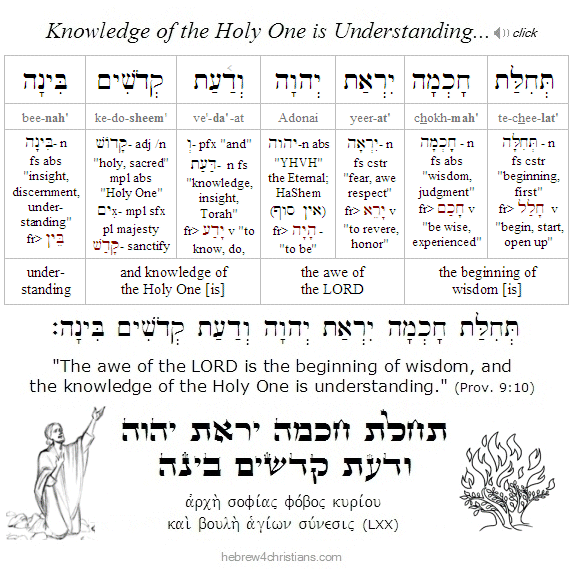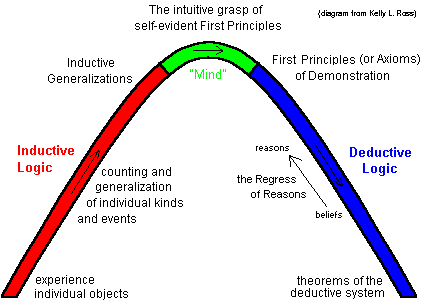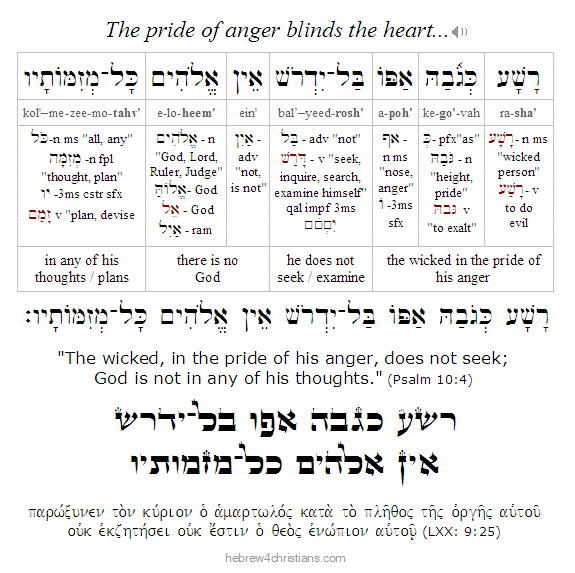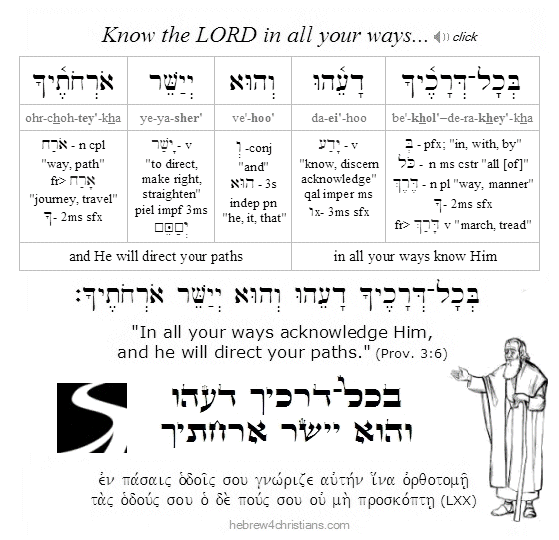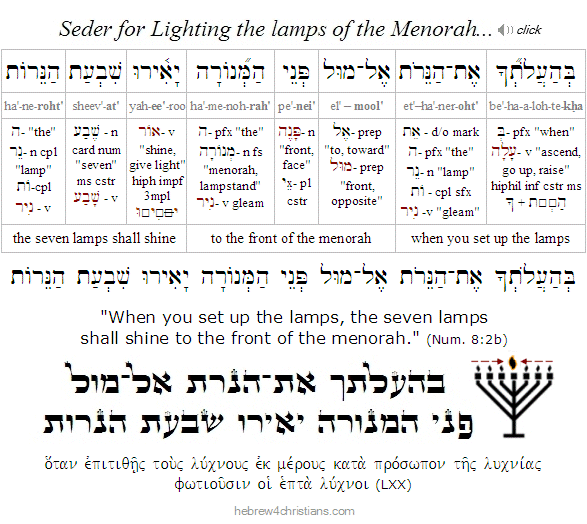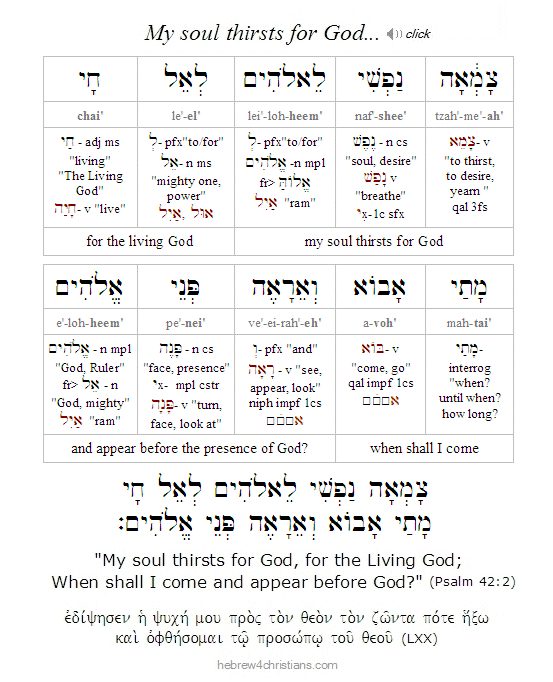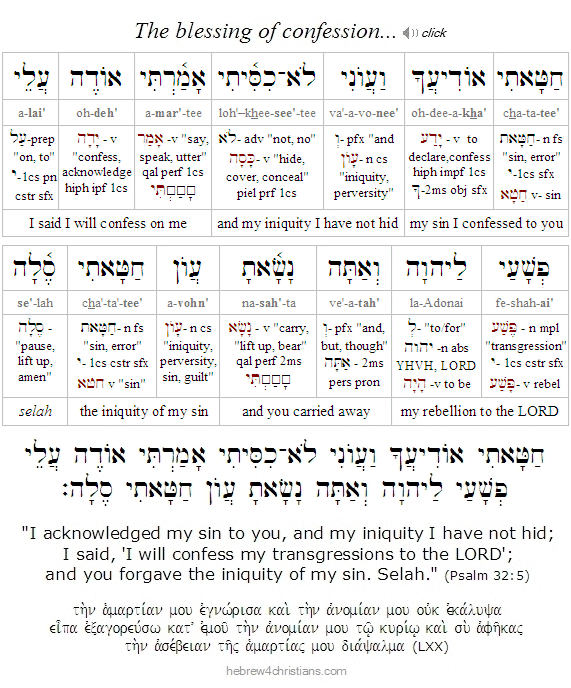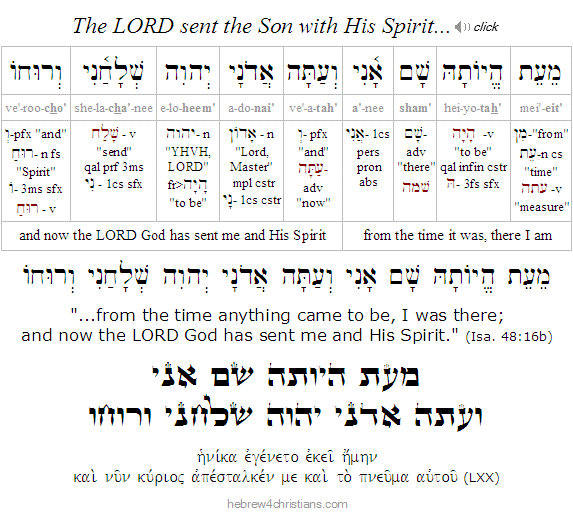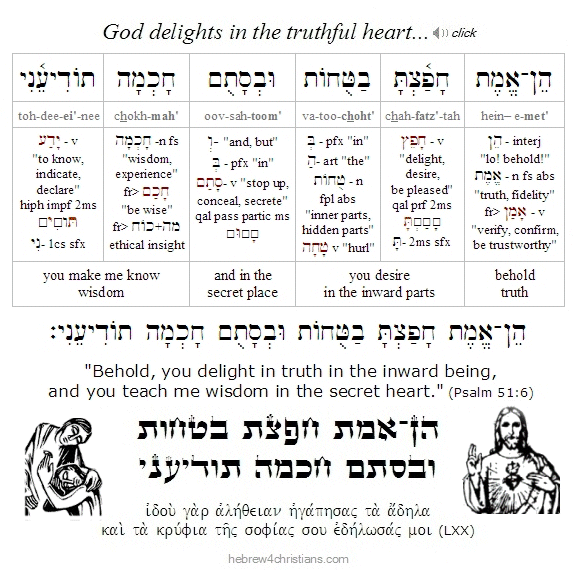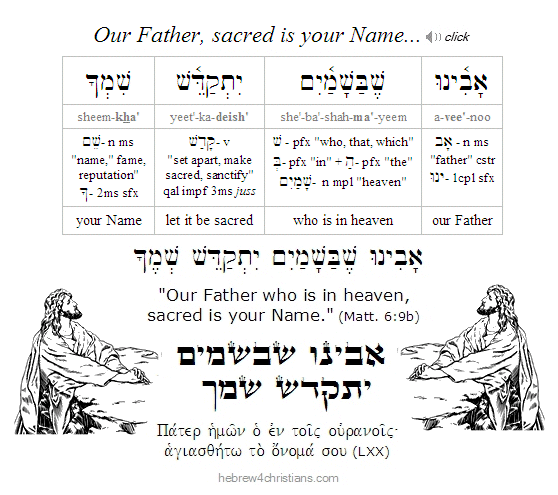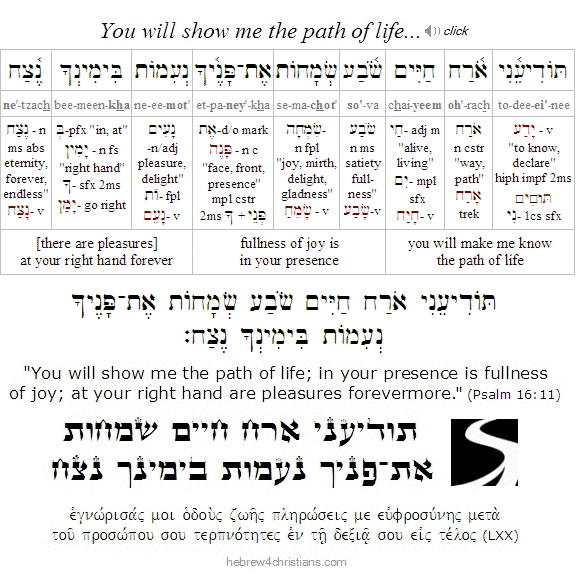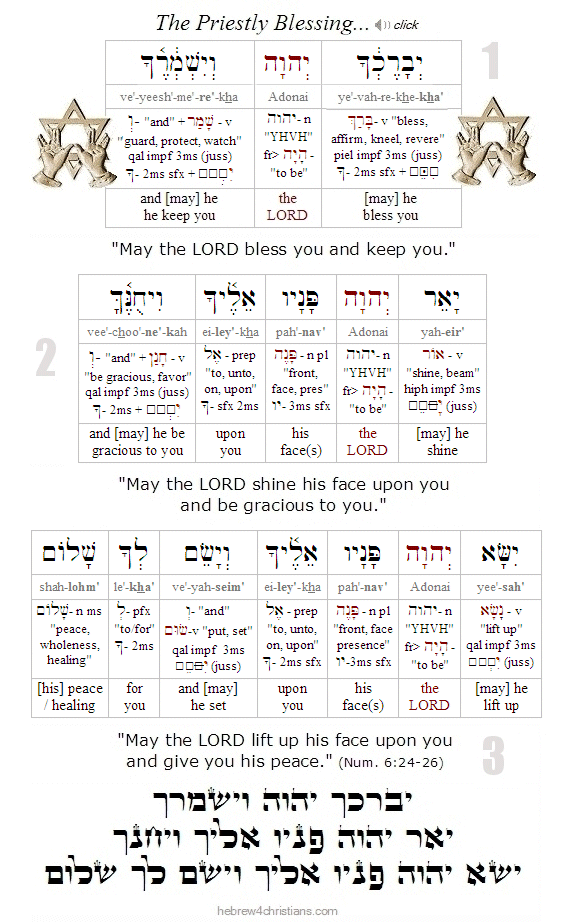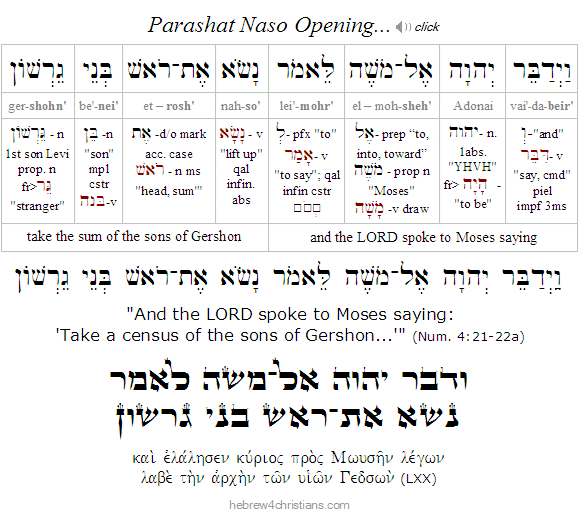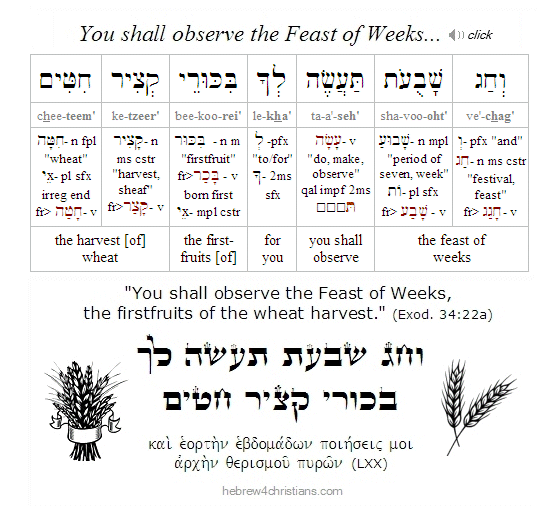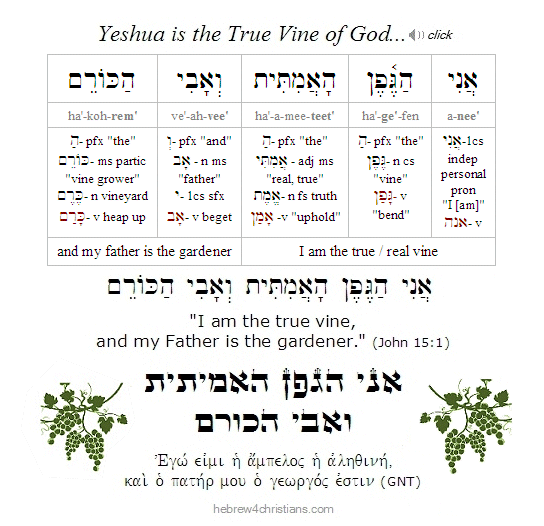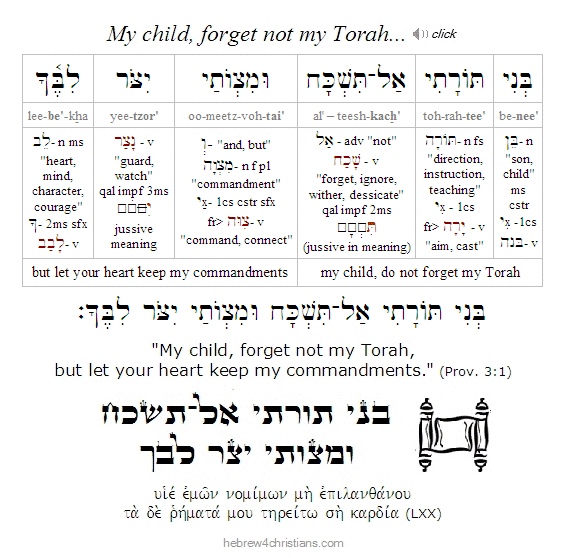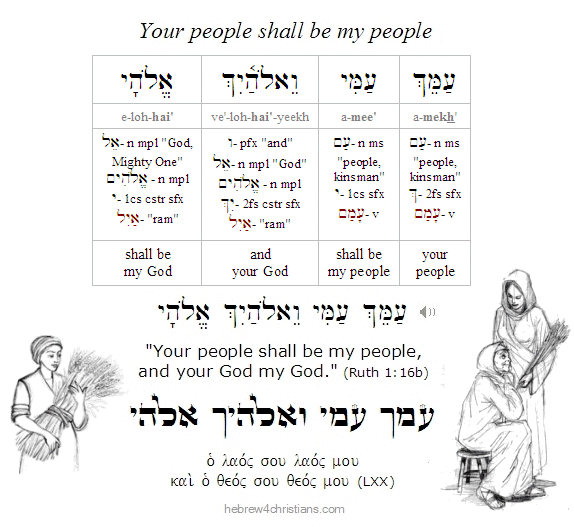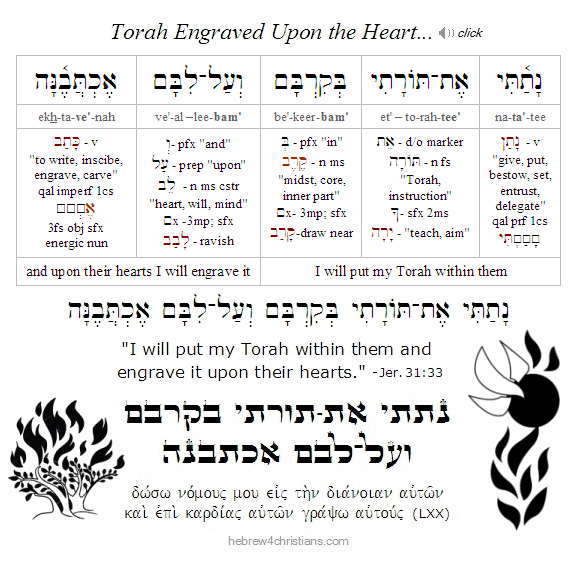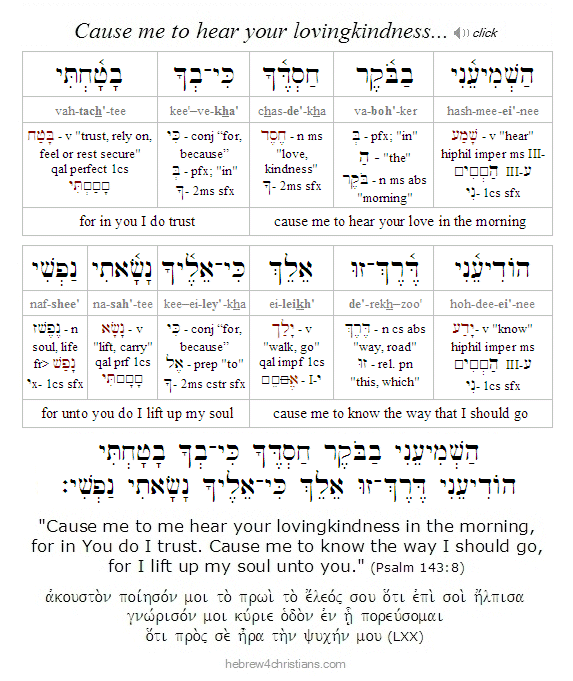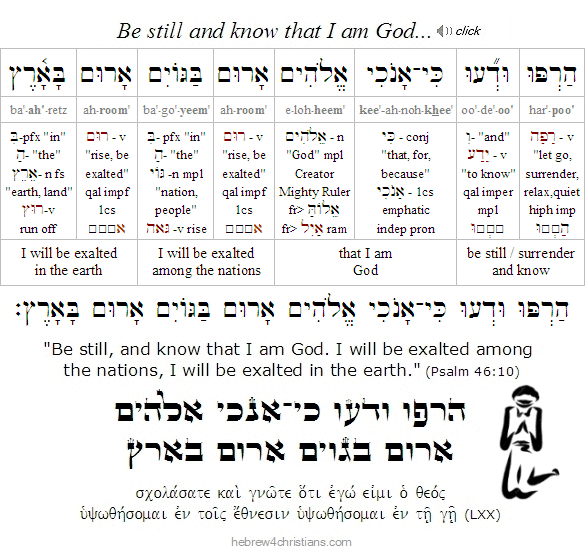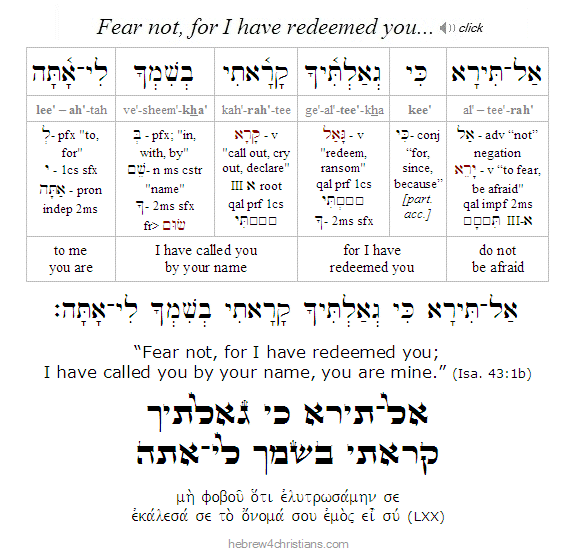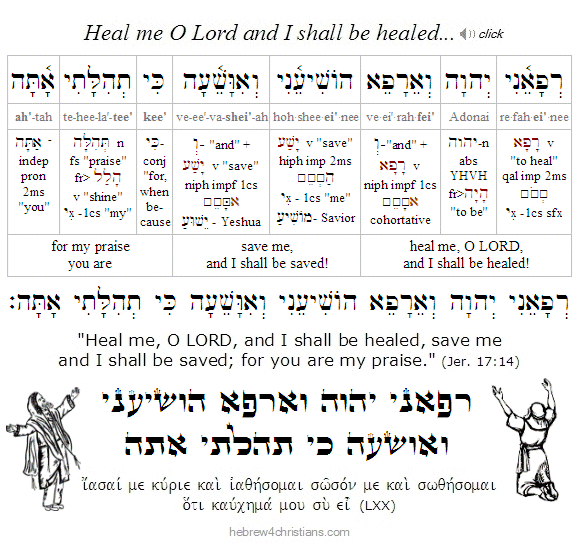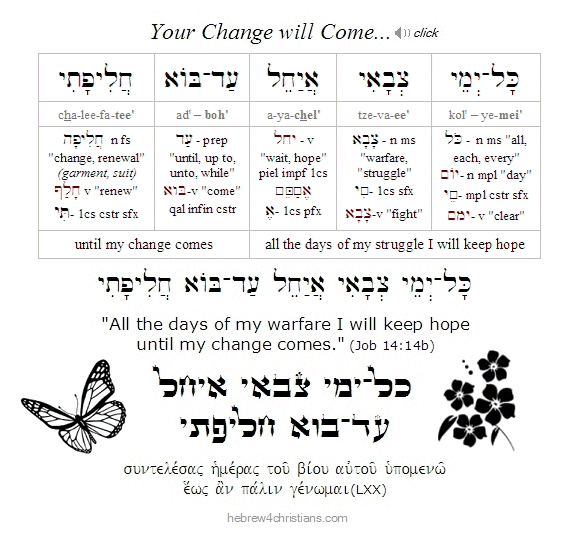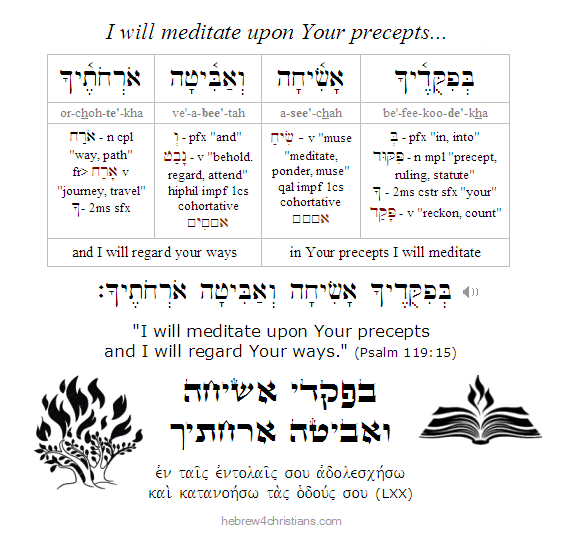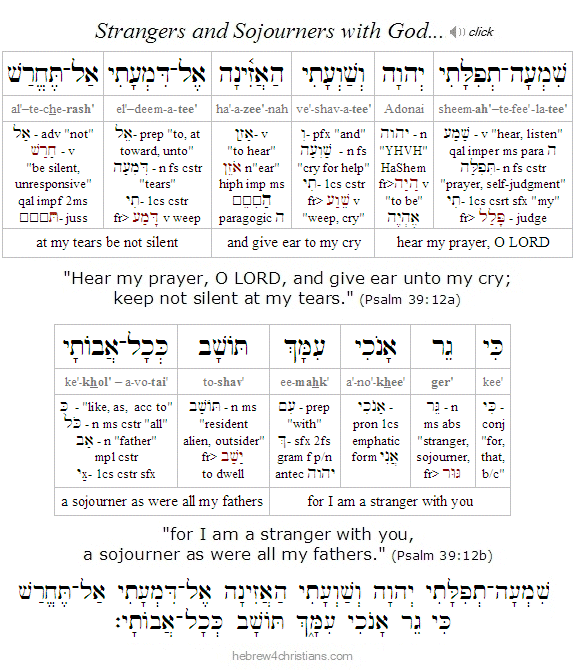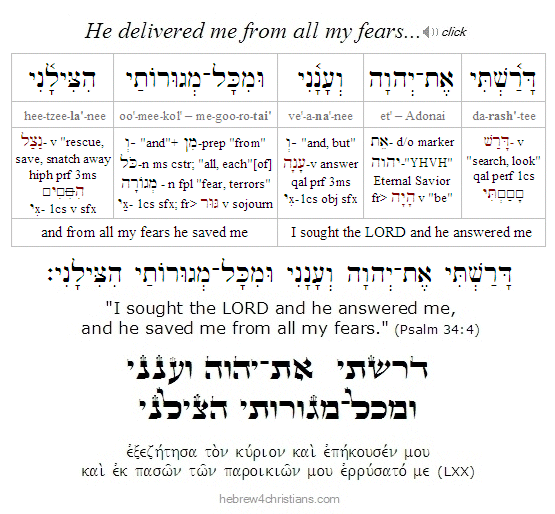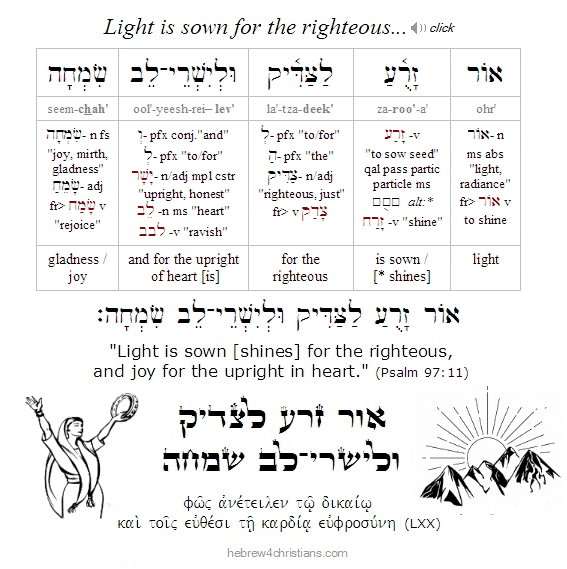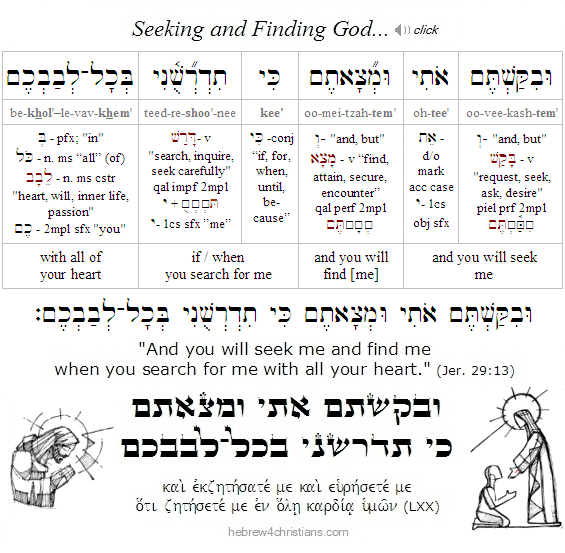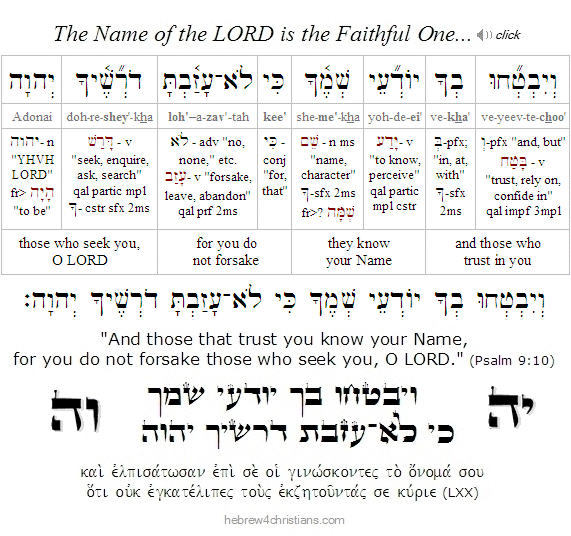|
Prayer Request (for site updates, see below)
I was laid off from my full-time job several years ago when -- after a lot of prayer, soul searching and discussion with my wife -- we decided to operate the Hebrew for Christians ministry entirely by faith in God's provision through the love and kindness of His people. I am not paid for doing this work, and therefore I ask you to consider supporting us. If you can help, please offer a donation or purchase some of the Hebrew study materials offered here. Encouraging other web sites to link here also helps us become more visible on the web. Above all, agree with us for the Lord's will to be done in our lives. Todah, chaverim.
    
Note: My wife and I have have three young children (Josiah, Judah, and Emanuel David ). The LORD has graciously provided for us as Adonai Yireh (יְהוָה יִרְאֶה), "the One who sees [our need]." We are living one day at a time by the grace and mercy of God, and I want to publicly praise Yeshua and acknowledge His faithful love in caring for my family -- despite the trials during this time. The LORD God of Israel is faithful and true! And to those of you who have sent us a word of encouragement or donation during this difficult time, please accept our heartfelt appreciation! Your chesed truly helps sustain us.
יהי שׁם יהוה מברך - "May the Name of the Lord be blessed."
 |
I want to offer a word of thanks for all your kindness and encouragement over the last 20+ years, chaverim... I could not be in ministry apart from the grace and love you have shown to me and my family. Thank you so much and may the great and unsurpassable blessings of the LORD God of Israel be upon you always. -John
Jewish Holiday Calendar
Note: For site updates, please scroll past this entry....
In the summer there occurs a three week period of mourning that begins with the Fast of Tammuz and ends with Tishah B'Av. The last nine days of this three week period (i.e., from Av 1 until Av 9th) are days of increased mourning. However, after this somber time, the romantic holiday of Tu B'Av, the 15th of Av occurs. Summer ends with the 30 days of the month of Elul, a yearly season of teshuvah (repentance) that anticipates Rosh Hashanah and the fall holidays. The 30 days of Elul are combined with the first 10 days of the month of Tishri to create the "Forty Days of Teshuvah" that culminate with Yom Kippur.
Because they occur between the spring and fall holidays, the summer holidays help us prepare for the second coming of the Messiah:
The Summer Holidays:

Note that in accordance with tradition, holiday dates begin at sundown. Moreover, some holidays may be postponed one day if they happen to fall on the weekly Sabbath:
- Month of Tammuz (Wed. June 25th [eve] - Fri. July 25th [day])
- Month of Av (Fri. July 25th [eve] - Sat. Sept. 23rd [day])
- Month of Elul (Sat. Sept. 23rd [eve] - Mon. Sept. 22nd [day])
- Month of Tishri (Mon. Sept. 22nd [eve] - Tues. Oct. 21st [day])
Note: For more about the dates of these holidays see the Calendar pages....
June 2025 Site Updates
Note: Please refresh the page (or press F5) to see the latest updates...
Trusting God's Providence...

06.13.25 (Sivan 17, 5785) The Scriptures teach us that creation is "teleological," which means that it is "going someplace," and that there is order and purpose to our existence. Your life is not adrift in a random universe that is destined to ultimately fade away but is grounded in the Divine Mind and Will that personally supervises and pervades all things. A lack of emunah (faith) has been likened to a passenger flying on an airplane who doesn't believe there is a pilot in the cockpit... Faith in the LORD believes that a single supreme, all-knowing, all-powerful and benevolent spiritual Power directs all things, and that God is the beginning, middle, and end of all conscious meaning, truth, and substance, as it is written: כִּי הַכּל מִיָּדוֹ הַכּל בּוֹ וְהַכּל לוֹ הוּא, "For from him and through him and to him are all things" (Rom. 11:36). A life of faith in the one true God imparts the blessing of shalom (inner peace) and assures the heart that all shall be made well by the love of God. Everything God does is for the very best, and there are no exceptions to this truth (Rom. 8:28).
Our faith that everything God does is for the best is not some rationalization that denies or minimizes the suffering we encounter in life, but is an affirmation that there is an unseen (though knowable) good at work that ultimately will heal us and comfort our shattered hearts... The phrase gam zu l'tovah (גַּם זוּ לְטוֹבָה) is an affirmation that "this too is for good," and that this "this" includes the various challenges and struggles we face during our days of sojourn here on this earth. Every "down" in life prepares us for an "up," with the ultimate end being beatitude and everlasting joy. Challenges draw us closer to God, igniting our hearts to cry out for his Presence and blessing. Even death itself is a passageway to eternal life (Psalm 16:10; 49:15; 1 Cor. 15:12-58). בַּעֲצָתְךָ תַנְחֵנִי וְאַחַר כָּבוֹד תִּקָּחֵנִי - "You guide me with your counsel, and afterward you will receive me to glory" (Psalm 73:24).
By faith "we know that if the 'tent' that is our earthly home is destroyed, we have a building from God, a house not made with hands, eternal in the heavens" (2 Cor. 5:1). God is our good Shepherd who leads us along the byways of the desert of this world (Psalm 23:4). In God's presence is total and absolute joy; at his right hand there are pleasures forever (Psalm 16:11). As it is written in the sacred testimony of the prophets: "No eye has seen, nor ear heard, nor the heart of man imagined, what God has prepared for those who love him" (Isa. 64:4; 1 Cor. 2:9). The LORD "will wipe away every tear from our eyes, and death shall be no more, neither shall there be mourning, nor crying, nor pain anymore, for the former things have passed away" (Rev. 21:4, Isa. 25:8). God foresees your way and prepares a place for you (John 14:1-3); he has ready a precious white stone with your "hidden" name inscribed (Rev. 2:17); the table is being set and your place has been reserved...
So be encouraged, friend. You do not need to struggle alone – bitter and afraid that you might be swallowed up in your infirmities... God knows the groan of your struggle and invites you to find solace and strength in Him. "It is enough to open your heart the smallest amount - even the width of a pin - to repent, so that you feel a stab within your heart, like a piercing sting in living tissue, not like a needle thrust into dead flesh" (Menachem Mendel of Kotzk). Bittachon (בִּטָּחוֹן) is a Hebrew word that means trust in God... Those who have bittachon do not worry about the future because their faith fully permeates their heart and mind, enabling them to surrender their cares and burdens to the Lord.
Hebrew Lesson
Psalm 23:4 reading (click):
Shepherd of your Soul...
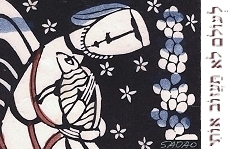
"Trust the past to God's mercy, the present to God's love and the future to God's providence." - Augustine of Hippo
06.13.25 (Sivan 17, 5785) Whenever you feel oppressed by sorrows, heartache, or fears, say with deep assurance: "The Lord cares for me, he has brought me to this place and I can trust in him." Cast your burden upon Him, whatever it may be, for He cares for you, and he will uphold your way. Refuse to stagger beneath the weight of earthly fears...
God cares for you. This is the message of the gospel, after all; this is the meaning of the cross itself: God Himself cares for you.
Consider the one who personally bore your very sins and terribly suffered in anguish for you to be fully forgiven and accepted by Heaven: This beloved one will never forsake you, but indeed forever lives to make intercession for you (Heb. 7:25). Be bold, therefore, to avail yourself before the throne of mercy, where we are given grace to help in time of need.
The Lord has not forgotten you; he will never leave you nor forsake you. He who feeds the birds of the air and tends the lilies of the field will surely provide for your needs. All who belong to him are forever made secure by the indomitable glory of his perfect love.
"I will trust Him. Whatever, wherever I am, I can never be thrown away. If I am in sickness, my sickness may serve Him; in perplexity, my perplexity may serve Him; if I am in sorrow, my sorrow may serve Him. My sickness, or perplexity, or sorrow may be necessary causes of some great end, which is quite beyond us. He does nothing in vain." (John Newman)
Let us resist then the whispers of despair. Affirm the greatness of God who watches over your way as the Good Shepherd of your very soul. Even if you are in distress, affirm the greatness of God and confess the truth of His love for you. Overlook the present moment to find refuge in his promise. Trust him to bind up your wounds and heal your broken heart. God is your strength and song! Do not countenance any thought that his grace is not present for your need and troubles. God is forever faithful; his promises are sure; the one who has begun a good work in you will perfect it: press on in confidence of your Shepherd's care...
Hebrew Lesson
Psalm 23:1-3 reading (click):
The Book of Complaint...
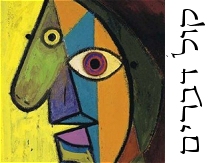
06.13.25 (Sivan 17, 5785) Some of the sages have called this week's Torah portion (i.e., Beha'alotekha) "Sefer Kvetch," a Book of Complaint, since the very first stage of the journey back to the Promised Land upon departing from Mount Sinai was marked with murmuring, ingratitude, and wild-eyed fantasies about the "good old days" when the people ate "free fish" in Egypt, and so on. The repeated episodes of complaining really were a form of rebellion against God's leadership, as the people blasphemously charged the LORD with folly, incompetence, or even malice ("Why did God take us out of Egypt - to kill us all in the desert?"). Indeed, the spiritual condition of the people was so bad that they were all doomed to die in the desert. The New Testament later identifies the unbelief of the people as a picture of blasphemy of the Holy Spirit (Heb. 3:7-4:6).
Often the Israelites appeared to behave like spoiled children, demanding "real food" and fussing over the miraculous supply of bread that literally came from heaven (manna)... It would be somewhat comical were it not so tragic: Despite all the miracles the people had directly experienced during the great Exodus - including the splitting of the Sea, the Pillar Cloud of Cloud by day and Fire by night, leading to the awesome revelation at Sinai - despite all this - in a little over a year the memory of Egypt had become positively euphoric, and the people "forgot" how degrading their lives were as slaves... They romanticized the way things were, rationalizing that it wasn't "that bad," and savored the taste of their "free fish..."
Therefore a central commandment of this Torah portion is: "Thou Shalt Not Kvetch" (or, put positively, "Thou Shalt be Grateful"). "The deeds of the fathers are signs for the children" (1 Cor. 10:11) and therefore we are sternly warned not to follow the example of those who were redeemed by God's outstretched hand but who later drew back in fear and unbelief, as it is written: "I swore in my wrath, 'They shall not enter my rest.' Take care, brothers, lest there be in any of you an evil, unbelieving heart, leading you to fall away from the living God. But exhort one another every day, as long as it is called "today," that none of you may be hardened by the deceitfulness of sin. For we have come to share in Messiah if indeed we hold our original confidence firm to the end. As it is written, "Today, if you hear his voice, do not harden your hearts as in the rebellion" (Heb. 3:11-16).
Hebrew Lesson
Psalm 95:7-8 Hebrew reading (click):
The End of the Story...
The price for Israel's unbelief was great... The narrative of Torah was supposed to have ended after the Exodus generation left Sinai to enter the Promised Land with the completed Tabernacle... Unfortunately, things did not work out that way, and "Sefer Kvetch" begins with Numbers chapter 11. According to the Talmud, the scribes marked this "unhappy ending" by putting an "inverted Nun" before and after Numbers 10:35-36 to mark a break in the (ideal) narrative. What should have been written (beginning with chapter 11) was the "happy ending," namely, that the redeemed Israelites successfully entered the land because they kept faith in the LORD's promises. In other words, the account of the sin of the spies, the apostasy at Kadesh, the exile of the Exodus generation, etc., should never have happened. The sages said that marking the text this way affirms that what should have been written will indeed one day be so written, after the Messiah comes to finally deliver the Jewish people. For more on this subject, see the article, "The Seven Books of Moses."
 |
Imminence of Judgment...
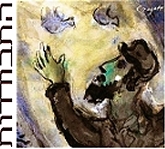
"In a time of deceit telling the truth is a revolutionary act." - George Orwell
06.13.25 (Sivan 17, 5785) This evil world is ripe for judgment, and indeed, the judgment of God has begun to fall in earnest on the nations. Deranged thinking and insanity are the hallmarks of the day. Propaganda (i.e., scripted "news") is ubiquitous as the masses throughout the world are repeatedly indoctrinated to be fearful and helpless in the face of manufactured crises... Moral truth is mocked and censored in the mass media. Public education is little more than indoctrination of godless and nihilistic ideologies of despair. Regarly worldly politics, consider the "liberal" (in name only) countries of the world today. In the name of supposed "tolerance" they have willingly opened their doors to anarchy and lawlessness, with the predictable (and desired) outcome of increased governmental oppression, tyrannical control measures, weakened populations, and so on. All this derives from the abuse of language and the scorning of divine truth... As Orwell presciently foresaw, propaganda has been designed to destroy the semantics of various cultural keywords: "marriage," "gender," "truth," "right," "wrong," "power," "borders," "racism," "liberal," "tolerance," "peace." etc. This creates further social instability and moral degradation.
Demagogues assuredly know that there is no swifter route to the corruption of thought than through the corruption of language. So let's not play that game and be sure to define our terms with some clarity of mind. The word "liberal" used to mean those who genuinely love freedom, but today's so-called "liberals" (often "democrats") are actually "anti-liberals" that is, people who hate freedom and demand conformity to their thinking (or else!). That's fascism, after all, and we should no longer allow them to get away with their spurious redefinition of terms... We are not to be ignorant of Satan's devices (2 Cor. 2:11).
"Liberalism" (in the deceptive sense) has become the doctrine of deliberate cognitive dissonance, creating dialectical tensions that redefine words to death. It is a philosophy of deconstruction, nihilism, and despair intended to create social unrest leading to "revolution." History is littered with the crumbled states and innumerable corpses that come from those who have wreaked havoc with language and made a deal with the devil to overthrow the "old regime" for something that is far, far worse -- namely, an autocratic state that dehumanizes and murders people that are considered "enemies of the State." This is where our world is now heading - into a full-on collision with God Himself and the realm of transcendental moral reality. Modern politics are "unlivewithable" because they promote the culture of death. They are scheduled for a divine appointment with the Author of Reality soon enough, and may that appointment come soon, and in our days.
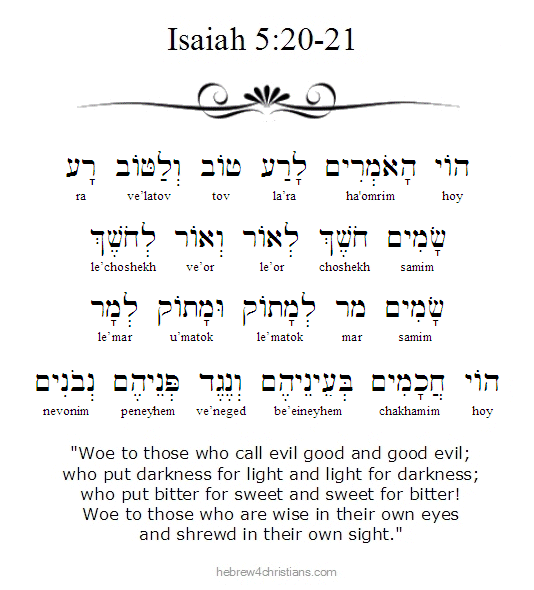 |
Propaganda is crafted to "divide and conquer" people by means of fallacies of distraction. For instance, to create social unrest and weaken a culture, propagandists focus on secondary characteristics, such as the race of a person, and elevate that to be primary in understanding our social relationships.... Really? Ask: What color is "who"? The answer to the problem of "race" relations is resolved by the truth of Scripture, since all people are created in the image and likeness of God and are therefore to be respected, and so on.
Addendum
The "dialectic" or battle of ideas between cultures, particularly those cultures based on Judeo-Christian values of justice, truth, and respect for individual liberty, and Islam with its medieval theology of absolutism is coming to its head. Since the early 1900's the apostate west has turned progressively away from God and the idea of transcendental truth to embrace moral relativism. The fruit of such skepticism is the postmodern world of today, where "anything goes." Gender (and sexual) identity is openly rejected; ethical ideas of "good," "evil," "right" and "wrong" have been subjectivized into irrelevance; the epistemological ideas of "truth" and "falsehood" have been vitiated by spurious reasoning about "fuzzy" logic and non-binary calculations, and so on. The only non-negotiable (or absolute) value of the postmodern world is an undiscrimating (i.e., unthinking) form of "tolerance" that claims that "all viewpoints" are equally valid (and therefore that none really are), which of course is not only self-contradictory (because the claim that everything is relative is considered an "absolute") but is inherently self-destructive. The "sword of Allah" is the antithesis to the anarchy of the postmodern world, insisting that truth matters and that if you do not submit to the theological fascism of Islam, you will be killed... But it goes deeper still than such religious differences. The "sword of Allah" is a tool being used by a satanic ruling "elite" to undermine the foundations of all the nations and to usher in a "new world order" that will enslave humanity to global autocratic control. That is the end game. Thank God, however, that the aspirations of the wicked will be overthrown during the End of Days where the supreme autocratic leader (antichrist) will be overthrown and the Kingdom of God will be established in Zion... That day draws near, chaverim...
Selected Scriptures
- "Because I have called and you refused to listen, have stretched out my hand and no one has heeded, because you have ignored all my counsel and would have none of my reproof, I also will laugh at your calamity; I will mock when terror strikes you, when terror strikes you like a storm and your calamity comes like a whirlwind, when distress and anguish come upon you. Then they will call upon me, but I will not answer; they will seek me diligently but will not find me. Because they hated knowledge and did not choose the fear of the LORD" (Prov. 1:24-29).
- "The kings of the earth set themselves, and the rulers take counsel together, against the LORD and against his Anointed, saying, "Let us burst their bonds apart and cast away their cords from us." He who sits in the heavens laughs; the Lord holds them in derision. Then he will speak to them in his wrath, and terrify them in his fury, saying, "As for me, I have set my King on Zion, my holy hill." I will tell of the decree: The LORD said to me, "You are my Son; today I have begotten you. Ask of me, and I will make the nations your heritage, and the ends of the earth your possession. You shall break them with a rod of iron and dash them in pieces like a potter's vessel" (Psalm 2).
- "God is a righteous judge; a God who feels indignation every day" (Psalm 7:11).
- "For the LORD of hosts has a day against all that is proud and lofty, against all that is lifted up-- and it shall be brought low" (Isa. 2:12).
- "For behold, the day is coming, burning like an oven, when all the arrogant and all evildoers will be stubble. The day that is coming shall set them ablaze, says the LORD of hosts, so that it will leave them neither root nor branch" (Mal. 4:1).
- "Therefore, as flaming fire devours straw, and dry grass disintegrates in the flames, so their root will rot, and their flower will blow away like dust. For they have rejected the law of the LORD of Hosts (תורת יהוה צבאות), they have spurned the Word of the Holy One of Israel" (Isa. 5:24).
- "Wail, for the day of the LORD is near; as destruction from the Almighty it will come!" (Isa. 13:6).
- "Therefore I will make the heavens tremble, and the earth will be shaken out of its place, at the wrath of the LORD of hosts in the day of his fierce anger" (Isa. 13:13).
- "Be silent before the Lord GOD! For the day of the LORD is near; the LORD has prepared a sacrifice and consecrated his guests" (Zeph. 1:7).
- "For the day is near, the day of the LORD is near; it will be a day of clouds, a time of doom for the nations" (Ezek. 30:3).
- "For the day of the LORD is near upon all the nations. As you have done, it shall be done to you; your deeds shall return on your own head" (Obad. 1:15).
- "Your hand will find out all your enemies; your right hand will find out those who hate you. You will make them as a blazing oven when you appear. The LORD will swallow them up in his wrath, and fire will consume them" (Psalm 21:8-9).
- "Our God comes; he does not keep silence; before him is a devouring fire, around him a mighty tempest" (Psalm 50:3).
- "And I saw the dead, great and small, standing before the throne, and books were opened. Then another book was opened, which is the book of life. And the dead were judged by what was written in the books, according to what they had done" (Rev. 20:12).
 |
The Emptiness of Worldly Philosophy...

"Don't let anyone capture you with empty philosophies and high-sounding nonsense that come from human thinking and the principles of this world, rather than from the Messiah." - Col. 2:8
06.13.25 (Sivan 17, 5785) Worldly philosophy and logical argumentation can never bring a person into relationship with the Living God, since human reason by itself serves as an instrument of the will, and therefore the will must first accept that something is true before reasoning can even begin. Knowing that God exists, however, is not gained by deductive reasoning or by logical axioms but by direct mystical encounter and revelation that establish the starting point of godly reasoning. Part of that revelation is found in the conviction of the conscience, intuitions of what is "right" and what is "wrong," with the authority of a divine "voice" that inwardly speaks to the soul. Philosophical intellectualism, while perhaps useful in some cases, is powerless when it comes to the issue of personally knowing God, since it invariably indulges the mind with unending questions that reinforce unbelief and godless impulses: "The natural person (i.e., ψυχικός, the worldly-minded, "soulish" person) does not accept the things of the Spirit of God, for they are folly to him, and he is not able to understand them because they are spiritually discerned" (1 Cor. 2:14; Rom. 8:7).
Worldly philosophy is inimical to faith in God since it undermines the vision and conviction that reality itself demands reverence, and therefore its bias is to reject the idea of divine Lawgiver (i.e.. transcendental moral truth) in order to evade the idea of retribution for wrongdoing. However it is precisely this fear of retribution for sin that constitutes the first step of faith, since the "fear of the LORD is the beginning of wisdom, and to depart from evil is understanding" (Prov. 1:7, 3:7, 14:6; Job 28:28; Psalm 34:14; etc.).
Incidentally, any form of "Christianity" that minimizes the divine wrath for sin perverts the meaning of the gospel itself, confusing worldly sentimentality with the terrible price paid for the atonement... However if there is no retribution for sin, there is no need for the cross, and that leads to the false teaching sometimes called "cross-less Christianity." The Apostle Paul would describe those who deny the wrath of God and the need for divine blood atonement as the "enemies of the cross of Messiah" (τοὺς ἐχθροὺς τοῦ σταυροῦ τοῦ χριστου), and indeed the focus of his ministry was centered on the Messiah Yeshua who was crucified for our healing: "For I decided to know nothing among you except Yeshua the Messiah and him crucified" (1 Cor. 2:2; 2 Cor. 5:18). There is simply no gospel message apart from the truth of the verdict of the law, and therefore the first step of faith is to fear God's wrath for sin and to tremble before the remedy given in the sacrifice of Yeshua...
It is written, "with the pure you show yourself pure; but with the perverse you show yourself perverse" (Psalm 18:26, Titus 1:15). We see by means of faith, and what we see is also the result of faith. As Yeshua said, "according to your faith be it done to you" (Matt. 9:29). For the one who trusts in God's holiness and love, the whole world will be lit up with divine glory (Isa. 6:3), but to the one who trusts in his own reasoning, demanding to understand in order to believe, the whole world will be filled with darkness, vanity, and despair.
To the believer in the Lord, worldly philosophy is a dead end since it is devoid of life and blessing. Torah begins without philosophical rationalization by simply affirming, "In the beginning God created the heavens and the earth" (Gen. 1:1). We believe in God because he imparts the blessing of faith, not because of philosophical or rational arguments. Therefore Scripture admonishes us to be "simple" before the LORD, that is, "wholehearted" and full of confidence (Deut. 18:13). Philosophy and worldly wisdom offer up speculations, probabilities, and tentative inferences, but the life of faith encounters the urgency of the moment, when the heart casts itself in complete abandonment before God. Philosophy says, "let's consider the evidence," but faith says, "you shall love the LORD your God with all your heart, with all your soul, and with all your might" (Deut. 6:5).
Worldly philosophy is childish because it trifles with the meaning of life, pretending to be "objective" in its thinking and observations; it is, however, cowardly because it does not want to venture the risk of faith, and it is disingenuous because its refuses to recognize that its own set of presuppositions constitutes a system of faith, a "religion" of the ego and its self-styled rationalizations. "For the wisdom of this world is folly with God. For it is written, "He catches the wise in their craftiness," and again, "The Lord knows the thoughts of the wise, that they are vain" (1 Cor. 3:20). "As a man thinketh in his heart, so is he..."
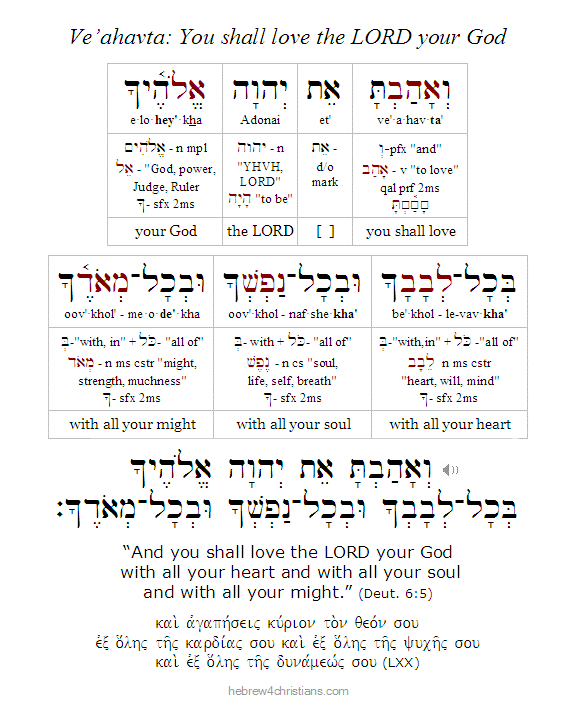 |
Now while worldly philosophy is often little more than the mutterings of fools (Psalm 14:1), there is a "hidden wisdom" (חָכְמַת נִּסְתָּרָה) of God that is not grounded in worldly speculations, that is, "the wisdom of God in a mystery, even the hidden wisdom, that God ordained before the world for our glory" (1 Cor. 2:7). This is the wisdom of God revealed in the overarching plan of redemption given in the Scripture, a plan that transcends human reason yet is discerned by the spirit to be of divine origin (Eph. 3:9-11; Rom. 16:25-26; 1 Tim. 3:16; Rom. 11:33-36). Moreover God has implanted within the human heart a "hunger for eternity" (Eccl. 3:11), intuitions of the divine power who designed and created the universe (Psalm 19:1-2; Rom. 1:20), and an innate sense of justice within the soul to reveal moral reality (i.e., the conscience). Indeed, the right use of logic and reason - when submitted to the obedience of faith - is assuredly useful as we seek to interpret Scripture and apply its significance to our lives. "Faith seeking understanding" is a valid approach when interpreting Scripture, though even then, when logical paradoxes arise (e.g., the paradox between free will and God's foreknowledge, or the paradox that the infinite became finite in the incarnation of Yeshua) we must confess to the limitations of reason and resort to pure faith - trusting in the LORD God who is beyond our understanding (Prov. 3:5-7; Psalm 145:3; Isa. 40:13, 28).
Faith sees the invisible... "For the things that are seen are transient, but the things that are unseen are eternal... For the invisible things of Him from the creation of the world are clearly seen, being understood by the things that are made, even his eternal power and Godhead. Therefore we are strangers and exiles on the earth, looking forward to the city that has foundations, whose designer and builder is God" (2 Cor. 4:18; Rom. 1:20; Heb. 11:10,13).
Our father Abraham was promised descendents as numerous as the stars in the sky or sand on the seashore, despite the fact that he was an old man and his wife had long past the age of bearing children. Abraham believed in the One who gives life to the dead and calls into existence the things that do not exist: "He staggered not at the promise of God through unbelief but was strong in faith, giving glory to God; and being fully persuaded that, what He had promised, He was able also to perform: And therefore it was imputed to him for righteousness" (Rom. 4:19-22). By faith Abraham looked beyond the stars, closing his eyes to this world, and thereby discovered the inner light of truth...
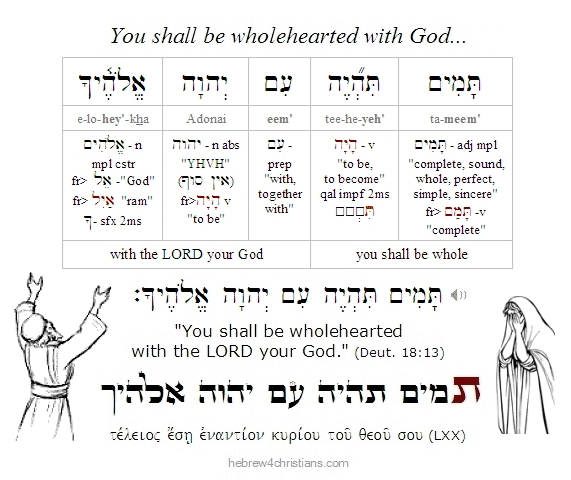 |
Not losing your mind...

06.12.25 (Sivan 16, 5785) The Apostle Paul foretold that the time before the "End of Days" would be "perilous" and full of unrelenting human depravity and lawlessness (2 Tim. 3:1-5). Yeshua warned that apostasy would abound and that the hearts of many would run cold as ice (Matt. 24:12). In light of the raging spiritual war going on all around us, the following needs to be emphatically restated: "The important thing is to not lose your mind..."
The mind is the "gateway" to your heart, and it is therefore essential to guard your thinking by immersing yourself in the truth... "Not losing your mind" therefore means being grounded in what is real, and it therefore means understanding your identity and provision as a child of God. "God has not given us the spirit of fear, but of power and of love, and of a sound mind" – literally, a "delivered" mind, "healed" from chaos and despair (2 Tim. 1:7). The Greek word "sound mind" (σωφρονισμός) comes from a verb meaning "to be made safe," in the sense of being under restraining influence of the Spirit of God... The closest Hebrew word might be musar (מוסר), or "moral discipline."
Part of the task of "guarding your mind" is being able to discern between good and evil. "The fear of the LORD is to hate evil" (Prov. 8:13) and as the prophet cried out, "Hate what is wrong, love what is right" (Amos 5:15). We must love the truth and abhor the lie (Psalm 119:163, Zech. 8:19; Prov. 12:22). Tolerating sin in a world ripe for judgment is a tacit form of "collaboration" with the enemy. Indeed, the only thing regarded as intolerable in the devil's world is the denial that people have the "liberty" to sin. But the Lord is clear on this point: "Woe to those who call evil good and good evil, and who turn darkness into light and light into darkness, to those who turn bitter into sweet and sweet into bitter. Woe to those who are wise in their own eyes, and shrewd in their own sight!" (Isa. 5:20-21). It is the truth that sets people free, but this presupposes the ability to discern how we become enslaved to deception. Therefore we are instructed: "You are to distinguish between the holy and the common, and between the unclean and the clean" (Lev. 10:10).
Someone who loves you will to help you stay honest with yourself: The truth of God's moral law is likened to a Father's moral correction that leads his child to life (Prov. 6:23).
Hebrew Lesson
Psalm 119:105 reading:
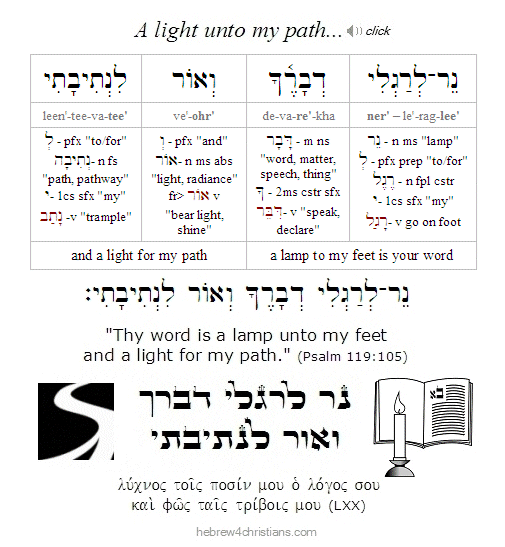 |
Shelter of the Most High...
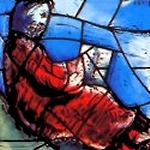
06.12.25 (Sivan 16, 5785) The "world" is a place of fearful exile from the Lord. To find healing, turn must away from its faithless messages and listen (shema) to the great promises of God. As it is written: "He who abides in the secret of the Ascended One will dwell in the shadow of Shaddai" (Psalm 91:1).
The sages say that Moses wrote Psalm 91 as he dwelt in the secret place (סֵתֶר) of the Most High God, in the "midst of the dark cloud" (Exod. 24:18), a place of sacred and holy concealment. The thick clouds were a "hiding place" for him (Job 22:14). Notice that the one who "abides" in the secret of the Most High dwells in an ascended place of rest – being lifted up above the surrounding madness of this fallen world of flux and shadows. The Hebrew word means to lodge or to "sleep" (לִין), connecting it with death and resurrection. By dwelling in the death and resurrection of Yeshua, God will shield you with His Presence and make evil powerless before you.
When you abide in the secret of Elyon (עֶלְיוֹן) - "the Ascended One" - you are concealed by the dark clouds of His Glory, and the Presence of Shaddai (שַׁדַּי) overshadows you... The LORD will save you from the ensnaring trap and from the devastating pestilence (Psalm 91:3). By abiding in the truth that God's Presence pervades all things at all times - you become a "stranger" (גֵּר) with the LORD in this world, a "sojourner" (תּוֹשָׁב) who awaits the healing of the world at the end of the age. "You will tread on the lion and the adder; the young lion and the serpent you will trample underfoot" (Psalm 91:13).
We are made secure exclusively on account of Yeshua our Savior, who gloriously ascended over the powers of this age, the hidden principalities of darkness, and who made safe passage for us to come by means of his sacrificial death on the cross. Yeshua is the Bridge and the Way to the truth that sets you free, though He indeed is the narrow bridge. Because of Him alone, we have access to the Divine Presence, the Holy of Holies made without human hands. Yeshua is the Ascended LORD of Glory, the Master of all possible worlds, and the King over all thing!. Nothing can stop Him or thwart His victory secured for those trusting in Him.
Hebrew Lesson
Psalm 91:1 reading (click):
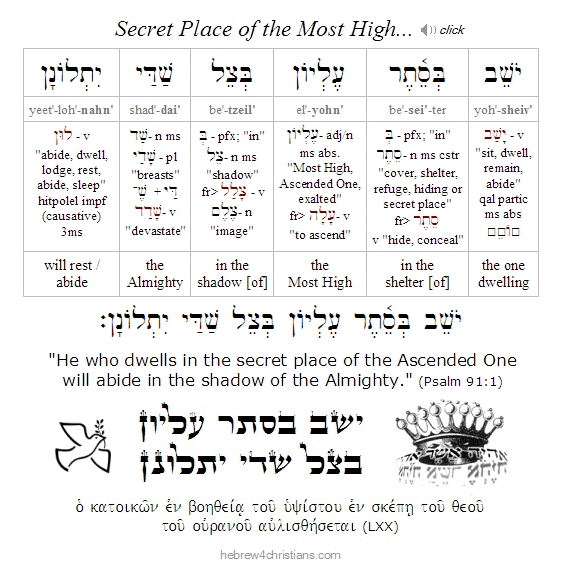 |
Since God hides Himself in this world (Isa. 45:15), we must humbly seek His face to enter into the place of His holy concealment in all things. God is Elyon – ascended High above - but He dwells "with the lowly and the broken of heart" (Isa. 57:15). Therefore the LORD our God is called Shaddai (שַׁדַּי) – our Sustainer, Provider, Refuge, and Home. Just as we can be surrounded by the "shadow of death" (tzal mavet), so we can be surrounded by the "shadow of Shaddai" (tzal Shaddai). Like a powerful eagle brooding over her chicks, so Shaddai covers you with wings of protection (Psalm 91:4).
Miracle of Regeneration...
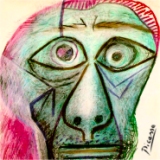
"The most common form of despair is not being who you are." - Kierkegaard
06.12.25 (Sivan 16, 5785) Many of us deal with inner conflicts, self-reproach, and meagerness of faith... It is reported that on his deathbed Reb Zusya said, "I am not afraid that the Holy One will ask me, 'Zusya, why were you not more like Moses?' Rather, I fear the Holy One will say, 'Zusya, why were you not more like Zusya?'" This Hasidic story is interesting because, on the one hand, how could Zusya be anyone other than he is? and on the other, why is Zusya afraid that he is not who he should be? Zusya's parable reveals that there is an inner conflict in his soul. He senses that has not lived as he ought, that he has failed himself (and God), and that he is lost in the rift between the ideal and the real... His struggle, then, is with himself. Who he is and who he thinks he should be are at odds within his heart.
The question of who we are supposed to be haunts us, and consciousness of the failure to practice our ideals leads to a sense of guilt, anxiety, and shame. For those who believe in Yeshua the question is essential to the question of what it means to be an authentic disciple. How are we to live before God and be accountable for what we do? For instance, we read Yeshua's message in the Sermon on the Mount and we eventually realize - if we are honest with ourselves - that it is not within our nature to be able to do as he teaches, and this leads us to a despair not unlike that which Zusya experienced. A divided house cannot stand....
Reb Zusya's despair can be remedied only by overcoming the inner divide through a personal relationship with Yeshua, for salvation is not simply deliverance from the accusations of conscience (i.e., the verdict of the law) but constitutes the healing grace that delivers us from ourselves. Yeshua did not die on the cross to simply take away our sins, but to create within us indestructible new nature that it no longer enslaved to the power of sin. The message of the gospel is that your heart can be - and ultimately will be - transformed by the miracle of God given in Yeshua.
Salvation is not a matter of "religion" or of man's attempt to justify himself by some kind of reformation of character. Yeshua is not the "second coming of Moses," after all. Try as you might to live a "good life," keep the commandments, and aspire to elevate yourself spiritually, you will eventually come to realize that it is impossible to change yourself. You will then be faced with a decision: either to deceive yourself about who you are, or to be honest and confess your wretched and hopeless condition. This is the "lawful use of the law," that reveals the "ought-to-be" self, so that the gap between the ideal and the real becomes unsurpassable, and we know ourselves as lost sinners who are in peril over ourselves...
In our natural estate we are "fallen," shattered of heart, full of trouble "as the sparks fly upward." As Simone de Beavoir once wrote: "In the very condition of man there enters the possibility of not fulfilling who he is" (Ethics of Ambiguity, 1947). The breach between who we are and what we ought to be creates a sense of alienation from ourselves, a "shadow self" that we deny, suppress, or try to control. In a moment of rare lucidity, the "natural man" cries out to God: "What do you want from me?" This is the moment when truth has its opportunity, when the heart is stirred to confess its need for deliverance and to accept God's love, despite the brokenness and incoherence of life.
When by miracle we escape from the "hard yoke" of our laws, our vain attempts at self-justification, we do not encounter another set of laws, or another heavy yoke, but we take hold of the love of God, a personal love, and we engage in relationship with God as the central (and unifying) reality of our lives. Deliverance from ourselves is not found in religious (or "spiritual") recipes of any kind but in our connection with the truth of who God really is, trusting in his love and healing for all that we are, have been, and ever shall be, amen.
"Salvation is of the LORD," which means that God does the work of righteousness within you. It is God who saves you; it is God who sanctifies you, and ultimately it is God alone who heals you. Whenever you say "I can't," you are either looking at yourself or at God. If you are looking at yourself, "I can't" is better understood as "I won't," and the problem then is a lack of faith. On the other hand, if you are looking at God, "I can't" is followed by "but You can, O Lord" and faith trusts that God will complete the good work that he has begun in you.
God sends each soul into the world with a special message to deliver, a revelation that only he or she can disclose... As George MacDonald once said, "I would rather be what God chose to make me than the most glorious creature that I could think of; for to have been thought about, born in God's thought, and then made by God, is the dearest, grandest and most precious thing in all thinking." That's the good news of the gospel, friends: God not only saves us from ourselves, he remakes us to be true bearers of his image and likeness. He works all things together for his glory and our good. Amen, let it be so, O Lord!
Hebrew Lesson
Psalm 51:10 reading (click for audio):
 |
Trusting God's Plan...

06.11.25 (Sivan 15, 5785) "And now abide faith, hope, love: these three" (1 Cor. 13:13). The opposite of faith is fear; of hope, despair; and of love, indifference. Fear is the "default mode" of the soul that dwells in darkness. This is because the "fallen" soul regards the empirical world and its flux as ultimately real -- and therefore "sees in order to believe." The life of faith, on the other hand, looks beyond the realm of transient appearance to behold an abiding glory -- and therefore "believes in order to see." How we choose to see is ultimately a spiritual decision for which we are each responsible....
In the geo-political world there are more seemingly good reasons to be afraid today than in any time since the rise of Nazi Germany in the 1930s. Every day the media indoctrinates people about the threats of various plagues (e.g., H5N1, H1N1, SARS, Covid), of economic disasters, of terrorist plots, globalist tyranny, and so on. In short, living within a "culture of fear" (with its ongoing propaganda campaigns from both the right and left wing perspectives) is to traffic in images and sound bites, inducing a sense of dread and anxiety (as someone once said, "FEAR" is "False Education Appearing Real"). Just as a lie-detector can physiologically sense when people are telling lies, so our souls can sense when we are believing them... There is no neutral ground here, no "transcendent" place of the soul where we can rise above the realm of truth claims: We will either be set free by the truth or else we will live in fear. As Yeshua said, the "Truth shall set you free" (האמת תשחרר אותך).
Of course it isn't easy to be courageous, and the temptation to yield to fear often seems compelling. The test of our faith is of more value to the LORD than our material or emotional comfort, however, and therefore we will all experience tribulation of various kinds. This is the way we obtain heart (i.e., courage). Awhile ago I wrote a Hebrew meditation ("Fear Thou Not") that reminded us that the most frequently occurring commandment in Scripture is simply al tirah (אַל־תִּירָא), "don't be afraid." If living without fear were easy, it would be of little spiritual worth, but since it requires all of our heart, soul, mind, and strength, it is therefore considered precious. It requires, in short, an infinite (and divinely given) passion. And it is part of God's plan for us to be "in but not of" the world system, to be alienated, to be misunderstood, to be persecuted... We are called to "take up the cross" and to die daily. Following Yeshua means denying ourselves along the way.
Ultimately fear distills to the fear of death, or rather, of "the one who has the power of death, namely the devil" (Heb. 2:14-15). If we come to peace with our own finitude, our own mortality, and our eventual blessed estate in the Messiah, death has no more power over us. Perhaps this is part of the reason why Christian faith is so hated in communist countries or in other places of absolutist secular ideologies (including "deconstructed" America). If you are free from the greatest threat that man can menace over you, if you are free of the fear of man, then you are free to be a voice crying in the wilderness, a bold witness of truth....
Fear is the antithesis of faith, though living without fear is certainly not easy. After all, how do we naturally choose to be unafraid of what we in fact fear? Is this power within our conscious control? Only by a miracle are we set free from fear... Indeed, true faith working within the heart is one of the greatest miracles of God. May it please God to impart to each us real courage that comes from Heaven itself. Amen.
Hebrew Lesson:
John 4:18 reading (click):
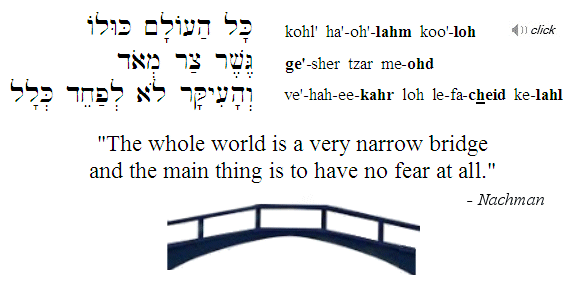
Outshining the Darkness...
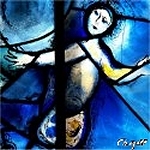
06.11.25 (Sivan 15, 5785) "If I say, surely darkness covers me ... the night shines as the day; nothing hides from your radiance" (Psalm 139:11-12). We have to trust that God is in our darkness, in the silence, in the unknown... You come out of the shadows when you admit that you act just like other people, that you are human, in need of reconciliation yourself...
Above all you need God. You need help. You need a miracle to help you to truly love. You may find excuses for many things, but you cannot escape the "wretched man that I am" reality that is grounded in your fears. God sees in the darkness and is present there, too. When you feel alone, like an unbridgeable gulf lay between you and all that is good; when you feel like you want to scream but are afraid that even then no one would hear, may the LORD shine His light upon you... Amen, may His light shine upon you.
גַּם־חשֶׁךְ לא־יַחְשִׁיךְ מִמֶּךָ
וְלַיְלָה כַּיּוֹם יָאִיר
כַּחֲשֵׁיכָה כָּאוֹרָה
gam-choh'·shekh · loh-yach·shikh · mee·me'·kah
ve·lai'·lah · kai·yom · ya·eer
ka·cha·she·khah · kah·oh'·rah

"The darkness is not made dark to you;
but the night shines as the day:
as the darkness so is the light...
(Psalm 139:12)

"For it is you who light my lamp; the LORD my God outshines my darkness" (Psalm 18:28). There is "depression," and there is the dark night of the soul, and these are different matters, though they may overlap... "Hope deferred makes the heart sick." The dark night of the soul calls us to walk by faith, not by sight. Faith enables us to walk through the darkness with God and to learn from him even there, as it is written: "Who among you fears the LORD and obeys the voice of his Servant, who walks in darkness and has no light in him? Let him trust in the Name of the LORD and lean upon his God" (Isa. 50:10).
Hebrew Lesson
Psalm 18:28 reading with comments (click):
The Seeking Shepherd...
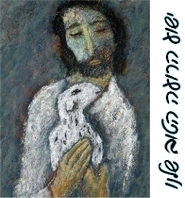
06.10.25 (Sivan 14, 5785) "Those who are well have no need of a physician, but those who are sick" (Matt. 9:12). Even though we are weak, sickly, broken, and sinful people, we must never lose hope and begin to fear that we are worthless in the eyes of heaven... Indeed, our infirmities are often a blessing in disguise, a gift that reveals our need...
If you are sinful and sick, you are invited to come before the Master for life and rescue from the power of sin. Take your place among the lepers, the tax collectors, the outcasts... you will never hear Him criticize you or shame you for sincerely coming to Him for healing of your sinful state... "For the Son of Man came to seek and to save the lost" (Luke 19:10).
Yeshua is the Good Shepherd (הָרעֶה הַטּוֹב) who leaves his "flock of 99" sheep to find the one sheep who is lost (Matt. 18:12-14). He is always like that – He is always seeking and saving the lost sinner; He is always offering life and healing to those who have been made sick with the plague of sin. Thank God we have a Savior who seeks us out in our desperate need!
Hebrew Lesson
Ezekiel 34:16 reading (click):
 |
King David wrote, "You have given those who fear you a banner (נֵּס לְהִתְנוֹסֵס) for the sake of the truth" (Psalm 60:4), which Rashi interprets as, "You have given hardships and suffering to those who fear you to elevate them in the way." Indeed the word nes (נֵּס) can mean "banner" (as on the mast of a ship), a "sign" (or miracle), or a "test" (nisayon). God tests those who fear Him in order to help them become a miraculous sign to the world at large. Ultimately, the sign or miracle is the gift of Messiah's suffering on our behalf and His resurrection for our justification (Isa. 11:10). Even in the face of our enemies who have breached the land, we have the promise of victory in Adonai Nissi (יְהוָה נִסִּי), God my Miracle.
May you, dear broken and contrite one, hear the word of His hope calling out for your soul... He is your Shepherd, your Healer, and your Miracle. May you come beneath His banner of truth and love to find eternal refuge.... Amen.
The Central Light...

"I believe in Christianity as I believe that the sun has risen: not only because I see it, but because by it I see everything else." - C.S. Lewis (God in the Dock)
06.10.25 (Sivan 14, 5785) Our Torah portion this week (i.e., Beha'alotekha) begins with the LORD instructing Aaron to kindle the seven lamps of the Menorah (מְנוֹרָה) so that the light from each would be "turned" toward its central shaft (Exod. 25:37; Num. 8:4). The entire Menorah was formed mik'shah (מִקְשָׁה), that is, beaten from a single piece of pure gold (זָהָב טָהוֹר), and its base, shaft, branches, cups, fruits, and flowers were all "one" with its substance (Exod. 25:31). The central shaft upheld the light of the Shamash (servant or helper lamp) which also served as the trunk for the other branches.
The radiance of the Menorah symbolized the Divine light (the word "shamash" can also be read as shemesh, "sun"), which is the radiance of Yeshua, the Tree of Light and the great Servant of the LORD (John 8:12; 1 John 1:5; Prov. 3:18). Yeshua is the light that gives light to every person created in the image of God (John 1:9). Our spiritual life stems from our connection with Him, since he provides us with support, sustenance, and illumination from the oil of the Holy Spirit (John 15:1-5).
Amen. Yeshua is the Light of the LORD (אוֹר יי). As it is written, "God is our light and our yeshuah (יְהוָה אוֹרִי וְיִשְׁעִי), our salvation" (Psalm 27:1; 1 John 1:5). He alone is the Light of the world (אוֹר הָעוֹלָם), the Shamash (שַׁמָּשׁ) who descends to ignite the "light of life" (אוֹר הַחַיִּים) within all who will believe. Our Savior is the Radiance (זוֹהַר) of the glory of God (Heb. 1:3), the Fire of God's holy countenance. The person who has the Son has life, but the one who refuses this life is spiritually dead. May we all walk in the Light of His countenance; "O house of Jacob, come, let us walk in the light of the LORD" (Isa. 2:5).
The essential question is whether you are willing to believe in the light of God's love. Will you choose to receive his promise? Yeshua said that He is the light of the world, and that those who follow him will not walk in darkness, but will have the light of life (John 8:12). So, do you have ohr ha-chayim (אוֹר הַחַיִּים), "the light of Life," shining within your heart? The light radiantly beckons: "Wake up, open your eyes, and believe! Darkness and despair will not prevail; your mourning will find comfort, your grief its solace. Your heart's deepest longing shines brightly, even now, if you will but believe...
Let us press on in our confession, chaverim; let us take courage and affirm the promise of our faith: "The LORD is my light and my salvation (i.e., my Yeshua); whom shall I fear? The LORD is the refuge of my life; of whom shall I be afraid?" Amen.
Hebrew Lesson
Psalm 27:1 reading (click for audio):
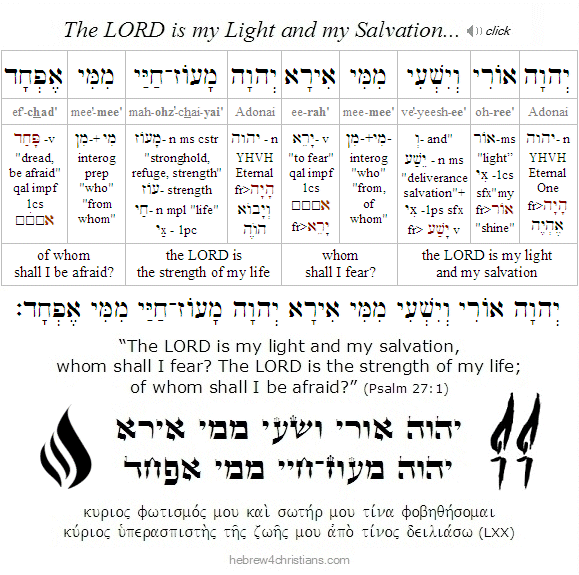 |
Note: For more on this topic, see "The Menorah and the Tree of Life."
Finding Right Desire...

06.09.25 (Sivan 13, 5785) Our Torah portion this week (i.e., Beha'alotekha) recounts the rebellion of the people during the desert sojourn... Instead of joyfully anticipating the promise of their inheritance, the people grew dissatisfied and bored. The Sefat Emet noted that just after we read how the people complained bitterly to the LORD, they had a "strong craving" (הִתְאַוּוּ תַּאֲוָה), which in Hebrew literally means they "craved a craving."
Moses could tolerate the people's desire for food and water, but when they began to actively cultivate their cravings, lusting after the imaginary "free fish" they enjoyed in Egypt, he began to realize that the problem was deeper, a matter of the heart (Deut. 9:22)... Moses understood that what the people really wanted was impossible, since it involved denying who they were as God's redeemed people.
The issue was not about wanting to eat "meat," after all, but rather hungering after the forbidden, desiring to desire, etc. Creating desires, fomenting a sense of deprivation, and choosing to see yourself as a victim, is a lethal sickness of spirit, a disease of the soul. It is a "burning" (i.e., taberah: תַּבְעֵרָה) that destroys inner peace. It is the spirit behind all sorts of addictions. May God help us understand and seek what truly matters; may he deliver us from self-destruction; and may he help us to be satisfied with the manna he provides! Amen.
Hebrew Lesson
Psalm 37:4 reading (click for audio):
Stupor and the Mass Mind...
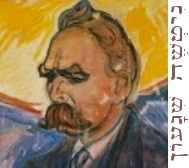
06.09.25 (Sivan 13, 5785) Perhaps the defining characteristic of our age may be summed up by the word "stupidity," which may be defined as the impaired spiritual, moral, and mental condition of acculturated people (even seemingly intelligent ones) that has rendered them incapable of honestly evaluating truth claims and thinking logically (Rom. 1:28). Such "stupidity" has been inculcated by pop culture, comedians, vulgar music, and scripted by mass media; it has been propagated by the "dumbing down" of our educational system, and disseminated by godless political correctness propaganda for several generations now... Today we live in a morally insane and utterly lawless culture that is incapable of self-governance -- a culture that has become entirely reprobate before the eyes of heaven. Like the debaucheries revealed by ancient Sodom, the Judgment of God is a hand.
Dietrich Bonhoeffer, who was surrounded by the atrocious evils of Nazi Germany, regarded the stupidity of his age as more dangerous than outright evil, since stupidity is a type of irrationality, a chosen ignorance of what is real and true. It is like the fatuous eructation that arises after chugging down several pints of beer... Against such mockery or willed ignorance we are often defenseless, since logical reasoning that appeals to objective truth for its premises finds no traction, carries no weight, and has no effect. It is like arguing about morality with a man filled with whiskey or who is high on drugs. The strategy of the devil, then, seeks first of all to stupefy people, that is, to flatter and persuade them that there is no need for them to engage in serious thinking or to humbly question their assumptions... This is the deeper meaning of "intoxication." As William James observed: "A great many people think they are thinking when they are merely rearranging their prejudices." The antidote to unthinkingly accepting the biases and inculcated prejudices of the world is to be awakened to the reality of God: "The fear of the LORD is the beginning of wisdom, and the knowledge of the Holy One is understanding" (Prov. 9:10).
For Bonhoeffer, stupidity is a moral fault, not an intellectual deficiency; it is the toxic result of a willed ignorance, unwarranted pride, and cynical laziness. It is not a matter of intelligence per se. You can be a highly intelligent yet be entirely stupid in your thinking. As Bonhoeffer wrote: "If we want to know how to get the better of stupidity, we must seek to understand its nature... that it is in essence not an intellectual defect but a human one. There are human beings who are of remarkably agile intellect yet stupid, and others who are intellectually quite dull yet anything but stupid. We discover this to our surprise in particular situations. The impression one gains is not so much that stupidity is a congenital defect but that, under certain circumstances, people are made stupid or that they allow this to happen to them. We note further that people who have isolated themselves from others or who live in solitude manifest this defect less frequently than individuals or groups of people inclined or condemned to sociability. And so it would seem that stupidity is perhaps less a psychological than a sociological problem" (Bonhoeffer: Letters from Prison).
Soren Kierkegaard likewise regarded stupidity to be a category of the "group-think" of the crowd. He wrote: "There is a view of life which holds that where the crowd is, the truth is also, that it is a need in truth itself, that it must have the crowd on its side. There is another view of life; which holds that wherever the crowd is, there is untruth, so that, for a moment to carry the matter out to its farthest conclusion, even if every individual possessed the truth in private, yet if they came together into a crowd (so that "the crowd" received any decisive, voting, noisy, audible importance), untruth would at once be let in... Indeed, the crowd is untruth. There is therefore no one who has more contempt for what it is to be a human being than those who make it their profession to lead the crowd. ... For to win a crowd is not so great a trick; one only needs some talent, a certain dose of untruth and a little acquaintance with the human passions" (Upbuilding Discourses).
Those who deny that truth exists (or those who deny that something may be known about reality) are themselves making a truth claim, namely the claim that there is no such thing as objective truth (or that knowledge of the world is not possible). This self-inflicted incoherence is a sign of irrationalism, of course, the abandonment of reason, which perhaps is the ulterior motive for such manner of thinking, after all. The person who denies truth does so to escape the demands of truth – to flee from personal responsibility before moral and spiritual Reality. It is a form of "wish-fulfillment" to deny that people are not responsible for what they believe and how they live their lives. Hence our culture's obsessive "busyness," its craving for ongoing diversion, entertainment, fantasy, escapism, and so on. Our generation finds evil in "boredom" and finds nothing of lasting interest because it has forsaken the big questions of life and the pursuit of truth. Popular culture encourages apathy, indifference, and seeks to enslave people to thrills and titillations of the moment... The ancient pagan world at least esteemed honor and believed in the pursuit of virtue and truth, but today's post-Christian world is nihilistic, anarchist, and therefore marks a return to barbarism.
Hebrew Lesson:
Proverbs 9:10 Hebrew reading lesson (click):
The central axiom of all right thinking about reality is "wonder," or the humble awareness that life itself is something mysteriously beautiful, amazing, and therefore inherently sacred. This is sometimes called yirat Adonai (יִרְאַת יְהוָה), "the fear of the LORD" that leads to wisdom. Right thinking therefore begins with consciousness of the good (הַכָּרַת טוֹבָה), that is, with an awareness that life itself a gift, a mystery, and a hallowed question... We seek our origin, our essence, and our purpose -- and in our seeking we seek the LORD. We long for deliverance from what keeps us from healing, from love, from real hope. And as we seek, the wonder of the LORD God never ends. As Yeshua said, "Ask, and it will be given to you; seek, and you will find; knock, and it will be opened to you" (Matt. 7:7).
Break Free of the Matrix...

06.09.25 (Sivan 13, 5785) Much of what we think - our ideas, motives, desires, and our assumptions about what is real - is socially engineered and controlled, and indeed we are usually unconscious of how we are conditioned to accept false visions and interpretations of reality... Pop culture, politics, socialized education, the world "news," and the "Zeitgeist" of the age, all serve as outlets of spiritual disinformation and propaganda, "teaching" (implicitly) that there is no Creator and moral Authority that bears on our existence, that there is no Judge before whom each soul shall give account of their lives. Consequently the "wisdom of this world" insists that there is no existential need for people to turn to God for deliverance from evil and spiritual death, but on the contrary assumes that that everything that exists (inexplicably) has evolved out of primordial nothingness by means of randomness (evolutionary theory), that moral truth expresses mere subjective preference, and that there is no ultimate purpose to our lives other than the immediacy of the moment and the will to selfish fulfillment...
We must be conscious of the various self-destructive philosophies of life and how their implications pervade the darkness of this present world; we must learn to identify and expose the assumptions used to define what the world declares as "facts" and to question its metaphysical presuppositions and prejudices. These are the hidden assumptions that underlie godless thinking and the inculcation of profane propaganda.
Indeed we are given a mandate from heaven to "pull down strongholds of worldly false assurance" and "take every thought captive" by repudiating any interpretation of reality that excludes, suppresses, denies, or minimizes the Divine Presence (2 Cor. 10:4-5). We are not to be conformed to the matrix or "schema" (σχῆμα) of this world as its deceptions (Rom. 12:2). If we are not diligent in this matter, chaverim, if we do not actively "test the spirits," we will be caught up in the "madness of the crowd" and come under the spell of the ideological insanity of this fallen world... How we think is a spiritual practice - ideas are "intangible entities" that wield enormous power, and therefore it is essential to learn to think clearly and to be able to detect the assumptions at work in any supposed statement of "fact" or truth claim.
Hebrew Lesson
Psalm 10:4 reading (click for audio):
We are admonished by the Spirit of God to set our thoughts on things above, to the realm of divine truth and reality (Col. 3:1-4). Faith sees things "above" - things beyond the shadows - that conceal the greater substance of life. God gives each soul the responsibility to choose what it will believe. "According to your faith be it done unto you" is an axiom of spiritual life: Faith in God reveals true first principles of thinking, discloses the reality of the Kingdom of God, and unveils the ultimate Glory that overrules all things.
Faith in the Unseen Good...

06.09.25 (Sivan 13, 5785) From our Torah portion this week (i.e., Beha'alotekha) we read: "At the command of the LORD they camped, and at the command of the LORD they set out" (Num. 9:23). This teaches us that God's Name is to be heeded every step of the way.
Whenever we journey someplace, near or far, say, "With God's help (i.e., be'ezrat ha'shem: בעזרת השם) I am going to this place, and I will stay for so long, if it pleases God (i.e., im yirtzei ha'shem: אם ירצה השם)." As James reminds us, "You do not know what tomorrow will bring. For what is your life? You are a mere mist that appears for a little time and then vanishes (James 4:14-15). Likewise Tehillim affirms: "Man is like a breath; his days are like a passing shadow" (Psalm 144:4).
We share exile with the LORD in this age, as strangers and sojourners with Him; indeed, our lives are "hidden with Him," waiting to be revealed (Col. 3:1-4; Psalm 17:15). "The present form (τὸ σχῆμα) of this world is passing away" (1 Cor. 7:31), and the heart of faith looks for a city whose designer and builder is God Himself (Heb. 11:10). "So we do not lose heart, though our outer self is wasting away... For the things that are seen are turning to dust, but the things that are unseen shall endure forever" (2 Cor. 4:16-18).
Hebrew Lesson:
Proverbs 3:6 reading (click):
"In all your ways know Him," that is, in all that you put your hand to do respect the Lord and ask for divine guidance (1 Cor. 10:31). As King David stated, Shiviti: "I have set the Lord always before me, because He is at my right hand, I shall not be moved" (Psalm 16:8). "Do do be wise in your own eyes, fear the LORD and turn away from evil" (Prov. 3:7).
Parashat Beha'alotekha - בהעלתך
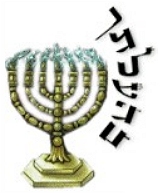
"I believe that God will give us all the strength we need to help us to resist in all time of distress. But he never gives it in advance, lest we should rely on ourselves and not on him alone." — Dietrich Bonhoeffer
06.08.25 (Sivan 12, 5785) Our Torah for this week, called "Beha'alotekha" (i.e., Num. 8:1-12:16), begins with God giving instructions about how Aaron was to attend to the lamps of the Menorah within the Holy Place of the Tabernacle (Num. 8:1-4). Each day Aaron was to clean each of the seven lamps and to refill them with the very purest olive oil. The wicks were then to be bent so that the six outer lamps shined toward the seventh (and central) shaft. The lamps were to be lit daily, "from evening until morning," in a specific sequence - starting from the central lamp (the shamash) and then moving right to left (Exod. 27:21).
According to the Talmud (Shabbat 22b), while all the lamps received the same amount of olive oil, the central lamp miraculously never ran out of oil, even though it was kindled first in the sequence. This miracle is also reported to have occurred during the Temple period, though it abruptly ended about 40 years before the destruction of the Second Temple (c. 30 AD), after the death of Yeshua the Messiah, the true Servant and Branch of the LORD. As attested in the Talmud: "Our Rabbis taught: During the last forty years before the destruction of the Temple the lot ['For the Lord'] did not come up in the right hand; nor did the crimson-colored strap become white; nor did the centermost light shine" (Yoma 39a).
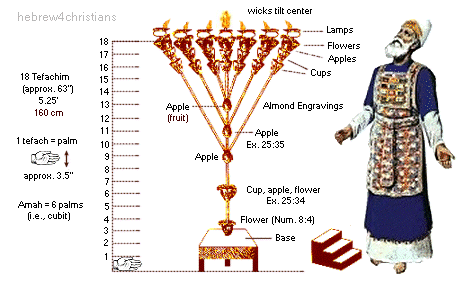 |
The portion then describes how the Levites were to be set apart for service at the Tabernacle (Num. 8:5-12). In a ritual ceremony that signified a sort of "rebirth," the Levites were first sprinkled with mei chachatat (מי חטאת), literally, "the waters of sin" (Num. 8:7), that is, holy water mixed with the ashes of the red heifer sacrifice that was used to purify from contamination with death (Num. 19:13). Next they shaved off all their hair and were completely immersed in a mikveh (i.e., a bath containing flowing or "living" water). Notice that the steps of being sprinkled with purifying water, shaving off of all the hair, and being completely immersed in a mikveh were similar to the ritual for the cleansing of the metzora, or "leper" (Lev. 14:2-32), suggesting that a qualified priest was a "healed leper" of sorts.
The medieval commentator Rashi notes that each member of the community was required to place their hands on the Levites' heads, just as the hands were placed on the head of a sacrificial animal as it was slaughtered before the altar (Num. 8:10; Lev. 1:4, 3:2). The "waving" of the Levites by the High Priest likewise simulated the ritual of "tenufah" (תנופה), that is, the waving of the guilt sacrifice (asham) that was offered by a leper after his or her cleansing (Lev. 14:12). Finally, the Levites themselves laid their hands on the sin and whole burnt offerings for atonement before the LORD (Num. 8:12).
The portion continues with a restatement of law of Passover (Num. 9:1-14), followed by a description of the Cloud of the LORD (i.e., anan Adonai: עֲנַן יְהוָה) that covered the Tabernacle by day and appeared as a pillar of fire (עַמּוּד אֵשׁ) by night. When the Cloud lifted the people would break camp and go to their next location en route to the promised land; when the Cloud settled the people would stop and encamp again (Lev. 9:15-23).
God commanded that two silver trumpets (i.e., chatzortzrot kesef: חֲצוֹצְרֹת כֶּסֶף) were to be made for various purposes, including signaling the people to break camp, assembling the elders of Israel, to signal the arrival of appointed times, as alarms for battle, and so on.
The Cloud of the LORD (ענן יהוה) lifted and the people of Israel then decamped from Sinai on the 20th day of the second second month of the second year after the Exodus from Egypt (Num. 10:11-35). The Ark of the Covenant went out first to scout a location followed by a specific camp order and formation.
Soon after many began to complain of the hardship of the journey, and the Fire of the LORD (אֵשׁ יְהוָה) broke forth and consumed people on the outer parts of the camp. The name of the place was subsequently commemorated as "Taberah" (תַּבְעֵרָה)- "the burning."
Despite the judgment of the LORD, some time later the eirev rav (mixed multitude) craved for Egyptian food and the people of Israel joined them by recalling the "free fish" they ate in Egypt. The people also complained of the monotony of the manna that fell like dew from heaven to feed the people during their journey (Num. 11:1-15). Moses then lamented to the Lord about how hard it was to lead the people, and God then instructed him to appoint 70 elders of Israel to help him lead the people (Num. 11:16-17). As for the people's complaint over the divine menu, the LORD sent an enormous swarm of quail that brought a plague upon the people. Because so many died from the plague, the place was called Kibroth-hattaavah (קִבְרוֹת הַתַּאֲוָה), or the "Graves of Craving" (Num. 11:18-33).
The portion ends with the mutiny of Miram and Aaron regarding Moses' role as the exclusively chosen leader of the people of Israel. They secretly consulted and asked: "Has the Lord indeed spoken only through Moses? Has he not spoken through us also?" The LORD heard their secret conversation and intervened by calling them to appear with Moses before the Tent of Meeting. There the LORD vindicated Moses as the sole leader of Israel because only he speaks "mouth-to-mouth" with God. Miriam was then stricken with tzaarat ("leprosy") and exiled from the camp. Moses prayed for his sister to be healed (אֵל נָא רְפָא נָא לָהּ) but God delayed healing to correct her and to be an object lesson to Israel.
Parashah Themes...
Some themes for this week's reading include the symbolism of the Menorah and the Divine Light; the ongoing need for purification from sin; the role being a priest to one another; the call for holiness in the divine service; the Shekhinah Glory and Presence of God; the direction and leading of God; the tests we face as we journey through desert places; the problem of our complaining hearts; the requirement to live by "daily bread"; the importance of respecting elders; tzaarat and exile from the camp, among others.
The Thirst of Hope...

06.06.25 (Sivan 10, 5785) It sometimes feels like the "samsara" of the desert, a place of exile, the matrix of the world. There is no place I really want to go anymore... I walk with a limp, friends. The Mount of Olives is an enormous cemetery with over 150,000 tombs. Devout Jews think it is a "segulah" to be buried there so that at the time of the resurrection they will be at the center of the action... "In that day His feet will stand on the Mount of Olives, which faces Jerusalem on the east" (Zech. 14:4). That's the focus, to come back to life in the presence of of our beloved Lord Yeshua the Messiah!
The sages say that our father Isaac went blind because the angel's tears fell into his eyes as he lay bound upon the altar... I wonder if he might have later asked himself what use is there to see any more of this world? Nevertheless, and surprisingly, God used his blindness to allow the blessing to be given to Jacob, after all.
Some wounds seem incurable in this present life... God can and does do miracles, but more often he allows us the blessing of learning to endure in our struggles. It can get dark at times, and we can't outrun ourselves. "Cursed be the day wherein I was born!" exclaimed both Job and Jeremiah (Job 3:3; Jer. 20:14). "If this is how you are going to treat me, please go ahead and kill me -- if I have found favor in your eyes -- and do not let me face my own ruin" said Moses (Num. 11:15). The prophet Elijah likewise prayed that he might die: "I have had enough, Lord," he said. "Take my life; I am no better than my ancestors" (1 Kings 19:4).
There is the ideal and the real. Though it is a universal experience, personal suffering can be especially poignant, I think, to souls that seek God's presence and love above all things, for these people are bound to be misfits in this world of vanity and conceit. Soren Kierkegaard is such an example, and he once wrote: "What is a poet? An unhappy man who hides deep anguish in his heart, but whose lips are so formed that when the sigh and cry pass through them, it sounds like lovely music.... And people flock around the poet and say: 'Sing again soon' - that is, 'May new sufferings torment your soul but your lips be fashioned as before, for the cry would only frighten us, but the music, that is blissful."
Jewish philosopher Martin Buber wrote about the loneliness that results from Modern society, which he called an "It-world" that is marked by the prevalence of "I–It" rather than "I–Thou" relationships. The realm of the "institution" objectifies or "thingifies" people, and this bureaucratic "system" creates a sense of existential angst. Trapped in the "It-world," people begin to feel that life is meaningless, as they are numbered among the "faceless crowd" and are enthralled in a Kafkaesque prison of loneliness...
The statistics today are shocking. In a recent poll, nearly 40% of the people surveyed reported that they did not have a close friend. Not one. The "internet" has replaced human intimacy and authentic connection. The "pornogrification" of sexuality is linked to increased rates of depression, loneliness, and feelings of hopelessness. "Artificial Intelligence" and Chatgpt have become robotic surrogates for communion with others. "Is there any body out there?" is the plaintive cry of the postmodern soul. The way out for Buber - and this is surely right - is first to be in a life-transforming relationship with God, the ultimate "I-Thou" connection that will sustain our way despite the hardness of the "It-world." Yeshua taught this truth to use when he said "Seek first the Kingdom of God..." (Matt. 6:33).
Our Lord said: "Blessed are those who hunger and thirst for righteousness..." (Matt. 5:6). Yes, blessed are those who suffer such desperate need, who know inner emptiness, who are not made numb to the ache, and who cry from the heart for deliverance. Blessed are those who are in dread over themselves, who fall as one dead before the Divine Presence, who know they are undone, ruined, and dying for life... The great danger, spiritually speaking, is to become complacent, untouched by poverty of heart, to be lulled asleep, lost within a dream, made comatose, living-yet-dead. The gift of faith first reveals our own lostness and then imparts courage to live with ourselves despite ourselves as we seek God's healing and life...
"Blessed art Thou, LORD our God, who never leaves nor forsakes us, and who draws us close through hunger and thirst." We are truly blessed when we ache with heartfelt longing for the Divine Presence... This is not some form of masochistic spirituality. Feeling content, unconcerned, satisfied, numb, etc., may be a sign of a dreadful condition of heart. "You, God, are my God, earnestly I seek you; I thirst for you, my whole being longs for you, in a dry and parched land where there is no water" (Psalm 63:1).
Hebrew Lesson
Psalm 42:2 reading (click):
Truth and Passion...

06.06.25 (Sivan 10, 5785) During the prophesied "end of days" (אַחֲרִית הַיָּמִים) many people will have an outer "form" (μόρφωσιν) of godliness but will deny its inner power, since their hearts will be turned away from the truth: "And because lawlessness (i.e., ἀνομία, lit. a=without; nomos=Torah) will be increased, the love of many will grow cold" (Matt. 24:12).
In this connection we note that the Hebrew word for "falsehood" (or "lie") is sheker (שֶׁקֶר), which can also be read as shekar (שֶׁקַר), meaning "that which" (-שׁ) makes you cold (קַר). The truth of God can't be known apart from His passion, inner fire, desire.
Indeed, the Hebrew word for "sin" (חֵטְא) means "missing the mark," though that essentially means missing the revelation of God's glory because lesser fears consume the heart and cool the passion for the truth... Let us ask the LORD to better know His heart by kindling his fire within our hearts!
"Be still and know that I Am..." Prayer is a type of listening (shema), a turning back to heed the message of God's love and hope in Messiah. Indeed, the word "teshuvah" (תְּשׁוּבָה), often translated as "repentance," also means an answer or response to a question. God's love is the question, and the heart's response is the answer.
Some of us may find it difficult to trust, to open our heart to receive grace and kindness. For those of us wounded by abandonment, it can be a great struggle to hear the voice of God calling you "beloved," "worthy," "valued," and "accepted." When you find faith to receive God's word of love, however, your heart comes alive and you begin to heal...
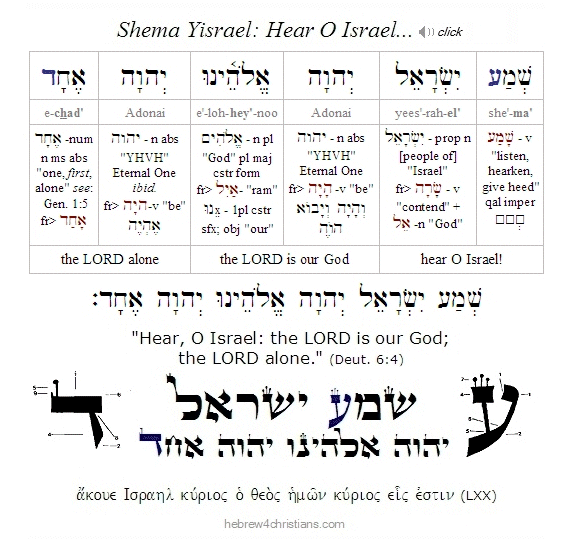 |
Torah of the Sotah...

06.06.25 (Sivan 10, 5785) Our Torah reading this week (Naso) mentions the strange matter of the "sotah," or a woman suspected of adultery, who was taken before the priest to answer the accusation (Num. 5:12-31). If she formally swore to her innocence, the priest poured some holy water from the cistern at the Mishkan into a drinking vessel and then wrote a curse upon a scroll that decreed the woman's sentence if she bore false witness.
After signing the scroll with the Name of God, the priest would immerse the sacred scroll into the drinking vessel so that its words would dissolve into the water. The sotah was then solemnly warned that if she was guilty of adultery, she would die a painful death, though if she was innocent the waters would impart a special blessing of fruitfulness to her. Only after the woman said "amen, amen" to the terms did she drank from the cup...
In general the sages have regarded the matter of the sotah in allegorical terms. Each of us is "married" to God by covenant, and therefore our relationship with him will be tested. Though we have our ideals, we nevertheless are frail and lose sight of our deepest commitments. It is our responsibility to confess the truth about the condition of our hearts. If we stray (שָׂטָה) from our covenant with God, we will taste the bitter waters of the sotah.
Confession is essential for healing, for truth is what connects us with reality. Unsaid words, suppressed feelings, secret desires, hurtful actions, and so on, are "swallowed" by the soul and inevitably affect the heart. We cannot deny the truth without being haunted and made anxious. Regarding our relationship with God, we cannot go astray without becoming hardened and "depressed" by the weight of our own duplicity. If we persist in our denial, we lose the truth about who we are and become poisoned by the bitter waters we drink. As a "sotah," we take the name of the Lord in vain and suffer the consequences...
When the Israelites came to Marah, "they could not drink the water because it was bitter" (Exod. 15:23). Note that the Hebrew text allows us to read that it was the Israelites themselves who were bitter – ki marim hem (כִּי מָרִים הֵם) – "for they (i.e., the Israelites) were bitter," and their bitterness made the water seem so as well.... After the people complained, God showed Moses a tree and threw it into the water, making it drinkable. Interestingly the Hebrew text literally reads, "the LORD taught him a tree" (וַיּוֹרֵהוּ יְהוָה עֵץ), suggesting elon moreh (אֵלוֹן מוֹרֶה), the "teaching tree of Abraham" (Gen. 12:6). The sages say this tree symbolized Torah, the tree of life (etz chaim), which brings happiness to those who take hold of it (Prov. 3:18), though we see Yeshua, the fallen tree that yields mayim chayim - living water - to revive the hearts of all who will receive his remedy.
If we find ourselves inwardly sick, barren, and lifeless, we need to turn back to the Lord and reaffirm our need for truth and love. Only God can heal the depths of our brokenness. The parable of the sotah is intensely personal, exposing the depths of who we are in relationship with God. It's revelation is meant to lead us back into the blessing of the life of his love.
Hebrew Lesson
Psalm 32:5 reading (click for audio):
The Ultimate Reality...

06.05.25 (Sivan 9, 5785) The revelation of God in Yeshua means that Ultimate Reality -- that is, the transcendental Source of all that exists -- is intensely personal, intimately knowable, and full of love. "Metaphysics" (i.e., that which is "really real") is therefore not about an impersonal force known in objective relationship (i.e., a "what") but a personal agency and creative mind known in subjective relationship (i.e., a "who"). The Scriptures teach that what is ultimately real (אהיה אשׁר אהיה) is the Ultimate Person of the LORD (אני יהוה). In Him we "live and move and have our being" (Acts 17:28).
The LORD who is the Most High, the possessor of heaven and earth, is not only the Creator and Sustainer of all possible worlds, but the Lover and Redeemer of our very souls -- the One who empties himself to become "with us" and who overcomes the sickness of death for us... The climactic expression of the character of Ultimate Reality is revealed at Golgotha, the "place of the skull," where God's sacrificial life in Yeshua destroyed death by the greater power of divine love (Psalm 85:10). The heart of our Lord as he suffered and died for our sins reveals the great compassion of God; it is "ha'makom" (הַמָּקוֹם) the place of his atonement for us; his hidden dark cloud, and his resurrection glory reveals our deliverance for death. God loves us despite knowing all of our sins and yet redeems us from its curse...
We "connect" with the truth of who God is by the instrumentality of faith, and the essential question is whether we are in a "trusting relationship" with God or not, for if we do not truly know God as our loving Savior, we remain lost, in darkness, and alienated from the life of God. Faith is self-authenticating as we experience grace in the exercise of our trust in God.
Practically speaking, our relationship with God "shows up" in our lives by means of the various choices we make, though particularly in our moral choices. That's because righteousness is "ontological," or grounded in what is real. Since God is righteous, doing acts of righteousness enables us to partake in God's life and passion (1 John 2:29). On the other hand the practice of sin deadens us and turns us away from God's Presence...
Love is essentially relational, and therefore the Scriptures reveal God as being in relationship both with others within creation, but also within himself - the One God is unity in plurality of relationship: Father, Son, and Holy Spirit (John 17:24). The "I AM" of God (Being) is also known in the "Thou Art" of God (Doing). God is not only the Eternal Lover but also the Eternal Beloved, and the bond of that love is the Spirit of God "hovering above the depths." "Draw near to me, hear this: from the beginning I have not spoken in secret, from the time anything came to be there I AM, and now the Lord GOD has sent me, and his Spirit" (Isa. 48:16). Note in this verse the transpersonal unity of the Godhead....
Now while the Torah certainly affirms that "God is one" (יהוה אחד), note that the word "one" (i.e., echad: אֶחָד) means something more than merely numerical identity (i.e., yechidut: יְחִידוּת) but instead unity in plurality, a "transcendental oneness" that points to the unfathomable mystery of the Name YHVH (יהוה) and the ineffable Godhead (אֵין סוֹף). Moreover, echad primarily means "first" in order or preeminence, for example when the Torah describes the "first day" of creation not as "yom ha'rishon" (יום ראשון), but as "yom echad" (יוֹם אחד; Gen. 1:5). That is why the Shema is not an affirmation of the "mystical pantheistic unity of all things" but rather that the LORD our God is preeminent and alone worthy of our worship and trust. "Hear, O Israel, the LORD our God is one LORD (i.e., unity of the godhead) the LORD alone (i.e., God is first, primary, central, and our greatest good). "God is love" means that he is the Lover, the Beloved, and the Communion of true love
The doctrine of the tripartite-yet-one divine nature (השילוש הקדוש) is not known apart from the revelation of Yeshua, and it is an essential part of His message of redemption to us (see John 17:3). In other words, if you believe that Yeshua embodies and reveals the "Who" of Ultimate Reality, then you will accept his teaching that God is expressed in relationship - the Son in relation to the Father and to the Holy Spirit, and that these three are "echad," or one... "The Father has borne witness of me; whoever has seen me has seen the Father" (John 5:37; 14:9); "I and the Father are one"; "before Abraham was, I am..." "who is the liar but he who denies that Yeshua is the Messiah? This is the antichrist, he who denies the Father and the Son" (1 John 2:22). Believers in the Lord are commissioned to go and make students or learners (תלמידים) of all the nations, baptizing them (i.e., identifying them) in the name of the Father, and the Son and the Holy Spirit" (Matt. 28:19).
Hebrew Lesson
Isaiah 48:16 reading (click):
Truth of the Inward Being...
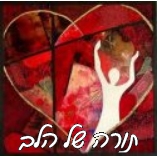
"Strive to enter in (᾽αγωνίζεσθε εἰσελθεῖν) at the narrow gate: for many, I say to you, will seek to enter in, and shall not be able." - Yeshua (Luke 13:24)
06.05.25 (Sivan 9, 5785) It is written in our Scriptures: "As a man thinks in his heart, so is he." We often see what we want to see more than what is really there. That's called wishful thinking. We overlook much, and we often ignore what might challenge our own preferred interpretations. For example, we may think that we are trusting God for our lives, but we worry, we fret, we attempt to control others, we get angry, and so on. We have a blind spot regarding the question whether we are really trusting God, perhaps because earnestly questioning what we actually believe seems too threatening (John 16:31-32). After all, what if we were to discover that don't really know what it is that we believe? Or what if we struggle to believe beyond our prejudices? What if we are confused? What does that say about who we are? So we ignore the real problem (namely, our lack of truth, our deficient faith in God, the fear of what we really are) and go one thinking we are something we are not. In short, we fool ourselves at the expense of truth.
This is a tragic and common failing of human nature. During the Nazi years, many ordinary Germans flatly refused to believe reports of atrocities at the death camps because it was too costly to discover the truth (the same might be said about any patriotic citizens who rationalize the actions of their government regardless of the moral issues involved). By willfully hiding from the facts, we pretend we are not responsible, and therefore we justify passivity in the face of injustice and evil.
Yeshua warned that the time would come when those who kill others will delude themselves into thinking they are doing God a favor (John 16:2). Think of how massively self-deceived such a thing is as that -- to murder someone as a so-called service to God! Many of the biggest enemies of the truth are often those who think they are doing God such "favors."
Hebrew Lesson
Psalm 51:6 reading (click):
Often, however, the truth "of the inward being" is gained at the expense of heartache, for surely the heart must ache, tremble, and despair before it comes to accept the truth about its condition. This sort of truth is "existential," meaning that it is known only through the process of living life itself. As Kierkegaard said, "There are many people who reach their conclusions about life like schoolboys: they cheat their master by copying the answer out of a book without having worked the sum out for themselves." Yes, and they cheat themselves, too, since they somehow believe that "knowing the answer" given by another is the same thing as "knowing the answer" of their own inward being... Kierkegaard continues this thought: "The truth is lived before it is understood. It must be fought for, tested, and appropriated. Truth is the way... you must be tried, do battle, and suffer if you are to acquire truth for yourself. It is a sheer illusion to think that in relation to truth there is an abridgment, a short cut that dispenses with the necessity of struggling for it."
A man who was afflicted with a terrible disease complained to Rabbi Israel that his suffering interfered with his learning and praying. The rabbi put his hand on his shoulder and said, "How do you know, friend, what is more pleasing to God - your studying or your suffering?" (Buber: Hasidim).
In Biblical Hebrew the idea of "inward being" (i.e. tuchot: טֻחוֹת) refers to the "kidneys" which were thought to be "the reins" or the concealed source of the will within the person (i.e., te'ach: טִיחַ). Interestingly, the word te'ach comes from the verb tachah (טָחָה) that means to "shoot with a bow," alluding to the idea of inner Torah as a directive power. God wants purity of the heart – passion, singleheartedness, and earnestness – as we live and practice the truth. God wants "the inner parts," the concealed parts of the soul, to be filled with his Torah, and therefore David asks God to make him to know wisdom there - in the "secret heart" - so that he might apprehend God's truth and do teshuvah that purifies the heart.
Sin and Insanity...
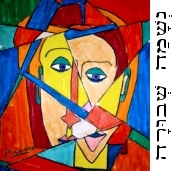
06.04.25 (Sivan 8, 5785) From our Torah reading this week (i.e., parashat Naso) we read, "If any... goes astray and breaks faith..." (Num. 5:12). The sages comment that the Hebrew for "goes astray" (i.e., tisteh: תִשְׂטֶה) is written so it may also be read as "goes insane" (i.e., tishteh: תִשְׁטֶה), and concludes that sin is a form of insanity, that is, a denial of what is real, and therefore a state of delusion.
We are required, as a matter of our faith in the truth of Holy Scripture attested by the Holy Spirit, to believe that God is knowable (Rom. 1:19-20), that we are always in His presence (Prov. 15:3; Psalm 94:9; 139), that He is all-knowing or omniscient (Psalm 147:5), and that nothing can be hidden from Him (Isa. 40:28; Jer. 23:24; Heb. 4:13), but when we sin, we "break from" this reality and deny the divine Presence by a perverse act of self-exaltation.
Whenever we imagine that we are unseen by God or whenever we "forget" that we live, move, and have our being in His presence, we are denying reality (Psalm 14:1). Our sin causes us lose sight of what's real: we forget who God is; we forget who we are; and we exile ourselves from the Source of life... Surely sin is a form of insanity, and therefore we have a moral and spiritual obligation to think clearly and to value truth.
As Rabbi Judah would say, "Contemplate three things, and you will not come to the hands of transgression: Know what is above from you: a seeing eye, a listening ear, and all your deeds being inscribed in a book" (Pirke Avot 2:1). Therefore "fear God and keep his commandments, because this is the whole duty of man. For God will bring every deed into judgment, with every secret thing, whether good or evil" (Eccl. 12:13-14).
Friends, may we "set the LORD always before us" so that we will not be shaken by losing sight of what is real (Psalm 16:8).
Hebrew Lesson
Psalm 19:12 reading (click):
The Paradox of Moses...
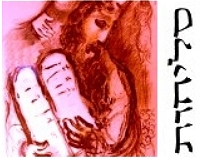
06.03.25 (Sivan 7, 5785) Our Torah portion for this week (i.e., parashat Naso) ends with these amazing words: "And when Moses went into the Tent of Meeting (i.e., the Mishkan) to commune with the LORD, he heard the Voice (הַקּוֹל) speaking to him from above the mercy seat (i.e., kapporet: כַּפּרֶת) that was upon the Ark of the Testimony, from between the two cherubim; and there the LORD spoke to him" (Num. 7:89).
Now Moses was truly an extraordinary and wonderful person -- Israel's first great prophet, priest, and king. His life can be divided into three great distinct periods of 40 years each. First, he was raised as an Egyptian and lived as a prince of Egypt (the Egyptian period); second, he fled to the land of Midian where he became a shepherd and encountered God in the desert (the Midianite period); and third, after the great deliverance from Egypt, Moses led the people back to Sinai where he 1) became the mediator (priest) of the covenant between God and Israel, 2) legislated the various laws of the Torah, and 3) received the prophetic vision of the Tabernacle, the future exile, and the ultimate glory of Zion.
Notice, however, that Moses was extraordinary in the sense that he transcended the entire system of religion that was later established as "Judaism." First, as the great legislator, Moses stood outside of the law, serving as its voice of authority. Second, as the high priest of Israel, Moses instituted various sacrificial rites before the laws of sacrifice were enacted. For example, he instituted the Passover sacrifice in Egypt (Exod. 12:1-11), and when the people later reached Sinai, he offered blood sacrifices to ratify the terms of the covenant (Exod. 24:8). Moreover, he ascended the mountain and received the prophetic vision of the Sanctuary before the priesthood had been instituted in Israel (Exod. 25:8-9). And even after the laws of the priests were enacted and the Tabernacle was erected, Moses was allowed to go before the very Holy of Holies to hear the Voice of the LORD, even though technically speaking this was forbidden, since Moses was not a kohen (i.e., descendant of Aaron).
I mention this because some Jewish people stumble over the fact that Yeshua, who was from the tribe of Judah, served as Israel's High Priest of the New Covenant. Of course this issue is addressed in the Book of Hebrews, where the role of the Malki-Tzedek priesthood is ascribed to King Yeshua (Heb. 5:6-11; 7:1-19), but it is important to realize that Moses himself foresaw the coming of the Messiah as Israel's great prophet, priest and King (Deut. 18:15-19; John 5:36). Indeed, just as Moses himself was "outside" the law by serving as Israel's priest but nevertheless was commissioned by God Himself, so also with Yeshua, who instituted the sacrifice of His blood as the Lamb of God and who went directly before God's Throne to intercede on our behalf.
Like the patriarch Joseph before him, Moses was a "picture" of Yeshua in various significant ways. Though he was a Jew from the tribe of Levi, he appeared as a "prince of Egypt" to his own people and was educated in all the wisdom of the Egyptians (Acts 7:22). And though he was God's chosen deliverer, Moses was initially rejected by the Israelites and then turned to the Gentiles, taking a "foreign" bride. After being severely tested in the desert, he was empowered by God's Spirit to become Israel's deliverer for their hour of great tribulation. Indeed, both Moses and Yeshua were "sent from a mountain of God" to free Israel; both revealed the meaning of God's Name; both spoke with God "face to face." Moses was sent from (physical) Mount Sinai in Midian; Yeshua was sent from a spiritual "Mount Zion" in Heaven (Heb. 12:22). The New Testament relates that Moses and Elijah later met with Yeshua to discuss His "departure," literally, "His Exodus" (τὴν ἔξοδον αὐτοῦ) that he would accomplish at Jerusalem to redeem the entire world (Luke 9:30-31).
Hebrew Lesson
Deut. 18:15 reading (click):
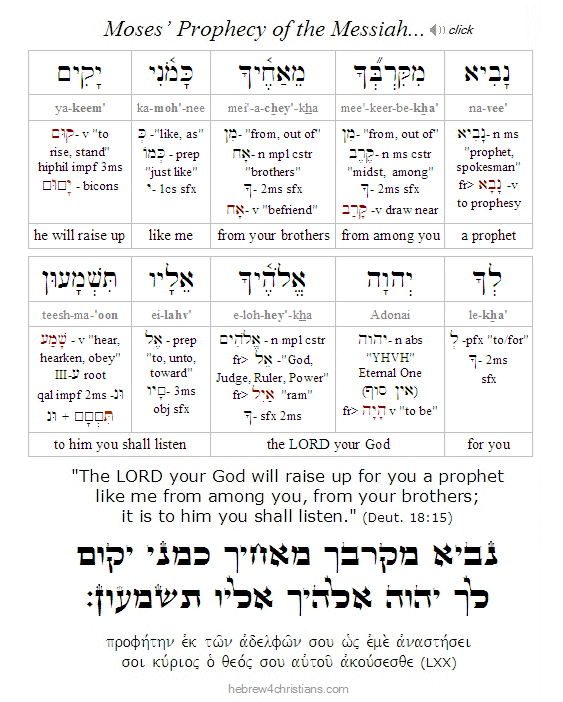 |
Moses foretold of the coming Messiah who would resemble him in many distinctive and remarkable ways. For more on this subject, see:
Teach us to Pray...
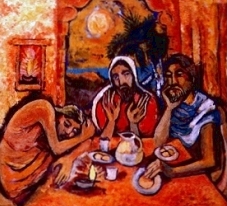
Prayer is not what is done by us, but rather what is done by the Holy Spirit in us.
06.03.25 (Sivan 7, 5785) There is only once place in the New Testament where the disciples asked Yeshua to teach them something, and that was when they said, "Lord, teach us to pray" (Luke 11:1). Yeshua then responded by giving them a pattern of prayer that's been called "the Lord's Prayer," though it's better to think of it as a model for prayer instead of a formulaic petition to recite. After all, the disciples asked "Teach us to pray," not "teach us a prayer," as if a special prayer could serve as a sort of incantation to propitiate God.
Yeshua points us to the Father. He did not suggest using Pharisaical expressions such as "Barukh attah Adonai," "Ribbono shel Olam," or "Elohei Avoteinu," nor did he endorse praying three times a day as decreed by the elders of the Great Assembly. No, Yeshua taught us to come to God using the simple word "Father." This is the language of familiar intimacy that expresses the trust a young child has for his earthly father.
So Yeshua teaches us to pray in heartfelt confidence that God is our caring heavenly Father, and this implies that we understand and regard ourselves as his beloved children. We have access to God's heart in a direct and meaningful way.
As God's beloved children, we are to honor and our heavenly Father and to esteem his will and vision for our destiny. "Holy is Thy name"; "Thy will be done"; "Thy kingdom come" - all these matters come before requests for our "daily bread" -- and even before matters of our need for forgiveness of sin. Our course God cares for our daily needs, our forgiveness, our deliverance from evil, and so on, but Yeshua concentrates our focus on the Father and our identity as his children first of all. Da lifnei mi attah omed: "Know before whom you stand."
Regarding our personal petitions, it is wise to understand that your Heavenly Father gives what you need, not what you may want at the time. "Ask and it shall be given you" means "keep on asking" (Luke 11:9). If a recurring request seems to go unanswered, remember that initial barriers are not necessarily refusals but are meant to yield what is best for you (Rom. 8:28). We can be confident, however, that God hears us when we pray and that he gives "good gifts" to those who ask Him (Matt. 7:11) -- in particular, gifts of the Holy Spirit (Luke 11:13). God gives wisdom to those who ask for it (James 1:5) and imparts the "spirit of wisdom and revelation to know him better" (Eph. 1:17). If we ask in accordance with his will, we have confidence that he will act on our behalf (1 John 5:14-15). These are "spiritual blessings in heavenly places" representing the deepest need of our hearts.
We are instructed to "present ourselves to God as those who are alive from the dead" (Rom. 6:13), indicating that we are to come confident of his acceptance because of what Yeshua has done on our behalf. We are "crucified with Christ" (Gal. 2:20) and share in his resurrection life. In the Torah the "daily sacrifice," or korban tamid (קָרְבַּן תָּמִיד), was offered to the LORD every morning and evening upon the altar, which corresponds to being a "living sacrifice" (i.e., korban chai: קָרְבָּן חַי) to the LORD (Rom. 12:1-2). We are to "pray without ceasing," which means living what we believe in all that we do. We take up our cross daily (Luke 9:23). We come "boldly" before the throne of grace. We are made "alive from the dead" to access God's presence and heart for us at all times. We have been made new creations, members of God's household, esteemed, eternally beloved....
Take my soul and body's powers;
take my memory, mind and will;
All my goods, all my hours;
All I know, and all I feel;
All I think, or speak, or do;
take my heart - and make it new.
- Charles Wesley
Hebrew Lesson
Matthew 6:9b reading (click):
Finding the Path of Life...

06.03.25 (Sivan 7, 5785) Consciously or not, every day billions of people all over the world are seeking that which will satisfy their heart's deepest longings for unending life, unbounded joy, and abiding pleasure. As C.S. Lewis pointed out, this ultimate longing for life is a "message" from another world.
Some believe that life consists of a series of sensual pleasures – eating, drinking, romance, sexual relations, etc., while others attempt to "lose themselves" in various kinds of entertainment. However, such fleeting moments of pleasure invariably cause an inward fragmentation of the soul, thereby weakening the will and inducing a state of forgetfulness regarding the deepest needs of life.
Others are deluded into attempting to find life by means of creating a "legacy" for themselves. To earn respect, to experience fame, or to be heroically remembered is considered the goal of life. However, as Shakespeare poignantly reminds us, human history is at best a "tale told by an idiot, full of sound and fury, signifying nothing."
Still others hope to find life through various placating religious rituals and practices. In Orthodox Judaism, for example, the Orach Chayim is a handbook that meticulously provides a set of rules and regulations regarding sleeping, waking, wearing clothes, reciting blessings, observing Sabbath and the holidays, and so on. The path of life, according to the religionist, is the performance of various ritual acts in order to attain God's approval and blessing.
In Psalm 16:11 we read: "You will show me the path of life; in your presence is fullness of joy; at your right hand are pleasures forevermore." The verb translated "you will show me" is a hiphil (causative) form of yada' (to know) and could better be translated "you will cause me to know," indicating that God is active in the knowing process. Here King David, despite the anxiety he felt regarding death, voiced his trust that God's love would personally intervene to deliver him from the prospect of physical corruption in the grave (v10).
From the New Testament, we know that this verse ultimately refers not to David (who eventually died), but to Yeshua the Messiah, the greater Son of David (Mark 12:35-6, Psalm 110:1). Peter cited this verse in his Pentecost sermon (Acts 2:25-28), as did Paul at Antioch (Acts 13:35-37). Despite the grisly prospect of the crucifixion, Yeshua trusted that God, by raising him from the dead, would not allow him to suffer corruption (Matt. 16:21).
Interestingly, the Hebrew word netzach ("forevermore") denotes both "victory" and "eternity," and reveals that Yeshua's resurrection provides the everlasting victory over the sting of death itself. Yeshua is forever enthroned at the very side of the Majesty on High as the "Key Holder" to life and death (Rev. 1:18).
The ultimate longing we have in our hearts is really a message from God – to come to Him to have our deepest needs met. The true orach chayim is only found in a personal, trusting relationship with the resurrected Savior - Yeshua the Messiah (John 14:6). When we receive the message of His gracious love, our heart's deepest longings will be truly satisfied. We will experience fullness of joy in God's loving presence, and we will enjoy abiding pleasures in our communion with God. Amen.
Hebrew Lesson:
Psalm 16:11 reading (click):
The Fruit of Spirit...
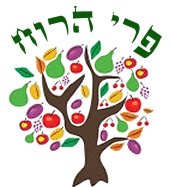
06.02.25 (Sivan 6, 5785) Traditional Jewish chinuch (education) identifies various middot ha-lev (qualities of heart) that attend to a genuinely Jewish life. These include Talmud Torah (studying Scripture), ahavat Adonai (loving God), gemilut chasidim (doing works of compassion), bikkur cholim (visiting the sick), and so on. The follower of Yeshua likewise is intended to evidence middot hav-lev, though the Source for such comes directly from the power of the Ruach Ha-Kodesh (Holy Spirit) working within the heart of faith. The peirot (fruits) listed in Galatians 5:22-23 represent nine visible attributes of a follower of Yeshua, namely: love (אהבה), joy (שׂמחה), peace (שׁלום), patience (סבלנות), generosity (נדיבות לב), kindness (חסד), loyalty (נֶאֱמָנוּת), humility (ענוה), and self-control (שְׁלִיטָה עַצְמִית).
Note that these fruits are decidedly not realized through self-effort or attempts at human "reformation," but rather are a supernatural outgrowth of the grace of God in the life of one who puts their trust in Yeshua as Savior. They are fruits "of the Spirit" (פּרי הרוח), not the result of human effort (see John 15:1-8, Mark 4:26-29). Our lives are sanctified in the manner in which they were justified: entirely by faith in the love and grace and power of God.
The question we must searchingly ask ourselves is whether our lives give evidence to the power and agency of the Holy Spirit within us. Strictly speaking, these nine attributes are qualities that only the LORD God Himself possesses, since He alone is perfectly loving, perfectly joyful, and so on. But since we are created be'tzelem Elohim (in the image of God) and were given the Holy Spirit to help us walk as did our Teacher (Luke 6:40), spiritual fruit should be evident in our own lives (John 14:12; 15:1-8; 26-7). But again, obtaining such fruit is invariably a matter of faith – trusting that God will help us live our lives in truthful union with Him. This is the "work of God" (John 6:28-29).
Let's remember to pray for one another and ask the LORD to make each of us fruitful le'shem shamayim - for the sake of the Name of our beloved One Yeshua.... Amen.
Hebrew Lesson
Proverbs 8:19 reading (click):
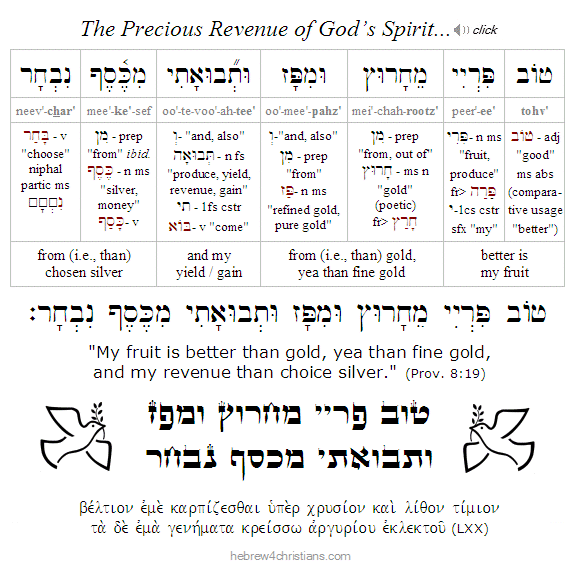 |
The Kingdom Within You...

"I will not leave you orphans; I will come to you..." - Yeshua
06.02.25 (Sivan 6, 5785) "And I will ask the Father, and He will give you another Helper, that He may abide with you forever, namely, the Spirit of truth (רוּחַ הָאֱמֶת), whom the world cannot receive, because it neither sees Him nor knows Him; but you know Him, for He dwells with you and will be in you. I will not leave you orphans; I will come to you..." (John 14:16-18). Note that Yeshua asks the Father for the parakletos (i.e., the one "called alongside"), whom he calls the "Spirit of Truth," to "dwell within" the hearts of his followers so they will be fortified in their mission, and he furthermore identifies himself with the Spirit by saying that he would not leave us as orphans but would come to come to be with us...
I have written before about how Shavuot is called "Atzaret Pesach" (עצרת פסח) or the "culmination of Passover." Just as the Passover reveals "God with us" (עִמָּנוּ אֵל), as the Word made flesh, and "God for us" (אֱלהִים לָנוּ), as the sacrificial Lamb of God, Shavuot adds yet another dimension by revealing "God within us" (אֱלהִים בְּתוֹכֵנוּ), as the indwelling Presence, the "breath of God" that forever abides in our hearts. Yeshua was eager for us to partake of this miracle: "I tell you the truth: it is to your advantage that I go away, for if I do not go away, the Helper (i.e., ὁ παράκλητος, one "called alongside to help) will not come to you. But if I go, I will send him to you" (John 16:7).
As it is written, "By this we know that we live in him and he in us, because he has given us of his Spirit" (1 John 4:13). Or don't you know that your body is a temple of the Holy Spirit within you (רוּחַ הַקּדֶשׁ בְּתוֹכֵנוּ), whom you have from God? "For all who are led by the Spirit of God are the children of God" (Rom. 8:14). Thank God for the help we attain through the Spirit's heartfelt ministrations: "For the Spirit also helps in our weaknesses. For we do not know what we should pray for as we ought, but the Spirit Himself makes intercession for us with groanings which cannot be uttered" (Rom. 8:26).
Amen, thank you Lord Yeshua for the gift of the Holy Spirit within our hearts...
Hebrew Lesson:
Ezekiel 36:26a reading (click):
This week's Torah:
Parashat Naso (פָּרָשַׁת נָשׂא)
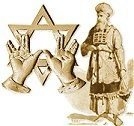
06.01.25 (Sivan 5, 5785) Chag Shavuot Sameach, friends... Among other things, our Torah portion for this week, parashat Naso ("lift up!"), includes the cornerstone blessing that Aaron and his sons (i.e., the priests) were instructed to declare over the people of Israel: "May the LORD bless you and keep you; may the LORD shine his face upon you and be gracious to you; may the LORD lift up his face upon you and give you his peace" (Num. 6:24-26).
Notice that the Hebrew text of the blessing (see below) begins with three words, is comprised of three parts, invokes the divine Name three times, and is therefore appropriately called "the three-in-one blessing" (שלוש בברכה אחת). Notice also that the words are spoken in the grammatical singular rather than plural because they are meant to have personal application, not to be a general benediction over a crowd of people. The phrase, "May the LORD lift up his face upon you..." (ישא יהוה פניו אליך) pictures the beaming face of a parent lifting up his beloved child in joy...
The repetitive construction of God "lifting up His face" (יהוה פניו אליך) indicates that he gazes upon you in love and in blessing. Undoubtedly Yeshua recited this very blessing over his disciples when he ascended back to heaven on Mem B'Omer, though He would have spoken it in the grammatical first person: "I will bless you and keep you (אני אברך אותך ואשמור לך); I will shine upon you and will be full of grace toward you; I will lift up my face toward you and give you my shalom" (see Luke 24:50-51).
יברכך יהוה וישמרך
יאר יהוה פניו אליך ויחנך
ישא יהוה פניו אליך וישם לך שׁלום
ye·vah·re'·khe·kha' · Adonai · ve·yeesh'·me·re'·kha
yah·eir · Adonai · pah·nav · e·ley'·kha · vee·khoon·ne'·kah
yees·sa · Adonai · pah·nav · e·ley'·kha · ve·yah·seim · le·kha · shah·lohm

"May the LORD bless you and keep you;
May the LORD shine his face upon you and be gracious to you;
May the LORD lift up his face upon you and give you his peace."
(Num. 6:24-26)
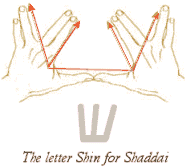
Nesiat Kapayim (Raising of the hands)
Note: The verbs in this blessing are all "jussive," which means they express a wish, desire, or a command, though understood in context (i.e., as part of the blessing recited by the kohanim during ceremonial occasions), the verbs should be regarded as declarative or oracular. To learn more about this blessing, click here.
Parashat Naso Links:
Why Shavuot Matters...
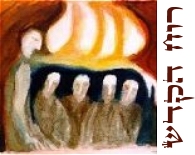
The holiday of Shavuot ("Pentecost") begins Sunday, June 1st at sundown...
06.01.25 (Sivan 5, 5785) The holiday of Shavuot (חג השבועות) is called "Pentecost" in Christian tradition. The Greek word Pentecost (πεντηκοστή) means "the holiday of fifty days" referring to the 50th day after the resurrection of Yeshua when the Holy Spirit descended upon the disciples and when Peter first proclaimed the truth of salvation in Jerusalem (Acts 2:1-43). The Torah teaches that Shavuot is a major biblical holiday (one of the three "required appointed times" of the LORD, see Exod. 23:14-17; Deut. 16:16) and moreover that it is regarded as the climax of Passover itself -- 'the endpoint' of the redemptive experience. Indeed, just as the blood of the lambs smeared on the door posts led directly to Sinai 50 days later, so the crucifixion of Yeshua led directly to the descent of the Holy Spirit to empower His followers to serve God under the new covenant of Zion.
 |
As I've mentioned before, there are two essential priestly rituals commanded for the holiday of Shavuot: 1) the waving (i.e., tenufah: תנופה) of the two loaves of (new) wheat bread (called shtei ha'lechem: שתי הלחם), and 2) the offering of peace sacrifices (i.e., korban shelamim: קורבן שלמים). Both of these aspects of the priestly service (avodah) were fulfilled in the greater sacrifice of Yeshua made on our behalf. Moreover, just as worshipers at the Temple would present bikkurim (בכורים) - their choicest first fruits - and attest to God's faithfulness before the altar (Deut. 26:3), so we are called to walk in the fruit of the Spirit (פרי רוח הקודש) and to proclaim the message of God's faithful love for us.
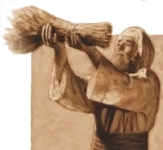
Though it is not explicitly mentioned in the five books of the Torah, the earliest Jewish sages have long connected the revelation of the Torah at Sinai (מתן תורה) with the holiday of Shavuot. This comes from a careful study of the chronology of the exodus itself, calculating the time of the Passover from Egypt (i.e., Nisan 15) to the arrival of the Israelites at Sinai exactly 45 days later, on Sivan 1 (see Exod 19:1). The earliest extrabiblical source that explicitly links Shavuot with the revelation of the Torah at Sinai is the apocyphal Book of Jubilees (i.e., Sefer ha'Yovelim: ספר היובלים), dating from the 2nd century BC. Extant manuscripts of this book were found among the Dead Sea Scrolls (מגילות ים המלח), indicating that the Shavuot-Sinai connection was made before the advent of Yeshua. The Book of Jubilees provides a parallel account of Genesis and certain parts of Exodus, and mentions the observance of Shavuot by Noah before the time of the Flood. In the book Noah is told to observe the Festival of Weeks (shavuot) and to offer Firstfruits (bikkurim) every year as a commemoration of God's covenant to renew the earth (Jubilees 6:15;22). Likewise Abraham and the original patriarchs were said to observe it, though it was forgotten by the Jews in Egypt until Moses was said to have reinstated it at Sinai. Shavuot is also mentioned in the apocryphal Book of Tobit (טוביה) and the Book of Maccabees, c. 2nd century BC.
 |
The Talmud (i.e., traditional teaching of the Torah ) also connects Shavuot with the giving of the Torah. The earliest Talmudic statement on the date of the revelation at Sinai is found in Tractate Shabbat 86b. According to these sages, the Israelites left Egypt on Friday, Nisan 15, and the Torah was given exactly 50 days later on Saturday, Sivan 6th. This corresponds exactly with God's instructions to count 50 days from the day after Passover (Lev. 23:15-16). This date later became fixed in the Jewish calendar, and was further supported by reference to Exodus 19:1: "On the third new moon after the people of Israel had gone out of the land of Egypt, on that day they came into the wilderness of Sinai." (For details about the exact timing for this event, see the main Shavuot article here.) The Midrash Rabbah also explicitly makes the Shavuot-Sinai connection as well. The later rabbis refer to Shavuot as "Atzeret" (עצרת), a word that means "withdrawal" (i.e., to the desert to receive the law) and "conclusion" (or the goal of the Passover redemption). Today Jewish tradition regards Shavuot as Zman Mattan Torateinu (זמן מתן תורתנו) - "the anniversary of the giving of the Torah." Shavuot is also called Yom Ha'Kahal (יום הקהל) - the "Day of Assembly," based on the assembly of all the people of Israel to hear the Voice of God at Sinai (Deut. 18:16).
During the Passover Seder we reaffirm our connection with God's saving deeds by saying that "in every generation each person should consider himself as having personally received the Torah at Sinai." The climax of the Shavuot morning service is the recitation of the famous Akdamut poem followed by the recitation of the Ten Commandments, when all the congregation stands to "relive" the experience at Sinai. A second Torah scroll is then taken out of the ark and the portion is read (Num. 28:26-31) that describes the sacrificial offerings made at the Temple during Shavuot, and the Haftarah (Ezek. 1:1-28; 3:12) concerns the stunning revelation of God in the form of the Throne/Chariot.
The Scroll of Ruth (מגילת רות) - a beautiful story about God's redemptive love - is read on the second day of Shavuot. As the "kinsman redeemer" (i.e., go'el karov: גואל קרוב), Boaz was a wealthy man of the tribe of Judah (Bethlehem) who married a Gentile bride. Boaz's name (בועז) means "in Him [בו] is strength [עז]," a picture of Yeshua the Messiah, his greater Descendant, who also redeemed for himself a bride from among the nations. Among traditional Jews, the Book of Ruth is is read since the events recounted took place during the time of the spring harvest (linking it to the agricultural aspect of Shavuot), and Ruth is a picture of willing acceptance of a Jewish lifestyle (linking it to the events of Sinai).
Paradoxically, the conversion of Ruth was actually against the law given in the Torah itself! According to the Torah (Deut. 23:3), an Ammonite (or Moabite) was forbidden to enter into the family of Israel, and therefore the question arose regarding how Ruth was accepted. Indeed, not only was Ruth accepted, she became the great grandmother of King David through whom the Messiah Yeshua would come (Ruth 4:17). There is a profoundly wonderful message hidden here!
Shavuot is portrayed metaphorically as a marriage ceremony (קִדוּשִׁין) between God and the children of Israel. The LORD is the Heavenly chatan (groom) who said, "Accept Me"; the Jewish people represent the beloved kallah (bride); and the Torah represents the ketubah (marriage contract). In some Sephardic traditions, a ketubah is literally read under the traditional chuppah (חוּפָּה) or wedding canopy, that is set up in the synagogue. Some of the sages note that the idea of marriage comes from the resemblance of the word Shavuot with shevuot (שבועות), the word for "oaths." On Shavuot two oaths were taken. One was from God who pledged that He would not exchange the children of Israel for another people, and the other was from the Jews who pledged they would not exchange God for another deity...
This is analogous to the wedding cup that Yeshua offered us in the upper room, before His crucifixion. The Holy Spirit was given to escort us into the heavenly bridal chamber... Collectively, the followers of the Messiah are called Kallat Mashiach (כלת המשיח) - the Bride of Messiah (Rev 21:2,9), and we eagerly await the marriage supper to come (Rev 19:9).
Shavuot marks the time when God entered into covenant with the Jewish nation. During the first Shavuot at Sinai, God instituted the Mosaic covenant and gave the Torah in written form, but during the Shavuot at Zion, after the resurrection of Yeshua, God established the New Covenant (הברית החדשה) when He wrote the Torah on the hearts of Yeshua's followers.
- Shavuot at Mount Sinai is sometimes considered the day on which Judaism was born. Shavuot in Jerusalem (Mount Zion) is the day on which the church was born when the Holy Spirit was poured out upon the followers of the Messiah Yeshua.
- Just as the resurrection of Yeshua represents the Firstfruits of those who have died (1 Cor. 15:20) and fulfills the prophetic ritual of the waving of the omer on the festival of First Fruits, so the giving of the Holy Spirit to the followers of Yeshua fulfills the wave offering of the leavened wheat loaves on the day of Shavuot.
- At Mount Sinai the Ten Commandments were written on tablets of stone by the "finger of God" (Exod. 31:18), but at Mount Zion, the Torah is written on tables of the heart by the Spirit of God (2 Cor. 3:3; Heb. 8:10).
- Just as the Israelites were affirmed as God's chosen people on Shavuot with the giving of the Torah, so the followers of the Messiah are affirmed as God's chosen people at Shavuot after Yeshua's ascension into heaven as the Mediator of a Better Covenant (Hebrews 8:6). The 3,000 that were added to the church that day were firstfruits of the redeemed people of God.
Again, the holiday of Shavuot is one of the shelosh regalim (three pilgrimage festivals) given in the Torah (Exod. 23:14-17; Deut. 16:16) and therefore reveals profound spiritual truth for followers of Yeshua (Luke 24:44; 2 Tim. 3:16). God did not want us to miss the significance of this holiday, since it expresses the freedom and truth of the New Covenant of Zion. Friend, may this be a time of renewal and great joy in your life....
Hebrew Lesson
Exod. 34:22a reading (click):
Eschatology and Shavuot...
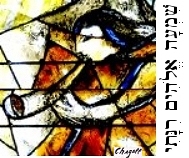
The festival of Shavuot (חג השבועות) begins at sundown... Happy Shavuot Holiday, friends!
06.01.25 (Sivan 5, 5785) Some people see the ultimate fulfillment of the holiday of Shavuot (i.e., "Weeks" or "Pentecost") to be found in the mysterious catching away (ἁρπάζω, harpazo) of believers before the time of the "Great Tribulation" and the Great Day of the LORD (1 Thess. 4:17; John 14:3; 1 Cor. 15:51-52). They reason that since Shavuot marked the day of dramatic revelation, with signs of fire and the sounds of a heavenly shofar blast, an appointed time that marks the jubilee fulfillment of Passover, it can therefore be seen as the rapturous end of redemption for those who believe, symbolic of a wedding day, when God betrothed Israel as His own people, separate from all others. Both Jew and Gentile will be "waved" before the LORD (as symbolized by shtei ha-lechem, the two loaves), representing the "one new man" of kallat Mashiach, the "bride of Messiah," or the assembly of those called out from every tribe and tongue to be a part of God's heavenly kingdom.
 |
Though no one knows the day or hour of the return of Yeshua our Messiah (see Matt. 24:36; Acts 1:7), there are clues given in Scripture about the conditions of the world before His return, and Yeshua himself gave us parables admonishing us to actively be looking (Matt. 24:2-14; 25:1-13). The Apostle Paul said that followers of the Lord can know the "season" of Messiah's return, and warned that He will come "as a thief in the night" - not in the revelation of great power and overwhelming glory at the end of the age (1 Thess. 5:2-6). Moreover, Paul forewarned of the rise of worldwide godlessness (2 Tim. 3:1-7) and even of the flagrant apostasy of the "institutionalized" church (1 Tim. 4:1-3), which is of course evident today... Other Scriptures foretell of a coming One World Government, the rise of the "Messiah" of evil (Antichrist) who will enforce a worldwide "security state" (Dan. 11:38), the persecution of the national Israel (a nation that had been miraculously restored to the promised land), the rebuilding of the third Temple, the coming Great Tribulation, and so on. "When these things begin to take place, straighten up and lift up your heads, because your redemption is drawing near" (Luke 21:28).
Regarding the destiny of the "world system," however, we have quite a different vision... The LORD God Almighty has vowed to break the pride of the "kings of the earth" with a rod of iron and dash them in pieces like a potter's vessel, and the shattering will be so ruthless that among its fragments not a shard will be found with which to take fire from the hearth, or to dip up water out of the cistern (Psalm 2:9; Isa. 30:14). For from His mouth comes a sharp sword with which to strike down the nations, and He will rule them with a rod of iron. He will tread the winepress of the fury of the wrath of God the Almighty (Rev. 19:15). Nebuchadnezzar's great dream will soon be fulfilled: "As you looked, a Stone was cut out by no human hand, and it struck the image on its feet of iron and clay, breaking them in pieces. Then the iron, the clay, the bronze, the silver, and the gold, all together were broken in pieces, and became like the chaff of the summer threshing floors; and the wind carried them away, so that not a trace of them could be found. But the stone that struck the image became a great mountain and filled the whole earth" (Dan. 2:34-35). "And the God of heaven will set up a kingdom that shall never be destroyed ... and it shall stand forever" (Dan. 2:44). One day the edifice of man's godless pride will come crashing down, and there will be no trace left of its rubble... Amen; even so, come quickly, Lord!
Hebrew Lesson
Psalm 47:5 Hebrew reading:
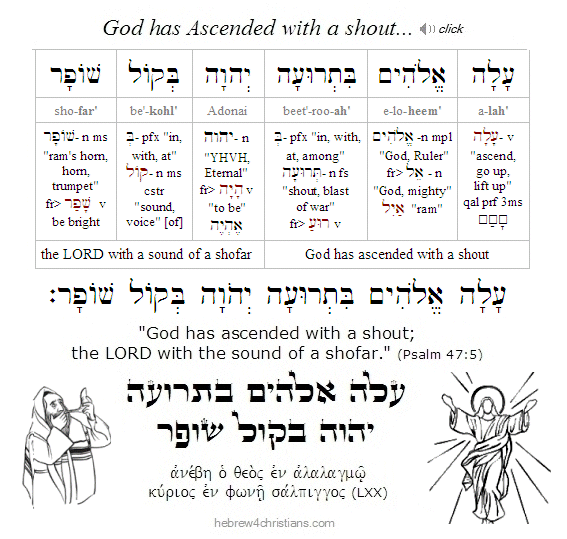 |
May 2025 Site Updates
Yeshua the True Vine...

The holiday of Shavuot ("Pentecost") begins Sunday at sundown...
05.31.25 (Sivan 4, 5785) "I am the true vine, and my Father is the Gardener. Every branch in me that does not bear fruit he takes away, and every branch that does bear fruit He purges (καθαιρει), that it may bear more fruit" (John 15:1-2). In other words if you bear fruit you will experience the "purging process," and that means suffering affliction...
This might seem to you somewhat backward: Why does the fruitful branch need to be cut back? Indeed, the promise of suffering is not meant for an evil person, but for the righteous soul who trusts in God. Purging is painful but it is also purifying, yielding new growth within our hearts. Yeshua taught, "Blessed are the pure in heart, for they shall see God" (Matt. 5:8). The Greek word translated "pure" is katharos (καθαρoς), sometimes used describe the cleansing of a wound (catharsis), or to describe the unalloyed quality of a substance revealed through refining fire.
We "rejoice" in testing because that is the way of real growth, sustained hope, and the revelation of God's deep love (Rom. 5:3-4). In our afflictions we are given heavenly consolation that helps us to persevere (2 Cor. 1:3-5). Remember that we are being weaned from this present age to be made ready for heavenly glory, for things unimaginably wonderful, soon to be revealed to you. Stay tuned, friends: the best is yet to come!
Yeshua warned us, however, that "if anyone does not live in Me, he is cast off as a branch, and withers..." (John 15:6). We find life only as we remain connected to the Source and Conduit of life, who is the Messiah, the Savior and LORD. True life grows out a heart connection with Yeshua, and without that connection our lives become vain and will yield no eternal significance (John 15:5). Indeed, if you reject the Vine you will be destroyed, since life is found in no other Source (John 14:6; Luke 3:9).
But be encouraged, trusting friend: we cannot create new life by our own efforts or effect regeneration by means of our own "good works." No, the work of salvation is God's alone, and we partake of that work as we abandon our self-efforts and religious conceits (see Isa. 32:17; Mark 4:26-29).
There remains, therefore, a Sabbath for the people of God, "for whoever has entered God's rest has also rested from his works as God did from his" (Heb. 4:9-10). This "deep Sabbath" is a matter of trusting that the work of salvation has been accomplished on your behalf. Therefore "strive to enter into that rest," for the LORD always effects what is best for you. The path of peace is to surrender to God's care for your life and let the evils and drama of the world flow past you. This is "the work of faith."
Look to heavenly reality and not to the vanity and deceits of this world (Col. 3:1-4); live in Yeshua's Presence, drawing strength and vitality from your relationship with Him. The fruit of the Spirit is produced as we yield ourselves to the love and presence of God.
Hebrew Lesson
John 15:1 reading (click):
Heeding the Father's Voice...
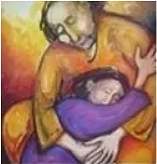
The giving of the Torah is connected with the holiday of Shavuot ("Pentecost"). This is derived from the chronology of the Exodus itself: the Passover (on Nisan 15) to the arrival at Mount Sinai (on Sivan 1) took 45 days (Exod. 19:1). Four days later God spoke "I AM" to Israel (Exod. 20:2).
05.30.25 (Sivan 3, 5785) Recall that God promised his people that they would experience heart change by the power of His Spirit: "Behold, the days come, says the LORD, that I will make a new covenant (ברית חדשׁה) with the house of Israel, and with the house of Judah, not according to the covenant that I made with their fathers in the day that I took them by the hand to lead them out of the land of Egypt, My covenant which they broke, though I was a husband to them, says the LORD. But this is the covenant that I will make with the house of Israel after those days, says the LORD: I will put My law (i.e., Torah) in their minds, and write it on their hearts; and I will be their God, and they shall be My people" (Jer. 31:31-33). Recall also that it was on the appointed time of Shavuot (i.e., "Pentecost"), 50 days after the resurrection of our Lord, when the disciples of Yeshua received the promise of the Holy Spirit and the Torah of God was written upon their hearts (see Acts 1:7-8; 2:1-4).
Just as the advent of Messiah signified the time of God's redemption of his people, so the advent of the Holy Spirit (רוּחַ הַקּדֶש) signified the time of their regeneration as God's children. Among other things, the role of the Spirit is to convict people of sin, to reveal the truth of salvation in Yeshua, and to empower believers of Yeshua to bear fruit that glorifies God.
Surely our great need is to have heart, to find strength, resolution, and steadfast determination to walk boldly during these heartless and depraved days (2 Tim. 3:1-5). We are not without God's help, of course. Yeshua told us that the Ruach HaKodesh (רוּחַ הַקּדֶשׁ) would be "called alongside" (παράκλητος) to comfort us on the journey. The English verb "comfort" literally means "to give strength" (from com- ["with"] and fortis ["strong"]), an idea similarly expressed by the verb "encourage," that is, to "put heart [i.e., 'core'] within the soul." In Hebrew, the word courage is expressed by the phrase ometz lev (אמֶץ לֵב), meaning "strong of heart," denoting an inner quality of the will rather than of the intellect. Ometz lev means having an inner resolve, a passion, and a direction. The sages say "the mind is the eye, whereas the heart is the feet." May God be our Light and Salvation as we walk through the surrounding darkness... Amen.
"Dear child of mine, do not forget my Torah (תורתי), but let your heart keep my commandments (מצותי). Doing so will add to you length of days (ארך ימים), long life, and peace (שׁלום). Do not abandon the heart of Your Father by losing sight of mercy and truth (חסד ואמת); No! Tie them around your neck; inscribe them upon the table of your heart (לוח לבך), that is, make them part of your inner being and will. Doing so will reveal my grace (חן) and good understanding (שכל־טוב) before the eyes of God and others. Trust in your heavenly Father with all your heart (בטח אל־יהוה בכל־לבך) and don't seek to be in control, trying to figure everything out on your own (ואל־בינתך אל־תשען). Listen for your Father's voice in everything you do; in all your ways know His heart (בכל־דרכיך דעהו), and then your ways will be directed in the truth. Don't assume that you know it all; abandon your self-conceit: Revere your heavenly Father (ירא את־יהוה) and flee from what you know is self-destructive and evil! Doing so will impart healing (רפאות) to you: your body will glow with health, your very bones will vibrate with life! Honor your Heavenly Father with everything you own; give him your first and the best of what you have; then your barns will burst with plenty, and your wine vats will be overflowing" (Prov. 3:1-10).
Hebrew Lesson:
Proverbs 3:1 reading (click):
The Torah of Shavuot...
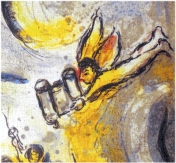
05.30.25 (Sivan 3, 5785) The importance of the Torah, or "law" of God, cannot be overstated, friends, and the holiday of Shavuot recalls and celebrates its importance in our lives. Yeshua plainly said to his followers: "Do not think that I have come to abolish the Law or the Prophets; I have not come to abolish them but to fulfill them. I tell you the truth, until heaven and earth pass away not the smallest letter or even a stroke of a letter (קוצו שׁל יוד) will pass from the law until everything comes to pass. So anyone who breaks one of the least of these commands and teaches others to do so will be called least in the kingdom of heaven, but whoever obeys them and teaches others to do so will be called great in the kingdom of heaven" (Matt. 5:17-19). He further solemnly warned: "Not everyone who says to me, 'Lord, Lord,' will enter into the kingdom of heaven– only the one who does the will of my Father in heaven. On that day, many will say to me, 'Lord, Lord, didn't we prophesy in your name, and in your name cast out demons and do many powerful deeds?' Then I will declare to them, 'I never knew you. Go away from me, you workers of lawlessness' (Matt. 7:21-23).
To the ungodly, "freedom" means being lawless, that is, acting under their own authority apart from the will of God. This of course was the original temptation in Eden, when the nachash (serpent) told Eve that if she acted under her own authority, her eyes would be "opened" and she would be "like God," knowing both good and evil (Gen. 3:5). That is always the creed of the wicked: "Do as thou wilt..." True freedom, however, is not the supposed right to do whatever you want, but instead is the power to do what is right, living in harmony with moral reality, and being liberated from the slavery of impulses to do evil. The law of God, then, is the blessing of having boundaries, order, and moral sanity within our lives, and that is why the Holy Spirit inscribes the law "within" us - to help guide our steps, protect our way, and to empower us to live in obedience to the truth of God (Jer. 31:33). If you are led by the Spirit, you are no longer enslaved to the law of sin and death -- that is, the lower nature and its idolatrous impulses -- but you will bear the fruit of righteousness, goodness and truth (Gal. 5:18; Eph. 5:9). Let no one deceive you with vain words. You cannot serve two masters... If you know that the Messiah is righteous, you know that every one that does righteousness is born of God (1 John 2:29).
God did not send the Savior to suffer and die on the cross so that people would disregard his moral will and go right on sinning. No, by his sacrifice Yeshua delivers us from the power of sin and death and thereby empowers us to do his will: "For we are his workmanship, created in Messiah for good works that God prepared beforehand" (Eph. 2:10). Followers of Messiah are to be "filled with the knowledge of his will in all spiritual wisdom and understanding, to live our lives in a manner worthy of the Lord, fully pleasing to him, bearing fruit in every good work and increasing in the knowledge of God" (1 Cor. 1:9-10). Therefore the message of Shavuot is that we should walk worthy of God, who has called us unto his kingdom and glory (1 Thess. 2:2). Chag Shavuot Sameach.
Hebrew Lesson
Psalm 119:97 reading with commentary (click):
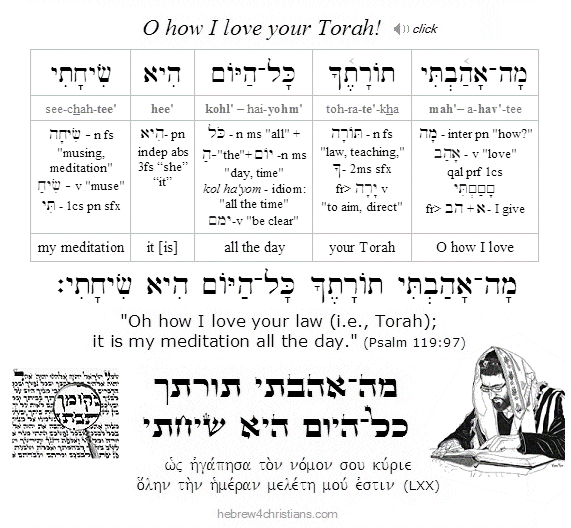 |
Ruth and the Redeemer...

"Every teacher of the Torah who becomes a disciple in the Kingdom of Heaven is like a homeowner who brings from his storeroom new gems of truth as well as old." - Yeshua
05.30.25 (Sivan 3, 5785) Shalom friends. During the season of Shavuot we read the Book of Ruth (מגילת רות), which tells the story about redeeming love and the advent of King David. Recall that King David was a direct descendant of Ruth, who as a Moabitess was an outsider and "stranger" to the promises of God (Ruth 4:17; Eph. 2:12). Despite being part of an despised and rejected group of people (see Deut. 23:3), Ruth overcame the law's demand by believing in the love and acceptance of a redeemer of Israel (Ruth 3:9). Ruth's great grandson was named David (דָוִד), meaning "beloved," which has the same numerical value as the word "hand" (יָד). It is no wonder that the LORD chose David to represent God's extended hand of love for the stranger, for the convert, for the outsider, the leper, and the lost, since his descendant Yeshua the Messiah came to love and redeem the entire world by means of His outstretched hands.
Now while the narrative of the Book of Ruth is straightforward, to fully understand its spiritual implications we need to be familiar with several laws from the Torah, including the laws of redemption (Lev. 25:32-55), the laws of Shemittah and Jubilee years (Lev. 25:4, 10, 23), the laws of family inheritance (Num. 27:8-11), the laws of yibbum or "levirate marriage" (Deut. 25:5-10), and various farming laws regarding leaving food for the poor and the stranger (Lev. 19:9-10; 23:22; Deut. 24:19). In addition, we need to understand the laws of warfare for taking possession of the land, and God's repeatedly stated commandment that Israel must be holy and not assimilate with surrounding cultures (Exod. 34:12; Deut. 7:1-6; 14:2, etc.). This restriction applied not only to the seven Canaanite nations (Deut. 7:1; 20:17-18), but also to the descendants of Lot (i.e., Amnonites and the Moabites), since they showed enmity to Israel when they first came to the land (Deut. 23:4-6). Indirectly, then, the story of Ruth provides a strong message to Christians: to follow the story of redemption, you must understand the Torah and its commandments! Amen...
Hebrew Lesson
Ruth 1:16a reading (click):
The Jubilee of Shavuot...

The festival of Shavuot (חג השבועות) begins Sunday, June 1st at sundown this year...
05.30.25 (Sivan 3, 5785) Saturday, May 31st (at sundown) signals the end of the 49 days of counting the omer, and therefore the following day is the "Jubilee" of Shavuot (i.e., "Weeks" or "Pentecost"). Recall that the Torah instructed (Lev. 23:15-16) that we count from the day following Passover (i.e., Nisan 16) for exactly seven weeks, until Sivan 5 (i.e., from April 14th through May 31st this year). On the 50th day (i.e., Sivan 6), a special celebration was to be observed. This annual "countdown period" recalls both the time from the Passover until the revelation at Sinai, and the advent of the Holy Spirit (רוח הקודש) among Yeshua's disciples in Jerusalem (Acts 2:1-4).
According to the sages, the festival of Shavuot marks the culmination of the experience of redemption, sometimes called Atzeret Pesach (עצרת פסח), or the "conclusion" of Passover. Since the Exodus from Egypt was intended to lead to the revelation given at Sinai, the goal of Passover was the giving of the Torah to the Jewish people.
In other words, the LORD took the Jewish people out of Egypt so that they would be His own treasured people, holy and separated from the pagan cultures around them, living in the light of great revelation. Indeed, all of the holidays of the biblical calendar are connected with this event, including the fall festivals of Rosh Hashanah, Yom Kippur and Sukkot.
During the holiday of Shavuot, it is customary for young adults to recommit themselves to Talmud Torah (the study of Torah) and to renew their decision to live as faithful Jews. In addition to formal "confirmation ceremonies" often scheduled at synagogues, some other Shavuot customs include decorating the home and synagogue with greenery, eating dairy foods and sweets (as samples of the "milk and honey" of the promised land), and staying up the entire night of Shavuot to read selections from the Torah and from the Talmud (this custom is called tikkun leil ha'shavuot: תיקון ליל השבועות, "Rectification for Shavuot Night"). For the Messianic Jew, Shavuot is the time of celebrating the birth of kallat ha'Mashiach (כלת המשיח) - the Bride of the Messiah (or the new covenant assembly), since the fire of the Ruach HaKodesh (Holy Spirit) was poured out to the believers in Yeshua during this time.
 |
At the synagogue, it is customary to start the Shavuot evening service later than usual, to ensure that the 50th day has arrived (see "counting the omer"). As mentioned above, many people stay at the synagogue throughout the entire night listening to poems and favorite portions of Scripture, or reading from a special book (sefer tikkun leil ha'Shavuot) that includes key verses of each Torah portion and passages of each tractate of the Mishnah. This custom is observed to "repair" the night of Shavuot from the error of sleeping so soundly before the Torah was revealed at Sinai that God had to awaken the Jews with piercing shofar blasts, thunder, and lightning the following morning (Exod. 19:16).
Jewish tradition teaches be'chol dor vador (בכל דור ודור) - that in every generation each person should consider him or herself as having personally been delivered from Egypt to receive the Torah at Sinai. The climax of the Shavuot morning service is the recitation of the famous Akdamut poem followed by the reading of the Ten Commandments, when all the congregation stands to "relive" the experience at Sinai. A second Torah scroll is then taken out of the ark and the portion is read (Num. 28:26-31) that describes the sacrificial offerings made at the Temple during Shavuot, and the Haftarah (Ezek. 1:1-28; 3:12) concerns the amazing revelation of God in the form of the Throne/Chariot.
The Scroll of Ruth (מגילת רות) - a beautiful story about God's redemptive love - is traditionally read on the second day of Shavuot. As the Goel (kinsman-redeemer), Boaz was a wealthy man of the tribe of Judah (Bethlehem) who married a Gentile bride. Boaz's name means "in Him is strength," a picture of the Yeshua the Messiah, his greater Descendant, who also redeemed for himself a bride from among the nations. Among traditional Jews, the Book of Ruth is is read since the events recounted took place during the time of the spring harvest (linking it to the agricultural aspect of Shavuot), and Ruth is a picture of willing acceptance of a Jewish lifestyle (linking it to the events of Sinai).
The holiday of Shavuot is one of the shelosh regalim (שלוש רגלים) or three major "pilgrimage festivals" commanded in the Torah (see Exod. 23:14-17; Deut. 16:16) and therefore it reveals profound spiritual truth for followers of Yeshua (Luke 24:44; 2 Tim. 3:16). God did not want us to miss the significance of this holiday, since it expresses the blessed truth of the New Covenant of Zion. From my family to you: Chag Shavuot Sameach (חג שבועות שמח) - "Happy Shavuot!" May this be a time of renewal and great joy in your lives...
Hebrew Lesson
Jeremiah 31:33 reading (click for commentary):
The Whispering Word...

The following is related to our Torah reading for this week, parashat Bamidbar...
05.30.25 (Sivan 3, 5785) The Hebrew word midbar (מדבר), "desert," shares the same root as davar (דּבר) which means "word." We often need to be alone to hear God speaking kol demamah dakkah (קול דממה דקה) - "the sound of a low whisper" (1 Kings. 19:12), and the journey into the desert was God's way of separating His people to speak with them "privately," so to speak (Jer. 2:2).
But to hear the word we must humble ourselves, and the desert (i.e., "word") of Sinai is therefore first of all the word of humility (ענוה). When God spoke Torah to Israel, it was from a nondescript mountain - a place of emptiness, brokenness and need. Indeed, another word for Sinai is "chorev" (חרֵב), a word that means dryness and desolation. That is the starting point -- not the lush places of a future paradise.
We receive Torah "bamidbar" because we can only hear God's davar in a place of lowliness and inner quiet. God brings us to an arid place -- inhospitable, and dangerous -- to reveal our need for Him, to show Himself as our Sustainer. The way through the desert of Sinai teaches us to persevere in our vision for the greater hope of Zion. May the LORD our God help us heed the whisper of His Spirit...
Hebrew Lesson
Psalm 143:8 Hebrew reading:
Torah of Surrender...
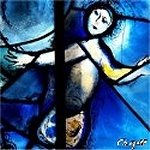
"If you can't fight and you can't flee, flow..." - Robert Elliot
05.30.25 (Sivan 3, 5785) When we pray to God, "Thy will be done," are we willing to forego our desire and accept whatever might happen? Do we truly believe what we pray? "Thy will be done -- over this wish, this sorrow, this fear, this dear hope? Are we actually trusting in hte Lord's care for our lives? The prophet cries out: "Who has directed the Spirit of the LORD, or being his counselor has taught him?"(Isa. 40:13). He is our God, and we are sheep in his pasture, if we obey his voice (Psalm 95:7).
If we find ourselves habitually complaining or murmuring about the course of our lives, are we not belying our prayers? Nay, are we not resisting his will? Is not our sullenness or disappointment an oblique accusation that God is not to be trusted with whatever happens, whether it be good or bad? Is not such a complaint, in its essence, tantamount to the demand: "I want it my way"?
C.S. Lewis warned: "Hell begins with a grumbling mood, always complaining, always blaming others... but you are still distinct from it. You may even criticize it in yourself and wish you could stop it. But there may come a day when you can no longer. Then there will be no 'you' left to criticize the mood or even to enjoy it, but just the grumble itself, going on forever like a machine. It is not a question of God "sending us" to hell. In each of us there is something growing, which will BE hell unless it is nipped in the bud" (Great Divorce). "Perhaps my bad temper or my jealousy are gradually getting worse - so gradually that the increase in seventy years will not be very noticeable. But it might be absolute hell in a million years!"
There is a Torah of surrender we must offer: "Be still and know that I am God..." (Psalm 46:10). The Hebrew means to be inwardly silent, to let go of your desire to control... This is something you must do; you must shush your heart to know the Divine Presence. Therefore "set the Lord always before you" (Psalm 16:8) and refuse any anxious thought to weigh in upon you, creating pressure and "dis-ease." Let go of your will. Give up. Confess your ambiguous desires; abandon the insanity of your self-rule. Quieting your heart allows you to hear the holy Spirit's whisper: "It is I; do not be afraid..." Once the sibilance of fear dissipates, you can access the truth of God. The Spirit asks us to do teshuvah: "In returning and rest you shall be saved; in quietness and in trust shall be your strength" (Isa. 30:15).
So much of life is beyond our control, and it exhausts us when we try to wrestle against the Angel. When we let go of our will, surrendering to God, we find peace as our circumstances and destiny are carried into the "heavenly flow" of God's providential design. "The LORD shall fight for you, and you shall be made silent" (Exod. 14:14).
Are we not often at odds within ourselves? There is an inner antagonism that we experience, ambivalence, double-mindedness, and even despair. We may tend to regard life as a challenge to be conquered, but when we fail (as we assuredly will), anxiety arises over our losses. We should be shaken to our core, for only God's power can deliver us from ourselves.... It's a matter of utmost significance. Find God or die.
Worry is a place of exile and pain. Since God's Name (יהוה) means "Presence" and "Love," being anxious is to practice the absence of God's presence instead of practicing his presence... A divided house cannot stand. Where it is written, "cast all your anxiety on him because he cares for you" (1 Pet. 5:7), the word translated "anxiety" comes from a verb that means to divide into pieces. Bring your brokenness to God – including those distractions that make you ambivalent and afraid – to receive God's healing for your divided heart.
"Be still and know that I am God..." (Psalm 46:10). The Hebrew verb translated "be still" (i.e., rapha: רפה) means to "let go," to stop striving, stop conniving, and to surrender absolutely everything to the care of God (Rom. 8:28). "Being still" means letting go of your supposed "need" to control the world. Therefore telax your hold and rely on God's care for your life instead, without "taking thought" for tomorrow and its concerns (Matt. 6:34). The past is gone, after all, and the future is God's business: all you have is the present moment to call upon our Lord. Be faithful in the present hour, then, asking God for the grace and strength you need to endure yourself and engage the task at hand. In this way you will experience the peace of God "which surpasses all understanding" (Phil. 4:7).
Walking with God isn't just a matter of "head education," but also of "heart education," and these two must always go together as Spirit and Truth (John 4:23). Head education seeks knowledge primarily as a means of defining what you believe (emunah); heart education, on the other hand, centers on fear, or rather, on overcoming your fear by trusting in God's love and healing grace (bittachon). When you accept that you are accepted despite yourself, you are delivered from the need to defend yourself. You can let go, quit denying who you are, and accept God's unconditional care for your life – regardless of the state of the world. When your heart learns to "be still," you can know that the Lord your God reigns over all things! As Yeshua said: "Come unto me, all ye that labor and are heavy laden, and I will give you rest. Take my yoke upon you, and learn of me; for I am meek and lowly in heart: and ye shall find rest unto your souls. For my yoke is easy, and my burden is light" (Matt. 11:28-30).
"Be still and know that I am..." Prayer is a type of listening (shema), a turning back to know the message of God's love and hope in Messiah. The word "teshuvah" (תְּשׁוּבָה) means an answer or response to a question. God's love is the question, and the heart's repose is the answer. Some of us may find it difficult to trust, to open our heart to receive grace and kindness. For those wounded by abandonment, it can be a great struggle to hear the voice of God calling you "beloved," "worthy," "valued," and "accepted." When you find faith to receive God's word of love, however, your heart comes alive and you begin to heal... Yeshua speaks words of comfort: "Blessed are those who have not seen and yet still believe."
"God grant me the serenity
to accept the things I cannot change;
courage to change the things I can;
and wisdom to know the difference.
Living one day at a time;
enjoying one moment at a time;
accepting hardships as the pathway to peace;
taking, as He did, this sinful world
as it is, not as I would have it;
trusting that He will make all things right
if I surrender to His Will;
that I may be reasonably happy in this life
and supremely happy with Him
forever in the next. Amen." - Reinhold Niebuhr
Hebrew Lesson:
Psalm 46:10 reading (click):
Assured by Love's Promise...
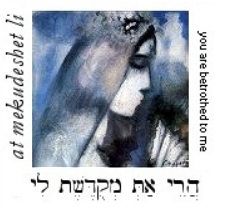
"Grace is not looking for good men whom it may approve, for it is not grace but mere justice to approve goodness. [Rather] it is looking for condemned, guilty, speechless and helpless men whom it may save, sanctify and glorify." - C. I. Scofield
05.29.25 (Sivan 2, 5785) Right now, as you are seeing this, take a moment to reaffirm that the Lord Yeshua is your deliverer and that you trust in Him for eternal life. He promises the trusting heart: "I tell you the solemn truth, the one who hears my message and believes in the One who sent me has (i.e., present active indicative) eternal life and will not be condemned, but has passed over (literally, "crossed over") from death to life" (John 5:24).
Note that the verb translated "has passed over" is "perfect active" that expresses completed action: "this one has already crossed over from death to life." In other words, the gift of eternal life is an accomplished reality (though it is only experienced as we truly surrender to the love and grace of God from a heart of faith). The "basis" of life is now radically new and of a different order. As the apostle Paul later summarized: "For it is by grace you have been saved (i.e., a perfect passive participle that denotes completed action done on your behalf with effects that continue to the present) through faith, and this is not from yourselves, it is the gift of God, not a result of works, so that no one may boast" (Eph. 2:9-10). I'm so glad it's not the strength of my grip that keeps me holding on to God, but the strength of His...
So "be strong and of good courage" – chazak ve'ematz! The Lord our God promises "never to leave you nor forsake you" and to be with you wherever you go (see Josh. 1:5,9; Heb. 13:5, Psalm 139; Matt. 28:20). In the Greek New Testament, the wording of Hebrews 13:5 is highly emphatic: Οὐ μή σε ἀνῶ, οὐδ᾽ οὐ μή σε ἐγκαταλείπω: "Not ever will I give up on you; no, not ever will I leave you behind." Alevai! May you hear the voice of the Good Shepherd calling you, and may He forever keep you under His watchful care. Amen.
Hebrew Lesson
Isa. 43:1 Hebrew reading (click):
The Great War for Souls...

"For our struggle is against spiritual forces of evil..." Eph. 6:12
05.29.25 (Sivan 2, 5785) Ultimately we are living in the midst of a great spiritual war -- the war for truth. This has been the battle from the beginning. The very first recorded words of Satan (הַנָּחָשׁ) questioned God's truth: "Did God really say...?" (Gen. 3:1). In the end there will be found two types of people: those who love the truth and those who love the lie. These are the children of light (בְּנֵי הָאוֹר) and the children of darkness (בְּנֵי הַחשֶׁךְ), respectively. Followers of Yeshua the Messiah are told to "walk as children of light" / ὡς τέκνα φωτὸς περιπατεῖτε (Eph. 5:8). The children of light are called to be am kadosh - a holy people - separate from the evil engendered by the fallen world and its forces, just as the very first creative expression of God was the separation of light from darkness (Gen. 1:3-4). The children of light "hate evil and love the good," and conversely, the children of darkness "hate the good and love evil" (Psalm 34:21, Prov. 8:13, Amos 5:15, John 3:20-21). Regarding the heavenly Zion to come, it is written: "nothing unclean will ever enter into it, nor anyone who does what is detestable or practices falsehood (lit. "makes a lie"), but only those whose names are written in the Lamb's book of life" (Rev. 21:27).
We must stand for the truth, because the truth is what sets us free (John 8:32). As Yeshua said, "For this purpose I was born and for this purpose I have come into the world -- to testify to the truth. Everyone who is of the truth listens to my voice" (John 18:37). We must turn away from the lie to embrace the truth. One day all that is hidden will become manifest. "As I looked, thrones were placed, and the Ancient of Days took his seat; his clothing was white as snow, and the hair of his head like pure wool; His throne was ablaze with fire and its wheels were all aflame. A river of fire was streaming forth and proceeding from his presence; a thousand thousands served him, and ten thousand times ten thousand stood before him; court sat in judgment, the books were opened" (Dan. 7:9-10).
If the devil can't kill you, he will try to make you insane... He will lie to you about who you really are; he will attempt harass you and vex your soul. He will whisper fearful things in your ear... He will make what is small seem big and what is big seem small. He will raise dark suspicion within your soul, causing you to walk in mistrust. He will remind you of your sins to make you feel ashamed and dirty. He will hiss that you are unlovable and unworthy. He will argue on behalf of your flesh that you deserve better than this... He will tempt you to seek relief in cisterns of emptiness and futility. Most of all, he will try to cast a spell to make you forget that you are truly a prince or princess of God Almighty... The devil seeks to drive you into the exile of loneliness and despair. Resist him in the Name of the LORD!
Fret not, therefore, because of evil doers, for they shall soon wither away (Psalm 37). The Great Accounting is coming: "For there is nothing created that is hidden - אין יצור נסתר - but all things are naked and open to the eyes of the One to whom we must render an account" (Heb. 4:13). Every thoughtless word shall be accounted for in the Day of Judgment to come (see Matt. 12:35-37). Recompense is indeed coming, though it is reserved for the LORD God alone, who is ha'shofet ha'tzaddik (השופט הצדיק) - the Righteous Judge (Psalm 7:11). "According to their deeds, accordingly He will repay, fury to His adversaries, recompense to His enemies; to the coastlands He will repay recompense" (Isa. 59:18).
Hebrew Lesson
Ecclesiastes 12:14 reading (click):
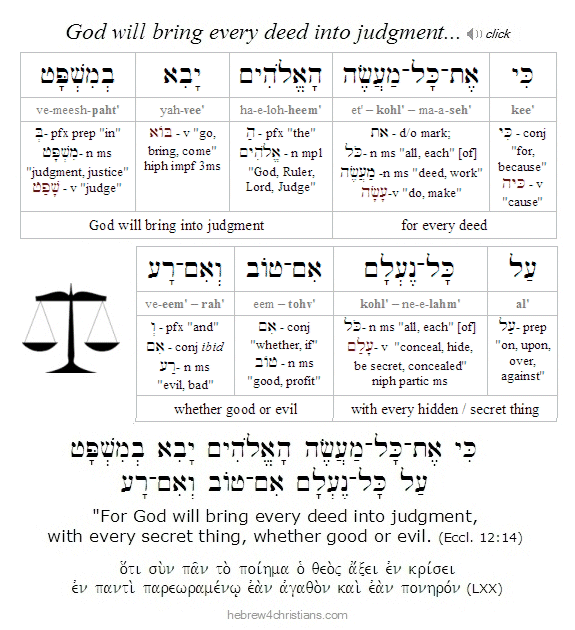 |
Prelude to the Desert:
Overview of the Torah...

05.28.25 (Sivan 1, 5785) The following provides a brief overview of the Torah as a contextual "prelude" to our study of the Book of Numbers... I hope you will find it helpful, chaverim.
The Book of Genesis...
The Book of Genesis (i.e., Sefer Bereshit [סֵפֶר בְּרֵאשִׁית]) describes the creation of the world, the transgression of Adam and Eve, the promise of the coming Savior, and the subsequent lapse of the human race into godlessness and depravity. The wicked generations of Cain caused the world to be entirely steeped in anarchy and bloodlust, so that "every intention of the thoughts of man's heart was only evil continually." After ten generations, the LORD "had enough" and destroyed the human race by means of the great flood. Only Noah and his immediate family were spared. Noah had three sons, of whom God chose Shem to be the high priest of the remnant of the human race. From Shem's line would ultimately come Abraham, the father of the Jewish people. Of course Abraham had a son named Isaac, and Isaac later had a son named Jacob. From Jacob (who was renamed "Israel") were born twelve sons, each of whom became patriarchs of the twelve tribes of Israel. Jacob's treasured son Joseph, however, was sold into slavery by his envious brothers, but later God promoted him to great power in the land of Egypt. The Book of Genesis ends with Joseph's dramatic reconciliation with his family, who then emigrated to Egypt to escape a devastating famine in the land of Canaan. Before his death, Jacob blessed his sons and confirmed the coming of the Savior through the tribe of Judah.
The Book of Exodus...
The Book of Exodus (i.e., Sefer Shemot [סֵפֶר שְׁמוֹת]) describes how the family of Jacob (i.e., the twelve tribes of Israel) multiplied into a great nation while dwelling in the land Egypt. Eventually, however, the Egyptians came to regard these "outsiders" as a political threat and convinced the Pharaoh to enslave and to grievously oppress them. The book describes how God intervened on behalf of Israel and chose Moses (and Aaron) to confront the Pharaoh and to demand that the Israelites be set free. Pharaoh refused Moses' repeated appeals, however, despite plagues of warning visited upon the Egyptians. As a final act of judgment, God instituted the Passover and killed all the firstborn sons of the land of Egypt. Moses and the Israelites then fled from Egypt, crossing the Red Sea into the Midian desert as directed by the Pillar of Cloud and Fire. When the people finally convened at Mount Sinai 49 days later, they received the Ten Commandments, and Moses was called up the mountain to receive the vision of the Tabernacle. While Moses was on the mountain, however, the Israelites forged a Golden Calf and worshipped it, and God threatened to destroy the people. Moses successfully interceded on their behalf, however, and after a period of national teshuvah (repentance), the covenant was renewed. The remainder of the book describes the architectural details and the construction of the Tabernacle, which was finally assembled and consecrated a year after the Exodus from Egypt (i.e., on Nisan 1). The Book of Exodus ends with the Glory of the LORD filling the newly built sanctuary: "For the cloud of the LORD was on the Tabernacle by day, and fire was in it by night, in the sight of all the house of Israel throughout all their journeys."
The Book of Leviticus...
Moses' brother Aaron had been selected to be the first High Priest of the Jewish people, and Aaron's sons were designated as Israel's priests. Since the Tabernacle was intended to symbolize God's Presence among the people, Moses undoubtedly instructed Aaron and his sons (along with the other Levites) about their forthcoming responsibilities. The Book of Leviticus (i.e., Sefer Vayikra [סֵפֶר וַיִּקְרָא]) is therefore called Torat Kohanim - the Law of the Priests - since it deals largely with the service of the priests in the Tabernacle (the book was probably originally written during the six months when the Tabernacle and its furnishings were being made). The laws of sacrificial offerings are therefore detailed, as well dietary laws, laws regarding purity and impurity, and specific rituals for purifying the sanctuary. Throughout the book the holiness of God is stressed, with the corresponding duty for the priests and the people to be holy themselves. Apart from the narrative concerning the days of the Tabernacle's consecration (i.e., the death of Aaron's sons), the book itself is "timeless," with an emphasis on the need for blood atonement and sacrificial rituals to draw near to God. The Book ends with a list of blessings for obedience and curses for disobedience to God's law.
The Book of Numbers...
Although it appears after the Book of Leviticus in the Torah scroll, the Book of Numbers (i.e., Sefer Bemidbar [סֵפֶר בְּמִדְבַּר]) picks up precisely where the Book of Exodus left off, with the Glory of the LORD hovering over Tabernacle as the Israelites camped at Sinai. The book opens: "The LORD spoke to Moses in the desert of Sinai, in the tent of meeting, on the first day of the second month, in the second year after they had come out of the land of Egypt, saying, take a census of all the congregation of the people of Israel, by clans, by fathers' houses, according to the number of names, every male, head by head" (Num. 1:1-2). After the adult men were counted (the result of 603,550 is identical to earlier number in the Book of Exodus (cp. Num. 1:45-46; Exod. 38:26-27)) - the tribes were meticulously arranged into military camp formation around the Tabernacle. It should be noted, however, that the narrative in the book is not presented in entirely chronological order, since later it is stated that Israel celebrated the Passover before this census was taken (cp. Num. 1:1-2; 9:1-5), and the commencement of the journey to the promised land began when the Divine cloud lifted from the Tabernacle and began moving towards the wilderness of Paran (Num. 10:11-12). Besides, very little is told us about the 38 years of wandering in the desert, though certain spiritually significant episodes are described in the text... At any rate, the purpose of the census appears to be military, and only true Israelites were allowed to fight in God's battles (i.e., none of the "mixed multitude" were eligible). However, despite being personally led by the Shekhinah cloud by day and the pillar of fire by night - with the Divine Presence encamping in their midst and protecting them on all sides - the Israelites repeatedly rebelled against the LORD. When the camp of Israel finally drew near to the promised land, the people lapsed in their faith and succumbed to the fears expressed by the faithless spies. This sin led to God's judgment that Israel's entry into the land would be delayed for an additional 38 years, during which time every person 20 years of age and older was fated to die in the wilderness - except for Joshua the son of Nun and Caleb son of Jephunneh, the two faithful spies. Truly it has been said that it was easy for the LORD to take the people out of Egypt, but it was hard for Him to take Egypt out of the people....
Following this tragic judgment, God turned the people back to the desert and restated various laws regarding the Tabernacle. Moses' cousin Korach - joined by other prominent leaders of Israel - then rebelled by challenging God's designated leadership and calling for the people to return to Egypt. After God destroyed the rebels and vindicated the priesthood of Aaron and his sons, the people wandered in the desert for several more years. After further tests and failures of the people - including Moses' own lapse at Kadesh Barnea which led to his banishment from the promised land - the 38 year period of exile finally drew to a close. Another census was taken, and Joshua was commissioned to lead the people into the land. The Book of Numbers ends with the next generation of Israel beginning to conquer the region of Canaan east of the Promised Land.
The Book of Deuteronomy...
The Book of Numbers marks the end of the historical narrative of the Torah, since it briefly describes the Israelites arrival at the end of their journey, the impending death of Moses, and the appointment of Joshua as the new leader of the people (the Book of Deuteronomy (i.e., Sefer Devarim [ספר הדברים]) presents Moses' final sermon before he died). In Jewish tradition, the book is generally not regarded as a book of law, though the sages discover various forms of "case law" in its pages (e.g., the case of the inheritance of the daughters of Zelophehad). Instead, the book functions as a warning of the need to adhere to God's Torah and to exercise faith in His provision for the people. It ends with a note of hope, as the surviving generation begins to take hold of God's promise and enter into the land...
The Grand Narrative of Torah...
On a "macro level," the Torah tells the story of our pilgrimage to Zion, the mountain of the LORD that will one day fill the whole earth.... Genesis describes our creation and fall; Exodus describes our bondage and deliverance; Leviticus describes the walk of holiness; and Numbers describes the test and refinement of our faith (Deuteronomy is "mishneh Torah," the retelling and review of the inner meaning of the first four books).
It has been rightly said that the Book of Numbers displays both the "goodness and the severity of God" (Rom. 11:22). The New Testament cites various acts of rebellion mentioned in the book as "parables" or examples that were recorded so that we might be warned to keep our faith resolute (1 Cor. 10:1-12; Rom. 15:4). The Apostle Paul wrote, "Now these things took place as examples (i.e., τύποι, "types") for us, that we might not desire evil as they did... they were written down for our warning (νουθεσία) on whom the end of the ages has come" (1 Cor. 10:6, 11). Part of the wonder of the Exodus generation is that "the deeds of the fathers are signs for the children" (מַעֲשֵׂה אֲבוֹת סִימָן לַבָּנִים), which means that the stories recorded in the Torah are "immortal" patterns intended to teach us spiritual truth. The faithlessness of the Exodus generation is therefore an eternal warning of failing to genuinely possess the promises of God... As Paul further states in this connection, "Therefore let anyone who thinks that he stands take heed lest he fall" (1 Cor. 10:12). We stand by trusting in the goodness of God and therefore we are warned about the severe consequences of unbelief.
Likewise, the Book of Hebrews warns that "older Exodus generation" was forbidden to enter into God's rest because of their unbelief. "Take care, brothers, lest there be in any of you an evil, unbelieving heart, leading you to fall away from the living God. But exhort one another every day, as long as it is called 'today,' that none of you may be hardened by the deceitfulness of sin. For we have come to share in Messiah, if indeed we hold our original confidence firm to the end. As it is written, 'Today, if you hear his voice, do not harden your hearts as in the rebellion" (Heb. 3:12-15). And again, "Therefore, while the promise of entering his rest still stands, let us fear lest any of you should seem to have failed to reach it. For good news came to us just as to them, but the message they heard did not benefit them, because they were not united by faith with those who listened" (Heb. 4:1-2).
May the Living God (אֵל חַי) give you the grace to truly trust in Him... May He forever keep you; may He guard you from the seduction of unbelief.... May you forever resist the temptation to lose your heart. Walk strong in the LORD and the power of His might!
Hebrew Lesson
Ezekiel 36:26 Hebrew reading:
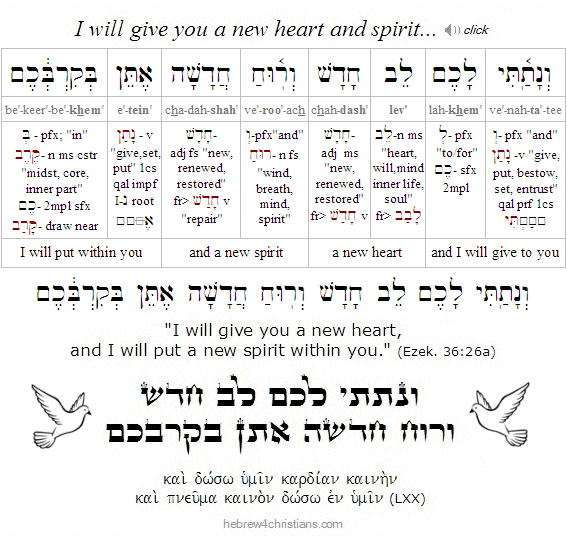 |
Accounted by God...
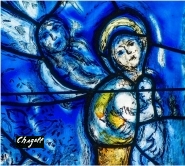
05.28.25 (Sivan 1, 5785) Shalom chaverim. Our Torah reading this week, parashat Bamidbar (פרשת במדבר), is always read just before the holiday of Shavuot (i.e., "Pentecost"), which is the time we celebrate "mattan Torah" (מתן תורה) -- the giving of the Torah of the LORD (first at Mount Sinai, and then later at Mount Zion). The reading begins: "The LORD spoke to Moses in the desert of Sinai... saying 'Lift up the head' (i.e., count) of the children of Israel (Num. 1:1-2).
Central to Sefer Bamidbar, or the Book of Numbers, is the counting of the person, identifying his "place" within the chosen vessel of Israel (Num. 1:52), and therefore the traditional sages link the idea of being counted by God with the giving of the revelation itself. In other words, as we come to know who we are as God's redeemed people, as we learn to reckon ourselves as his beloved, so we will receive Torah and be accounted among his people. Our heads will then be "lifted up," and we will receive the very first blessing of the Torah, namely: אנכי יהוה אלהיך - "I AM the LORD your (singular) God" (Exod. 20:2).
"The LORD spoke to Moses in the desert of Sinai... saying 'Lift up the head' (i.e., count) of the children of Israel (Num. 1:1-2). The Torah commentator Rashi insightfully noted that as we are counted, so we are lifted up and beheld by God. In other words your life matters to heaven, and you are counted worthy because of God's great redeeming love. The sages say that each of us is as a letter of Torah; each of us counts in God's book. Indeed our beloved Savior Yeshua said, "Even the hairs on your head are numbered" (Matt. 10:30).
May you lift up your head and be counted as one of God's own, friend....
Hebrew Lesson
Exodus 20:2 Hebrew reading:
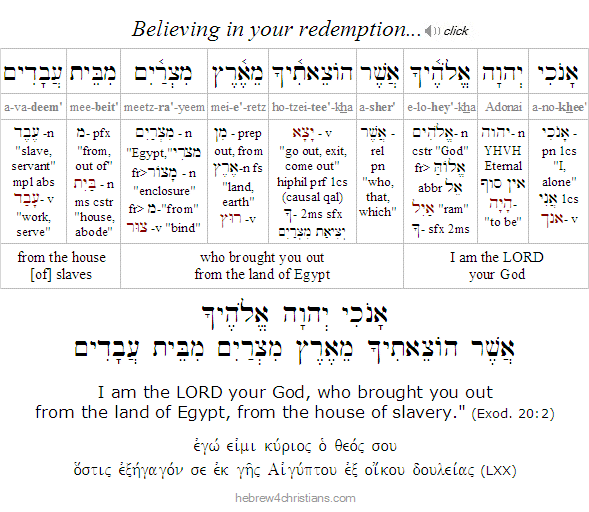 |
Hope against Hope...

05.27.25 (Iyyar 29, 5785) Life isn't easy, and even believers can get angry at God at times. For example, we may feel disappointed or resentful when bad things happen to us or to those whom we love, especially if we had prayed for God's intervention and help regarding the matter. Seemingly unanswered prayer can make us feel lonely and afraid about what is happening to us. We may begin to second-guess whether God really listens to us. We must be careful and ask God for solace and wisdom lest we turn numb inside..
Many of us are unhappy and feel empty throughout the passing of our days. Some waver in their faith, on the one hand affirming that they believe that God is faithful and good, while on the other hand wondering why God apparently left then when they needed him most. They wonder why, if God was not there for them in their most vulnerable moments, can he be trusted to be there for them in future times of trouble?
Some of us can talk a good talk about God and spirituality, but we fail to seriously practice the presence of God, we "forget" that the Lord is real, a "very present help in trouble," and therefore we "collapse back" into the murmur of godless thinking... Ironically enough, many of us are proud and yet hypocritical people. We tend to avoid certain obvious sins but secretly harbor hidden ones like envy, spite, fear, anger, selfishness, lust, gluttony, greed, and a general lack of charity. In short, we don't live up to our ideals or principles, and in our "fallenness" we discover -- if we are honest -- our great need for deliverance from ourselves. It is then that we discover that God has not abandoned us, but on the contrary, we have abandoned Him by turning to anger, hopelessness, despair, and bitterness. Honesty, however, is essential to healing, as Kierkegaard once said: "No person is saved except by grace; but there is one sin that makes grace impossible, and that is dishonesty; and there is one thing God must forever and unconditionally require, and that is honesty."
We must give our secret pain to God, even if we don't understand it, and even if it refuses to go away... Our hearts are often vexed; we are a mess of mixed motives; we are strong to be made weak, weak to be made strong. We bless and curse from the same mouth... And yet, despite all this, despite our inner contradictions, the dance between the "old man" and "new," the divided house of our lives - our present sorrows, our troubles, our fears – we must endure ourselves, we must press on, and we must never let go of hope in God's love. Never. Therefore we must not hide from God's presence, nor pretend to be something we are not. We are invited to come boldly before the throne of God's loving grace to receive help in our hour of need (Heb. 4:16).
"O Lord who alone makes us whole, 'heal me, O LORD, and I shall be healed, save me, and I shall be saved, for your are my praise' (Jer. 17:14). O LORD, forgive our sins and heal us of our wounds, or, at least help us to endure suffering with special grace to keep us from being distracted from the truth and glory of your love and Presence... Grant us strength to abide in your hope, until the very last day, and to keep watch for the ready hand of Your love... As we go from place to place, from this moment to the next, help us to behold the Sun of Righteousness that pervades our way. Amen.
Hebrew Lesson
Jeremiah 17:14 reading (click for audio):
Your heavenly Father "sees in secret," and that also means that he can and will save you from whatever is hidden within you that still resists his love and touch... This is a necessary condition of living faith. We have to trust in God's power to heal us, even when it seems that healing is not forthcoming, even when we still find ourselves divided, troubled, and anxious. We have to believe that God's help is always present for us (Psalm 46:1).
God sees what He does within us, His secret "it-is-finished" work, the effect of His great salvation within our hearts, even if at the present this may be hidden from our eyes... There is appearance, and there is reality; and only God sees what is ultimately real. We have to trust in His promise to be transformed into the divine nature, even if today we find ourselves sinful, needy, and in disrepair... כּל־יְמֵי צְבָאִי אֲיַחֵל עַד־בּוֹא חֲלִיפָתִי - "All the days of my struggle I will keep hope until my change comes" (Job 14:14). So don't give up, friends. We are saved by hope (ἐλπίδι ἐσώθημεν, Rom. 8:24), a hope for you today. Believe to see!
Hebrew Lesson
Job 14:14 reading (click for audio):
The Shepherd's Word...
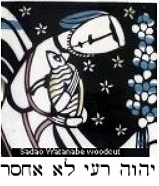
05.27.25 (Iyyar 29, 5785) The sages named the fourth book of the Torah "Bamidbar," meaning "in the desert," because the word occurs in its opening verse, and also because it aptly describes the Israelites' forty years of wanderings in the desert of Sinai after the great Exodus. Because God commanded a census of people to be taken several times in the book, however, the midrash calls it "Sefer Ha'pikudim" (ספר הפקדים), or the "Book of Countings," from which the English translation "the Book of Numbers" is derived. Interestingly, the Hebrew word for desert (i.e., midbar: מִדְבַּר), originally meant "from where the cattle are driven," that is, an area of pasturage that was uninhabited and fit for animal grazing. The Hebrew root "davar" (דבר) means "word" but also means "shepherd," evoking the call and direction of one who would guide his flock.
The book begins: "The Lord spoke (דבר) to Moses in the desert of Sinai, in the Tent of Meeting" (Num. 1:1). Now recall that during their wandering in the desert God's presence was symbolized by the Mishkan, or "Tabernacle," a central tent-like structure that had a secret inner chamber called the Holy of Holies, and within that hidden chamber was a sacred chest called the Ark of the Covenant (ארון הברית) that held the tablets of the Ten Commandments (עשרת הדברים). Upon the cover of the Ark, called the kapporet, were two cherubim (angelic figures), and it was there that God's voice was heard (see Exod. 25:22).
In light of this, among other things we can understand the book of Bamidbar to recount God's shepherding words given to his people as they wandered through desert places in search of the fulfillment of the promise for their lives. The excursion into the desert is part of the journey of faith. God leads us by way of the desert - through struggle and waste places - to discipline our hearts to look for the greater hope of Zion.
Hebrew Lesson
Psalm 23:1-3a reading (click):
Blessings of the Desert...

05.27.25 (Iyyar 29, 5785) Our Torah portion this week (i.e., parashat Bamidbar) begins: "The LORD spoke to Moses in the desert of Sinai, in the tent of meeting (ohel mo'ed), on the first day of the second month, in the second year after they had come out of the land of Egypt" (Num. 1:1). Note again that the LORD spoke "in the desert" (ba-midbar) of Sinai, and that the Hebrew word for "desert" (i.e., midbar: מדבר) shares the same root as "word" (i.e., davar: דבר), which suggests that we hear the Word of God in a place of emptiness, brokenness and ongoing need.
But note further that the LORD spoke in the "tent of meeting" (אהל מועד), which may be read as the tent of "mo'ed" (מוֹעֵד), or "holiday." This suggests that we celebrate our need for God's healing and turn to him in a state of gratitude, even despite our sinful condition (Psalm 119:71). We take courage and draw near, renewed in trust. That is also why the verse says it was "the first day of the second month" (חדש השני בשנה) -- the Hebrew word "month" (chodesh) can be read as "new" (chadash), suggesting it was a time of renewal, a time to celebrate a new beginning (Acts 2:1-4).
When David prayed in his need: "Create in me a clean heart, O God, and renew a right spirit within me" (Psalm 51:10), the Hebrew may be read: "Create in me a pure heart, O God, and renew within me ruach nachon (רוח נכון) - a spirit of "Yes" (כן). As Paul said of Messiah our Healer: "All the promises of God find their 'Yes' in him" (2 Cor. 1:20).
Hebrew Lesson
Psalm 51:10 Hebrew reading:
 |
Getting Ready for Shavuot...
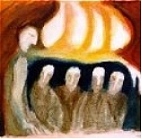
05.25.25 (Iyyar 27, 5785) We have a busy week ahead of us. First we honor Yom Yerushalayim ("Jerusalem Day)" that commemorates the prophetic reunification of Jerusalem and the Israeli control over the Old City. Second, we start reading the fourth book of the Torah, namely Sefer Bamidbar (ספר במדבר), or the "Book of Numbers." Finally, the month of Sivan begins Tuesday, May 27th at sundown, which heralds the conclusion of the 49 day countdown from the day following Passover (see Lev. 23:15-16). The first five days of the month anticipate the day the Torah was given to Israel at Sinai, namely, the sixth of Sivan (i.e., Shavuot), which comes exactly seven weeks (49 days) after the Exodus from Egypt.
In light of this, I hope to share some things related to both the Torah portion for this week, the significance of Jerusalem to us as followers of Yeshua, as well as the holiday of Shavuot (i.e., "Pentecost"), which occurs the following week (i.e., Sunday, June 1st after sundown). May the LORD show us grace as we study his Torah and review its significance as written upon our hearts in the Messiah (Jer. 31:31, Heb. 10:16, Jer. 32:40). Amen.
Upcoming Holiday Dates
- Yom Yerushalayim - Sun. May 25th at sundown (and the following day)
- Chodesh Sivan - Tues. May 27th at sundown (and the following day)
- Shabbat Bamidbar - Fri. May 30th at sundown (and the following Saturday)
- Shavuot ("Weeks, Pentecost") - Sunday June 1st at sundown - Tues. June 3rd
Hebrew Lesson
Psalm 119:15 reading (click):
Parashat Bamidbar...

05.25.25 (Iyyar 27, 5785) Our Torah portion for this week, parashat Bamidbar, is the first reading from the Book of Numbers, and is always read before the great holiday of Shavuot (i.e., "Pentecost"). The portion begins exactly where the Book of Exodus left off, that is, with the glory of the LORD (כְּבוֹד יְהוָה) hovering over the Mishkan (Tabernacle) as the Israelites were camped before Mount Sinai (see Exod. 40:38, Num. 1:1). On the first day of the thirteenth month following the great Exodus from Egypt – exactly thirty days after the Mishkan (Tabernacle) was first consecrated – God commanded Moses to take a census of all Israelite males over 20 years of age who would bear arms. Moses and the heads of each tribe recorded the results, with 603,550 men in all. This number did not include the Levites, however, since they were designated to take care of the Tabernacle during the journeys.
The LORD then gave instructions about how the Israelite camp was to be arranged. The Tabernacle would occupy the central location, with three clans of the Levites surrounding it on the north, south, and west (Moses and Aaron's tents were placed before the entrance on the east). The twelve other tribes were divided into four groups of three. All of the tents of the Israelites were to face the Tabernacle on every side. This camp formation was to be strictly maintained while traveling throughout the desert.
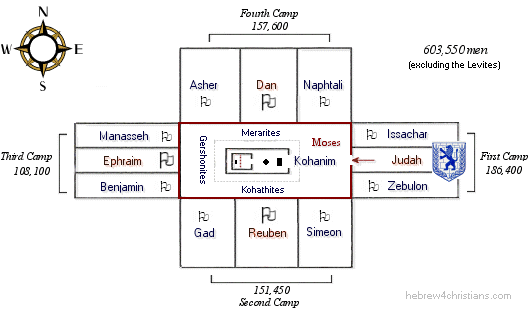 |
Each tribe had its own prince (i.e., nassi: נשׂיא), its own flag (i.e., degel: דגל) whose color corresponded with the color of its respective stone in Aaron's breastplate (Exod. 28:15-21). For example, Judah's stone was a sky-blue carbuncle and therefore the color of his flag was like the color of the sky with a "fiery lion" embroidered upon it (see Gen. 49:9).
The portion ends with a census of the three sons of Levi (בני לוי), namely Gershon (גרשׁון), Kohath (קהת), and Merari (מררי). The sons of Gershon (i.e., the Gershonites) were to maintain the inner tent of the Mishkan and were to be located on the west side of the courtyard; the sons of Kohath (i.e., the Kohathites) were to maintain the furnishings of the Mishkan such (as the Ark of the Covenant, the Menorah, etc.) and were to be located on the south side of the courtyard; and the sons of Merari (i.e., the Merarites) maintained the frames and pillars of the Mishkan and were located to the north of the courtyard. Finally, though the sons of Aaron were technically descendants of Kohath, they were set apart to serve as priests (kohanim) and were located before gate into the Mishkan to the east.
Strangers to this world...

05.23.25 (Iyyar 25, 5785) Our Torah reading for this Shabbat (i.e., Behar) includes two special laws that were intended to radically affect the social, economic, and spiritual well-being of Jews in ancient Israel. The first law was to "release the land" every seventh year, called ha-shemittah (הַשְּׁמִטָּה), which meant that the land would lie fallow by not being seeded or harvested (see Lev. 25:1-6). The shemittah law involved far more than simply refraining from agricultural labor, however, since it implied that everyone was required to forgive all their debtors as well (Deut. 15:1-4). This recurring cycle of "rest and forgiveness" was to be commemorated as an appointed time (מוֹעֵד) when everyone would gather together during the festival of Sukkot to listen to the Torah read aloud (Deut. 31:10-12). God's word was proclaimed from Zion; the land would breath and rest; people's burdens were lifted; and everyone would dwell in booths (sukkot) to recall their temporary status on the way to obtaining an eternal inheritance... No wonder Sukkot was regarded as the most joyous of all of the Torah's holidays!
The second special law was even more joyous. After seven of these seven-year sabbatical cycles (shemittot) had elapsed, the 50th year (called the "Jubilee" year [i.e., shenat ha-Yovel: שְׁנַת הַיּוֹבֵל]) was proclaimed, and all servants would be set free (i.e., "released"), all debts would be forgiven, and the land would be "reset" to its original condition (Lev. 25:8-17). This joyful occasion is called the "Jubilee Release" and signifies the life of redemption (גְּאֻלָּה) for the community of God. It is also called Shemittah LaAdonai: "the LORD's Release" (Deut. 15:2). Just as Shavuot comes after seven cycles of seven days (i.e., the 50th day of Sefirat HaOmer) and therefore represents the perfection of freedom, so the Jubilee Year (Yovel) signals a time of freedom, dignity and equality for all people.
On Yom Kippur of the Year of Jubilee, a great shofar blast (i.e., teruah: תְּרוּעָה) would be sounded throughout all the land to proclaim liberty: "You shall sound the shofar on the tenth day of the seventh month, on the Day of Atonement (וֹם הַכִּפֻּרִים) shall you sound the shofar throughout all your land. And you shall hallow the fiftieth year, and proclaim liberty (דְּרוֹר) throughout all the land to all its inhabitants thereof: it shall be a Jubilee (יוֹבֵל) for you. And you shall return every man to his estate, and you shall return every man to his family" (Lev. 25:8-10). Despite the fact that part of this verse appears on the "Liberty Bell" in Philadelphia, this verse ultimately refers to the coronation of the Mashiach Yeshua as the true liberator of the Jewish people.... Indeed, the word yovel is another word for a ram's horn, or shofar, signifying the coronation of the King...
The observance of shemittah (שְׁמִטָּה) was a real test of faith, since it meant that the Jews had to completely trust that the LORD would provide for them, despite abandoning their usual farming and banking practices. God repeatedly warned the Jews not to oppress one another (Lev. 25:14,17) and explicitly promised His protection and care despite these counterintuitive practices (Lev. 25:18-22). Sadly, the people did not observe the laws of shemittah, and this eventually lead to the 70 year captivity in Babylon, one year in captivity for each year that shemittah was disregarded (2 Chron. 36:20-21).
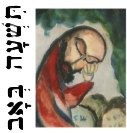
Regarding the laws of Shemittah and Yovel, the LORD states: "The land shall not be sold in perpetuity, for the land is mine, for you are strangers (גֵּרִים) and settlers (תּוֹשָׁבִים) with me" (Lev. 25:23). This is a paradoxical phrase, since a ger is one who is just passing through, like a visitor or tourist, whereas a toshav is one who is a resident, like a settler or citizen. How can someone be both a visitor and a resident of a place, or a stranger and a citizen at the same time? How can one "pass through" a place he is said to dwell?
Concerning this paradox the Maggid of Dubna comments: "If you see yourselves in this world as strangers and remember that you are here only for a short visit, passing through the hallway of this world, then I will settle among you. However, should you see yourselves as settlers on this world, "owners" who are here to stay, then I am but a stranger among you. Either you are the settlers and I the stranger, or you the stranger and I the settler."
Torah describes the people of faith as "gerim ve'toshavim imadi" (גֵרִים וְתוֹשָׁבִים עִמָּדִי), "stranger-settlers" with God in this world (Lev. 25:23). We are "in" but not "of" this realm; we live in the temporal yet are looking for the heavenly city to come (Heb. 11-9-10). Indeed the Eternal dwells among those who are exiles in this world, but to those who lay claim to life in this world God makes himself a stranger. .. As James warned, "Do you not know that friendship with the world is enmity with God? Therefore whoever wishes to be a friend of the world makes himself an enemy of God" (James 4:4). Likewise the Apostle John admonished: "Do not love the world or the things in the world. If anyone loves the world, the love of the Father is not in him... For the world is passing away along with its lusts, but whoever does the will of God shall abide forever" (1 John 2:15,17). Those who walk in faith invariably find themselves gerim v'toshavim, "strange settlers," upon the earth (Heb. 11:13).

Abraham "sojourned" in the land of promise, as in a foreign land, living in tents with his children because he looked for a city whose builder and maker was God (Heb. 11:9-11). Likewise we are strangers and exiles here, on the journey to the reach "the City of Living God, to heavenly Jerusalem, to the assembly of the firstborn who are enrolled in heaven" (Heb. 12:22-23). When we take up the cross and follow Yeshua, we die to this world and its dreams. We die to ourselves in order to find life (Mark 8:35-36). We give up houses, lands, all our possessions, family relationships, and even our own lives in order to find residence with God (Matt. 19:29; Luke 14:26). We reckon ourselves "dead" to this world as our home and "look not to the things that are seen but to the things that are unseen; for the things that are seen are transient, but the things that are unseen are eternal" (2 Cor. 4:18). We walk by faith, not by sight. Faith is the conviction (ἔλεγχος) of things unseen (Heb. 11:1) - and that includes the conviction that God will visibly care for our needs even if we let our gardens go fallow and release our claim on all our debtors...
We must venture out to take hold of the miraculous Presence of God. "According to your faith be it done unto you" (Matt. 9:29). I pray that we do not miss this awesome opportunity to truly share the present exile with God, chaverim, for one day those who are "strangers" with Him shall share His glory.... Meanwhile, we are not without comfort, though we still groan for the great homecoming to come.
Hebrew Lesson
Psalm 39:12 reading (click for audio):
When we are strangers to this world, we reside with God: we are called residents of heaven. To be a stranger to this world is a great blessing, since it means we identify our home in the heart of God. By extension, reality is measured by proximity to the Eternal, and the material world - when regarded as an end in itself - is nothing but an illusion, since it cannot exist apart from the sustaining power of God (Heb. 1:3; Col. 1:16-17; Rev. 4:11). The sages note that in Hebrew there is no language of categorical ownership, since all things are conditioned by time. We say yesh li (יש לי) - "there is to me" (for this time) rather than "I have" or own. Ownership is related to the "bone" (עצם) of something, its inner structure and essence. God alone is koneh shamayim va'aretz (קנה שׁמים וארץ), the Owner of Reality (Gen. 14:19). "For from him and through him and to him are all things. To him be glory forever. Amen" (Rom. 11:36).
Deliverance from Fear...

05.23.25 (Iyyar 25, 5785) Many of us need to grow up and take responsibility for our lives. Often we are full of anger and inner conflict. We rage at life and are quick to blame others, but inwardly we are really afraid, for our "outrage" is just a disguised form of fear. And yet fear itself ultimately arises from unbelief, or rather from the faith that either God doesn't exist or doesn't care for us, and therefore the voice of fear seduces us to feel alone, victimized, insecure and afraid (if you verbalize what you are afraid of, eventually you will hear yourself questioning whether God is in control or whether he is there for you).
Tragically, the more we cling to our fear, believing that it will somehow "protect us," the more we become fearful (and angry) people. To worry is to "practice the absence" of God instead of practicing his presence, and the longer we practice that kind of "faith," the more we will experience exile. We must decide to renounce our fears by trusting in the LORD our God and relying on his promises.
Refuse, therefore, those anxious thoughts that weigh in upon you, creating pressure and "dis-ease" (Psalm 139:23-24). Seek the LORD for deliverance in the midst of your storm. Be still and know that God is real; quiet your heart and listen for the holy whisper: "It is I; do not be afraid..." There is no fear in God's love. As the Spirit says, "In returning and rest you shall be saved; in quietness and in trust shall be your strength" (Isa. 30:15). The truth of God sets you free indeed (John 8:32).
Hebrew Lesson
Psalm 34:4 reading (click):
"The trouble with the world," sighed the teacher, "is that human beings refuse to grow up." "When can a person be said to grow up?" asked a student. "On the day he does not need to be lied to about anything" (Anthony de Mello).
As a Grain of Mustard Seed...
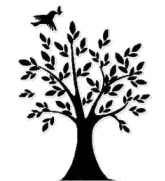
"If you have faith as a mustard seed..." (Matt. 17:20)
05.23.25 (Iyyar 25, 5785) During the Second Temple period it was common to liken a very small amount of something to be a "mustard seed," as for example when Yeshua said: "If you have faith as grain of a mustard seed, you can say to this mountain, "Move from here to there, and it shall move" (Matt. 17:20). Yeshua also likened the transformation of the tiny mustard seed into a large plant to illustrate the how the kingdom of God grows from a minuscule beginning into something prodigious and wonderful: "The kingdom of heaven is like to a grain of mustard seed, which a man took, and sowed in his field, which is the among the smallest of all seeds, but when it is grown it becomes a tree, so that the birds of the air come and lodge in its branches" (Matt. 13:31-32).
Yeshua points to the hidden workings of a tiny seed buried in the earth that would mysteriously bring forth a place of refuge and beauty. The mustard seed is inconspicuous, lowly, and does not produce a mighty tree like the exalted cedar or brawny oak, but it neverthess produces a lovely habitation for life where the birds of the air find refuge and perch among its branches.
Man looks on the outside, but the LORD looks upon the heart (1 Sam. 16:7). Yeshua's parable of the lowly mustard seed was intended to teach that we should consider matters from an eternal perspective. Recall that that the Tabernacle (or "Mishkan") was a relatively small tent-like structure when compared to the grandiose monuments of ancient Egypt, and yet that is where the LORD chose to symbolize his Presence among the people. The world is impressed with proud structures and symbols of temporal power, but God's kingdom is marked by the seemingly small, the overlooked, and the insignificant. Like the hidden light of the menorah in the Tabernacle, the deeds of the humble are beheld inwardly, where the Heavenly Father sees in secret (Matt. 6:4). To the heart of the lowly and trusting Yeshua says: כִּי מַלְכוּת הָאֱלהִים בְּקִרְבְּכֶם / "The Kingdom of God is within you" (Luke 17:21).
As I have mentioned before, there is a "transposition" of values, a "holy irony," in the realm of the Spirit. From God's perspective that which considered great in the eyes of men is considered of little account, and that which is considered insignificant in the eyes of men is considered of great importance (Luke 9:48). The wisdom of this world (i.e., pragmatic, self-promoting egotism, etc.) is regarded as folly before God (1 Cor. 1:20, 3:19). Therefore Yeshua "made himself nothing" and disguised himself in the form of a lowly servant (ἀλλὰ ἑαυτὸν ἐκένωσεν μορφὴν δούλου λαβών).
Like the seed that has to die and be buried in the earth to bear fruit, so we must mortify ourselves in humility (John 12:24). "Whoever wants to save his life will lose it, and whoever will lose his life will save it" (Luke 17:33). Yeshua Himself was crucified in weakness. He did not overcome evil in his own strength but yielded himself to God's providential will. By so doing, his weakness was transformed into the power of the redemption of God (2 Cor. 13:4). To the jaded eye of godless worldliness, Yeshua's death signaled defeat and failure, and yet God's way of doing things is often the very opposite of what we might expect. Again, the LORD chooses the lowly, the inconsequential, and the powerless to overthrow the vanity and variegated delusions spawned from human pride.
This is the basic pattern. God begins small, in hidden ways, and with the most unlikely of people, to do his will. From a carnal perspective Yeshua's disciples were a gaggle of misfits and nobodies, but from God's perspective they represented the miracle of a heart transformed by his power and splendor. God's kingdom is "not of this world," and that means that it will never enjoy the prominence of worldly glory.
The "mustard seed" of faith means that it is not our great faith in God that matters as much God's great power to transform our hearts. We must be careful not to turn faith into a disguised form of works righteousness: Our faith is what it is only by virtue of the greatness and goodness of the Living God who delivers and heals us from our fallen estate.
The life of the seed is a hidden miracle (i.e., nes nistar: נֵס נִסתָר), its death, burial, and regeneration reveal the principles of the kingdom embodied in Lord Yeshua our Savior. Just as the cross of Messiah appears foolish and confounds the eyes of the world, the eye of faith beholds it as the revelation of the power of God. As it is written: "God has chosen the foolish things of the world to confound the wise; and God has chosen the weak things of the world to confound the things which are mighty; and the base things of the world and the things which are despised God has chosen, and the things which are not, to bring to nothing the things that are, that no flesh should glory in His presence" (1 Cor. 1:27-29). Indeed, as the world regards the message of the gospel to be "foolishness," the Lord regards the "wisdom" of the world to be a trap for the proud of heart: For it is written, "He catches the wise in their own craftiness, and the counsel of the cunning comes quickly upon them" (Job 5:13).
The seed of faith represents the divine life of God within the heart (1 Pet. 1:23). And just as the seed works "automatically" to yield its fruit (Mark 4:26), so the Spirit of God produces the fruit of God's Spirit in the life of the believer. This is an unconscious process realized by the grace and mercy of God. "Who despises the day of small things?" the Lord asks (Zech. 4:10). Be still and know that I am the LORD who heals you (Exod. 15:26; Psalm 103:1-3).
God hides that we may seek him. "Behold, the LORD passed by, and a great and strong wind tore into the mountains and broke the rocks in pieces before the LORD, but the LORD was not in the wind; and after the wind an earthquake, but the LORD was not in the earthquake; And after the earthquake there was a fire, but the LORD was not in the fire. And after the fire there was the sound of a still small voice" (1 Kings 19:11-12). The Hebrew phrase for "still small voice" (i.e., kol demamah dakah: קוֹל דְּמָמָה דַקָּה) means "a calm, crushed voice," that is, the voice of the Savior of Israel who surrendered himself as the Promised Seed who would die, be buried, and be raised up to produce the fruit of the Spirit in those who put their trust in Him. Yeshua, indeed, is the "Mustard Seed" of our confession -- seemingly small but when sown within the heart of faith becomes the habitation of the very presence of God...
Hebrew Lesson
Psalm 97:11 Hebrew reading (click):
A Heart of Wisdom...

If you leave everything in God's hands, eventually you will see God's hand in everything....
05.22.25 (Iyyar 24, 5785) Since everything is under God's personal supervision, it is forbidden to regard actions and outcomes as the result of accident, chance, "luck," happenstance, or fate... Those are all pagan ideas, based in ignorance and superstition.
Faith in the true God is grounded in unqualified trust that He is Adonai Ro'einu (יהוה רעִֵנוּ), the LORD our Shepherd, the One who restores your soul, and that conviction provides the framework for apprehending the truth of Torah.
A lost faith regards the events of life as random, based on "fortune," and blind chance; it no longer sees God's hand in the affairs of daily life, but consigns the Divine Presence to a place of functional exile. For this the "like for like" judgment is given: as you regard your life as the product of random forces, so you will be unable to discern God's hand in your daily life.
We trust that "all things work together for good" (Rom. 8:28) and therefore we bless God for perceived evil as well as for perceived good, since all circumstances of life come from the hand of the LORD our God. We believe in an all-powerful, supreme LORD who has not abandoned the world, but who actively sustains and upholds it with benevolent intent.
When difficult things happen to the righteous, we trust in God's personal care for their ultimate good, despite their present troubles. "Though he slay me, I will trust in Him" (Job 13:15). What's perhaps most heroic about Job is that he never turned away from hope, despite the crucifixion of his world. As Kierkegaard said, "The moment the LORD took everything away, he did not say, 'The LORD took away,' but first of all he said, 'The LORD gave..." (Upbuilding Discourses). "Adonai natan..." This is the heart behind Kaddish, the mourner's prayer, that expresses acceptance of God's world, despite pain, sorrow, and loss.
Therefore may God "teach us to number our days aright that we may get a heart of wisdom" (Psalm 90:12). The sages say on the day of death, one considers one's life as if it had been a single day... Life goes by so quickly, and we never know when our personal "Rosh Hashanah" will come. "No one knows the day or hour..." That's why it is so vital to be healed and to turn to God while there is still time.
So turn to him today and bacharta ba'chayim – "choose life!" "For this commandment (of turning to God in faith) is not hidden from you, and it is not far away. It is not in heaven... nor across the sea.... Rather, the matter is very near you – in your mouth and your heart – to do it" (Deut. 30:11-14; Rom. 10:8-13).
Hebrew Lesson
Psalm 90:12 reading (click):
Dangers of Carelessness...

05.22.25 (Iyyar 24, 5785) This week's Torah portion (i.e., Bechukotai) includes the first great "rebuke" (i.e., tochechah: הוכחה) of the community of Israel given in the Scriptures (the second is found in Ki Tavo, i.e., Deut. 28:15-68). In this sober and ominous section, God promises the people great blessing if they would obey Him (Lev. 26:3-13), but He forewarns that exile, persecution and other progressively worse punishments would befall them if they would break faith with Him (Lev. 26:14-46).
The sages note that divine censure would come if the people "forgot" about God or otherwise became careless in their observance of His laws. They point out that the refrain "if you walk contrary to me" (והלכתם עמי בקרי) - which occurs several times during the rebuke - really means "if you walk carelessly (i.e., keri: קרי) with me." Rashi notes that the verb קָרָה means "to befall" or "to happen" and therefore suggests a sense of randomness (the related word mikreh [מִקְרֶה] means "coincidence"). If the people regarded the events of life as "random," God would reciprocate by bringing senseless trouble into their lives...
For this reason the sages regard a careless attitude about God's will as the very first step to inevitable apostasy. In other words, regarding whatever happens in life as mere "coincidence" essentially denies God's Presence (hashgachah pratit), and this attitude will eventually call for God's corrective intervention. People may be "hot or cold" regarding their relationship with Him, but God will never give the option of affecting indifference toward Him... Indeed, God often brings hardship into our lives to regain our attention and cause us to return to Him. As C.S. Lewis once said, "God whispers to us in our pleasures, speaks to us in our conscience, but shouts in our pains: It is His megaphone to rouse a deaf world."
The portion begins, "If you walk in my statutes (i.e., bechukotai: בחקתי) and guard my commandments and you do them..." (Lev. 26:3), which led Rabbi Hanina to ask why the seemingly superfluous phrase, "and you do them" (וַעֲשִׂיתֶם אתָם) was included here. After all, if the people would walk in God's statutes and guard his commandments, wouldn't they necessarily be doing them? He then suggested that the vowels of the word otam ("them") should be vocalized as atem (אַתֶּם), "you," which would then change the sense of the phrase to become, "you shall make (עָשָׂה) yourselves" (i.e., into God's image). The logical corollary of this seems to imply that if you do not walk in God's statutes and guard his commandments, you will disfigure the image of God within you...
Interestingly, God specifically cites the failure to observe the Sabbatical Year (i.e., shemittah), mentioned earlier in parashat Behar, as part of the reason why His judgment would come (see Lev. 26:34-35,43). The observance of the Sabbatical Year, of course, required complete faith that God was in control of all the "happenings" of nature. Like the Sabbath day, the Sabbatical year was designated to proclaim that God is the King of the universe. Those who disregarded this law therefore denied God's rule over nature, and thereby denied the existence of spiritual reality that ultimately governs the physical world...
The Scriptures warn us to "pay more careful attention to what we have heard so that we do not drift away" (Heb. 2:1). We must be anchored to the truth lest we become shipwrecked in our faith. Drifting occurs slowly and almost imperceptibly, though the end result is as deadly as openly turning away from God in outright apostasy. As C.S. Lewis once wrote, "The safest road to hell is the gradual one - the gentle slope, soft underfoot, without sudden turnings, without milestones, without signposts." The devil seeks to lull you to sleep...
Spiritual danger is just as real as physical danger, though most people pretend it isn't because it isn't as easily seen. The danger today is to give up hope, to "go with the flow," to become numb, to drift off asleep, and to die inside... It is far more dangerous to tranquilly ignore God's mercy, or to make a pretense of knowing God's grace, than it is to blatantly break his law. Therefore the urgent need is to remember, to hear, and to awaken the soul to face the truth about reality. We must focus the heart, concentrate the will, and consciously "set" the Lord always before us (Psalm 16:8). Each day we must awaken from our native emptiness to reaffirm the central truth: "Hear, O Israel, the LORD is our God; the LORD is one; and you shall love the LORD your God with all your heart and with all your soul and with all your might" (Deut. 6:4-5). As the Apostle Paul said, "Awake, you who sleep, Arise from the dead, And Messiah will give you light" (Eph. 5:14).
Therefore we must be vigilant to secure our high calling in Messiah: "Let us know; let us press on (i.e., נִרְדְּפָה, "pursue after") to know the LORD; His going out is sure as the dawn; He will come to us as the showers, as the spring rains that water the earth" (Hosea 6:3). The day is drawing near, and now - more than ever - we must remain steadfast. May God help you pursue him be'khol levavkha – "with all your heart" – because He has promised, "You will seek me and find me, when you seek me with all your heart" (Jer. 29:13). And may the love of the LORD be upon you, even as you put your hope in him (Psalm 33:22).
Hebrew Lesson
Jeremiah 29:13 Hebrew reading (click):
For more on this subject, see "The Tochechah: Further Thoughts on Bechukotai."
Believing God's Heart...

"When you read God's Word ... continually to say to yourself: 'It is I to whom it is speaking' - this is earnestness, precisely this is earnestness. This is most crucial, as unconditionally the condition if you are to come to see yourself in the mirror." - Kierkegaard
05.21.25 (Iyyar 23, 5785) "Our Lord Jesus oftentimes said, 'This I am. This I am. I am what you love. I am what you enjoy. I am what you serve. I am what you long for. I am what you desire. I am what you intend. I am all that is'" (Julian of Norwich). Amen to such beautiful words. And we should attend to stirring of our hearts, our deepest desires, since they ultimately find their end in God. As C.S. Lewis noted, our longing for a love which no experience in this world can fully satisfy is a sign that were made for God's eternal love.
We seek beauty, peace, love, and life, but the Lord says that he is the substance and heart of all these things... The lilies of the field do not toil but are arrayed in God's pleasure and design; the birds do not store up their food in barns but are sustained to take wing in the winds of God's hovering presence. Every hair on our head is numbered; there is not a word on our tongue unheard by your Heavenly Father.
Imagine Yeshua saying the following words directly to you: "I am the bread of life. I am the substance of what satisfies your hunger. I am essential for life. I am the manna that comes down from heaven to feed you and make you forever alive. I give you sustenance and strength; I will give you living water that will be like an oasis for your heart - the Spirit of Life that will comfort you. Blessed are those who hunger and thirst for righteousness, for they shall be satisfied. I alone can satisfy your deepest needs and longings. I am Life itself, the source and blessing of all that is good and worthy and true.
I am the light of the world. I give to you the light of life. My presence will guide your way. I will turn your darkness into light. In me is the fountain of life; in my light you shall receive light... I will give you a heart to know me. I am the Word of God: the Voice and revelation of the LORD, the Source of all truth. I am the LORD who brings you out of the darkness of your bondage; I am the one who redeems you, the one who atones for you, the one who suffers and dies for you to remove what separates you from God's Presence. I am the Father who receives you with open arms; I sacrifice the fattened calf to celebrate the blessing of your life... I am the LORD your healer; I sanctify you in my love.
I am the gateway to life, the door that opens to the Kingdom of Heaven. I am the way to know the Father's heart; I express the truth of God in who I am; I am the resurrection of God: No one can enter the kingdom apart from me. I am the LORD and there is no Savior apart from me. Do not be afraid: I will hold your right hand; it is I who say to you, "Fear not, I am the one who helps you." I am the Good Shepherd who guards each one of his flock.
I am your way to connect with God. I am the true Vine. Live in me and I will live in you. I will never leave nor forsake you. Draw near to me: lean upon my bosom. I will teach you what love means. Find comfort in my love for you. Then you will be able to love others and glorify the truth of my heart's passion for all people."
Yeshua is the way, the truth, and the love for which our heart cries out. In Him we "live and move and have our being." He is the Alef and Tav, the First and the Last, the Beginning and the End, and the Sacred Center of all that exists. His heart is our "all in all," the fullness of all that will ever mean anything at any time. "I am my beloved's and my beloved is mine; he grazes among the lilies." May we open our hearts and draw near to him today. Amen.
Hebrew Lesson
Jeremiah 31:3 Hebrew reading (click):
Our Lives in His Hand...
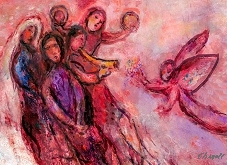
05.21.25 (Iyyar 23, 5785) Do you understand that in God's sovereign design and plan for creation, He breathed out a part of his very heart, soul, and strength to create you in his own "image and likeness," a reflection of his own self-existence and reality? This is the essential blessing that each of us has been given; this is the basis for awe. Rene Descartes' awareness of the inner witness of the soul: "I think therefore I am," echoes the אֶהְיֶה אֲשֶׁר אֶהְיֶה, "I am that I am," within our hearts. The LORD is the "God of the spirits of all flesh" (Num. 16:22) for "in Him we live and move and have our being" (Acts 17:28).
The moments of our lives, the ups and downs of our goings, the length of our days - and especially the purpose and end of our existence - are all in the hands of God, as it says: "In you I put my trust, O LORD; I said, 'You are my God; my times are in your hands" (Psalm 31:14-15). A person may "devise his own way," but it is the LORD that directs his steps.
If we consider our lives apart from God, however, all we see is wretchedness, limitations, shortness of days, and the absurd specter of death at the end of it all. Life always seems too short; the days fly past us like a dream, soon we are "cut off" and gone. When the moment of death occurs, many are lost to its eternal significance...
On the other hand, when we trust that our lives are under God's providential direction, and we realize that our Heavenly Father "numbers the hairs on our head," then we can quiet our hearts and abandon ourselves to his care (Isa. 46:8-10; Psalm 103:19). As it is written: "Those who trust in you know your Name; for you do not forsake those who seek you, O LORD" (Psalm 9:10). And as the Apostle Paul preached to the Athenians, "God, who alone is Creator, the Lord of heaven and earth, has given life and breath to all people, and from one man has made every nation of people to live on the earth, having determined prescribed times and the boundaries of their habitations" (Acts 17:24-26).
For the believer there is no greater comfort than to completely trust that the LORD will work "all things together" for our ultimate good (Rom. 8:28). "Whoever lives and believes in me shall never die" (John 11:26). Yet there is a veil. "God has made every thing beautiful in his time, and he has set eternity in people's hearts, so that no one can find out what he has ordained from the beginning to the end" (Eccl. 3:11). So while we know only "in part," as through "a glass darkly," we believe that the LORD goes before us and will always be with us (Deut. 31:8). And one day we shall see him "panim el-panim," face to face (1 Cor. 13:12). "Beloved, now are we the children of God, and it does not yet appear what we shall be: but we know that, when he shall appear, we shall be like him, for we shall see him as He is; and everyone that has this hope in Him is purified, even as he is pure" (1 John 3:2-3).
Χάριτι δὲ θεοῦ εἰμι ὅ εἰμι - "by the grace of God I am what I am" (1 Cor. 15:10). This is a radical axiom that should be foundational to our faith, namely that nothing occurs in our lives apart from God's will for our ultimate blessing. From small matters to big, from the seemingly insignificant to the momentous, from what seems hopelessly undone to the sheer miracle and glory of existence itself -- categorically everything, in every conceivable world, is under the sovereign hand of the One who works all things together for his glory and for our good. Amen. Yeshua "upholds all things" (φέρων τε τὰ πάντα) by the word of his power. "All things were created by him, and for him, and in him all things hold together" (ἐν αὐτῷ συνέστηκεν). Our Lord is the "Magnetic Center" of all reality, its beginning and its end.
How could it be otherwise? For who can overrule the will of God our Creator and the LORD over all? "From eternity to eternity I am God. No one can snatch anyone out of my hand. No one can undo what I have done" (Isa. 41:13). "For the Lord of hosts has planned, and who can frustrate it? And as for His stretched-out hand, who can turn it back?" (Isa. 14:27).
Therefore do not be afraid. "For I know the thoughts that I think toward you, says the LORD, thoughts of peace and not of evil, to give you a future and a hope" (Jer. 29:11). As Yeshua said: "Fear not, little flock; for it is your Father's good pleasure to give you the kingdom" (Luke 12:32). Hallelujah! For the Lord our God, the Almighty, reigns!
Hebrew Lesson
Psalm 9:10 reading with commentary (click):
Note: May 2025 updates continue here.
Follow the site's progress:
Site Updates for 2025
Site Updates for 2024
Site Updates for 2023
Site Updates for 2022
Site Updates for 2021
Site Updates for 2020
Site Updates for 2019
Site Updates for 2018
Site Updates for 2017
Site Updates for 2016
Site Updates for 2015
Site Updates for 2014
Site Updates for 2013
Site Updates for 2012
Site Updates for 2011
Site Updates for 2010
Site Updates for 2009
Site Updates for 2008
Site Updates for 2007
Site Updates for 2006
Site Updates for 2005
Site Updates for 2004
Hebrew4Christians Forum
|



















































